Image of the Month
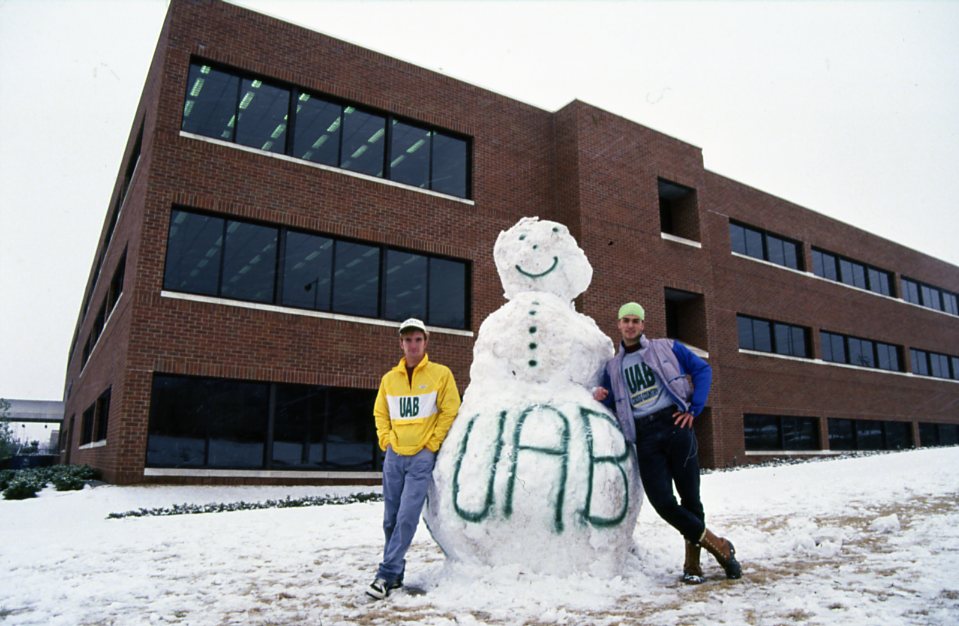
Students in the snow, 1992
Students in the snow, 1992
Following a rare snowfall in Birmingham in 1992, UAB students built a large snowman outside of the Mervyn Sterne Library. They made sure his school affiliation was easy to see.
Image ID: P7.3.13, 3.9
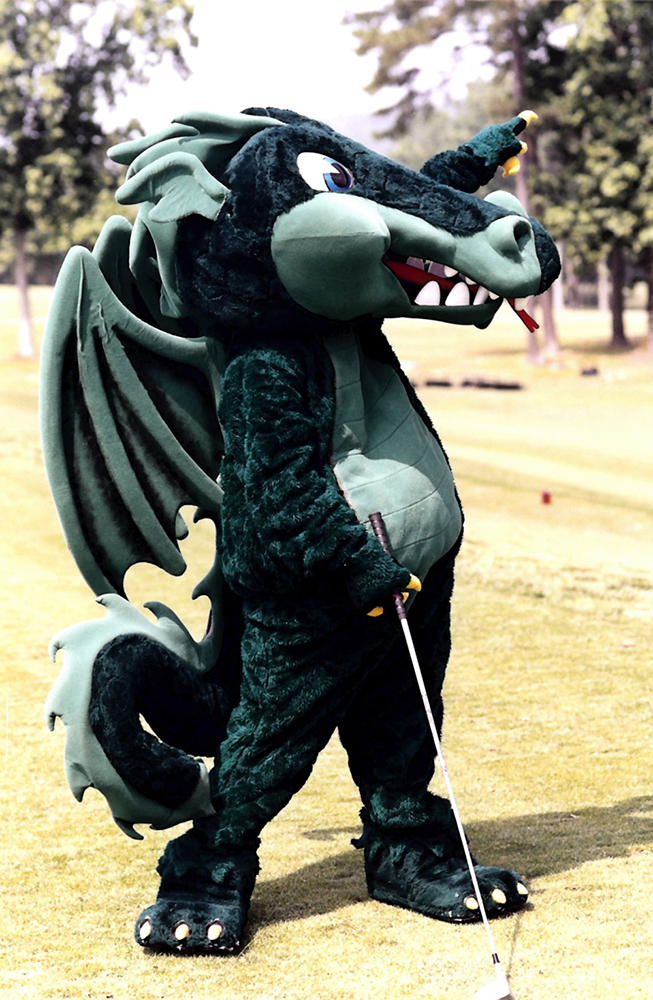
Blaze examines the fairway, 1997
Blaze examines the fairway, 1997
In the fall of 1995, UAB unveiled the logo for a new university mascot, a green dragon. The costumed dragon debuted to the public on January 6, 1996, at a men's basketball game with student Wyndall Ivey as the first to wear the new costume. The UAB Blazers defeated the favored Tulane Green Wave 71-70 before a crowd of more than 6,000. A campus-wide Name the Dragon contest was held following the debut, and in February the mascot received a name, Blaze. The student who submitted the winning name received a free trip to New Orleans for the UAB basketball game at Tulane.
Image ID: P7.3.13, #0147
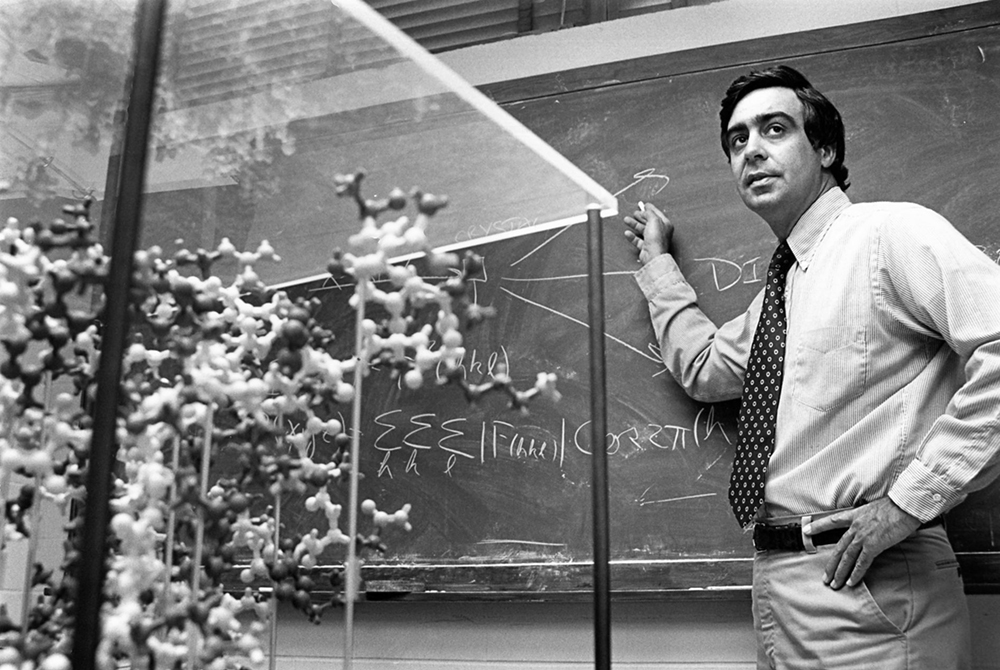
Dr. Charles Bugg in his research laboratory, circa 1984
Dr. Charles Bugg in his research laboratory, circa 1984
The UAB Center for Macromolecular Crystallography was approved by the University of Alabama System Board of Trustees on December 5, 1985, with Dr. Charles E. Bugg (Biochemistry) as inaugural director. The Center initially focused on protein crystal growth and drug design based on protein crystal structure. The Center became a designated NASA Research Partnership Center and provided numerous UAB experiments for the research programs of the Space Shuttle and the International Space Station.
Image ID: P7.3.4, #0275
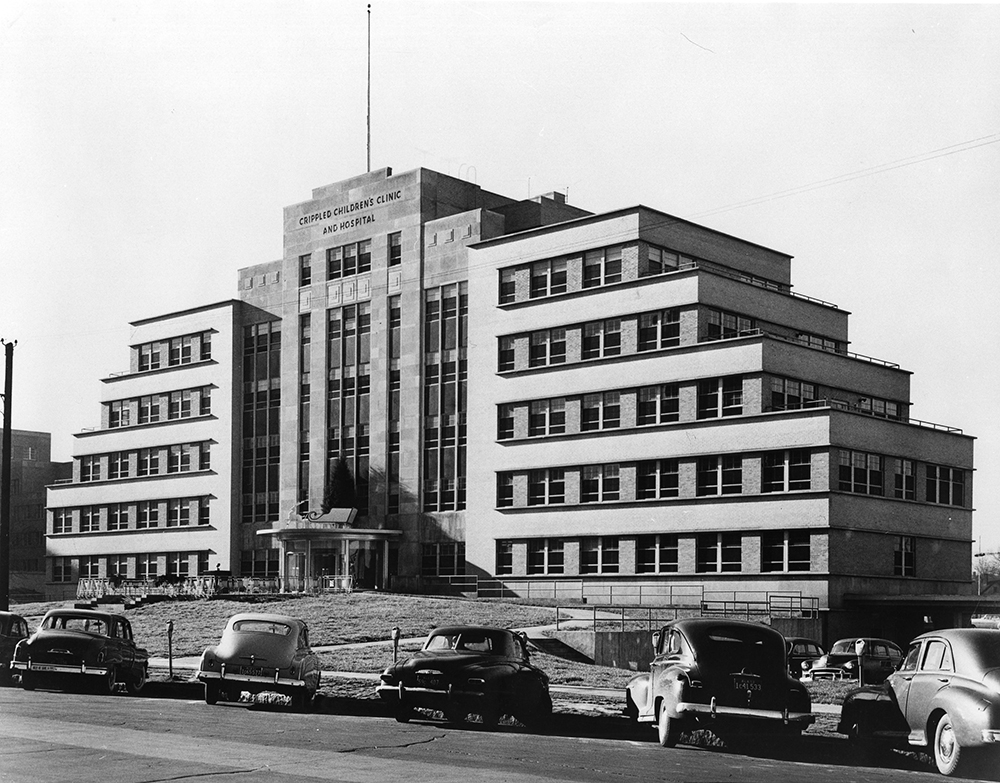
Crippled Children's Clinic and Hospital, circa November 1952
Crippled Children's Clinic and Hospital, circa November 1952
Built within the university medical center by a private foundation, the Crippled Children's Clinic and Hospital was officially dedicated in a ceremony held November 22, 1951. The new facility was located across 19th Street South from University Hospital and was known as the "hospital that football built." Funds were raised at an annual football game held on Thanksgiving Day at Legion Field that featured area high school teams. Following the success of the Salk and Sabin polio vaccines, the need for the hospital was greatly diminished by the late 1960s, and it was eventually closed. UAB acquired the building in 1970 and used it as a temporary home for the new School of Optometry and as the university's Ambulatory Center. The building was demolished by UAB in 1975 for the construction of the Russell Ambulatory Center and the Spain-Wallace addition of University Hospital.
Image ID: P7.2.7, #0263
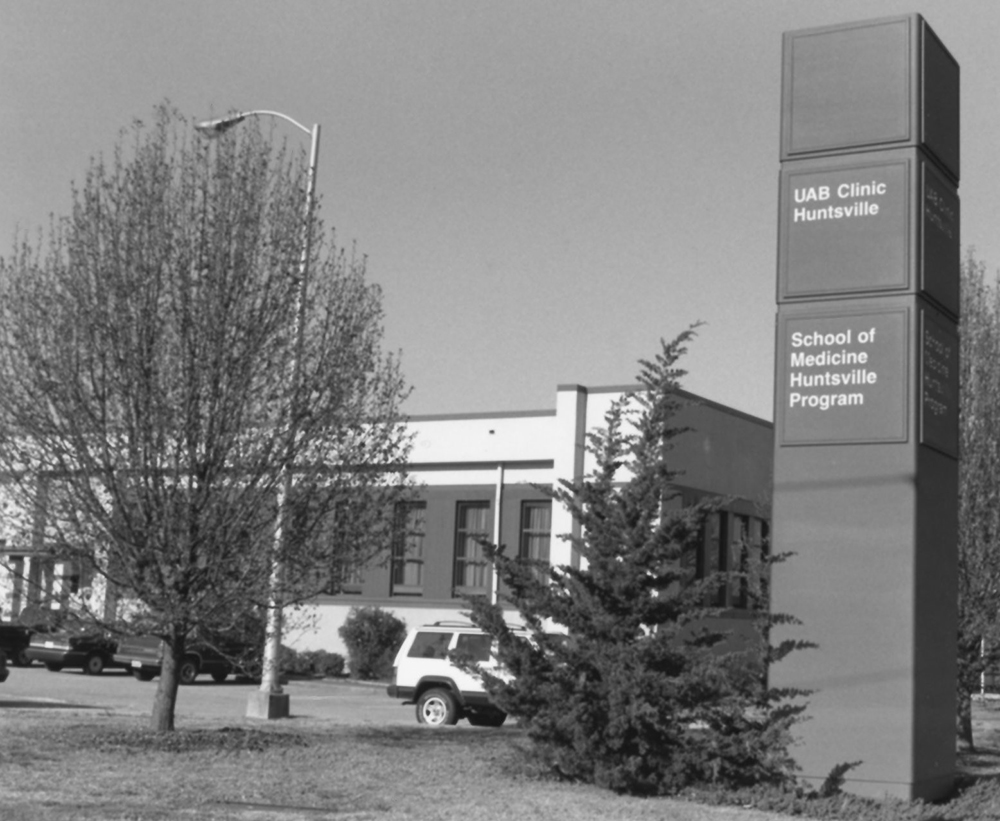
UAB Huntsville Regional Campus, circa 1996
UAB Huntsville Regional Medical Campus, circa 1996
UAB assumed administrative responsibility of the School of Primary Medical Care at the University of Alabama in Huntsville (UAH) on October 1, 1995, and the UAB School of Medicine Huntsville Program was established. The UAH school was founded in 1971 and had long been affiliated with the medical school in Birmingham before its acquisition by UAB and had served as a site of clinical training for medical students since 1974. Today, the UAB Huntsville Regional Medical Campus is one of the four campuses of the UAB Heersink School of Medicine and is under the direction of a regional dean. It is home to Family Medicine and Internal Medicine residency programs and hosts 130 medical students and residents. It is also home of the Sparks Medical Library, a component of the UAB Libraries. A new facility, the primary clinical and academic space for the Huntsville regional campus, was completed in 2003.
Image ID: A2023-09
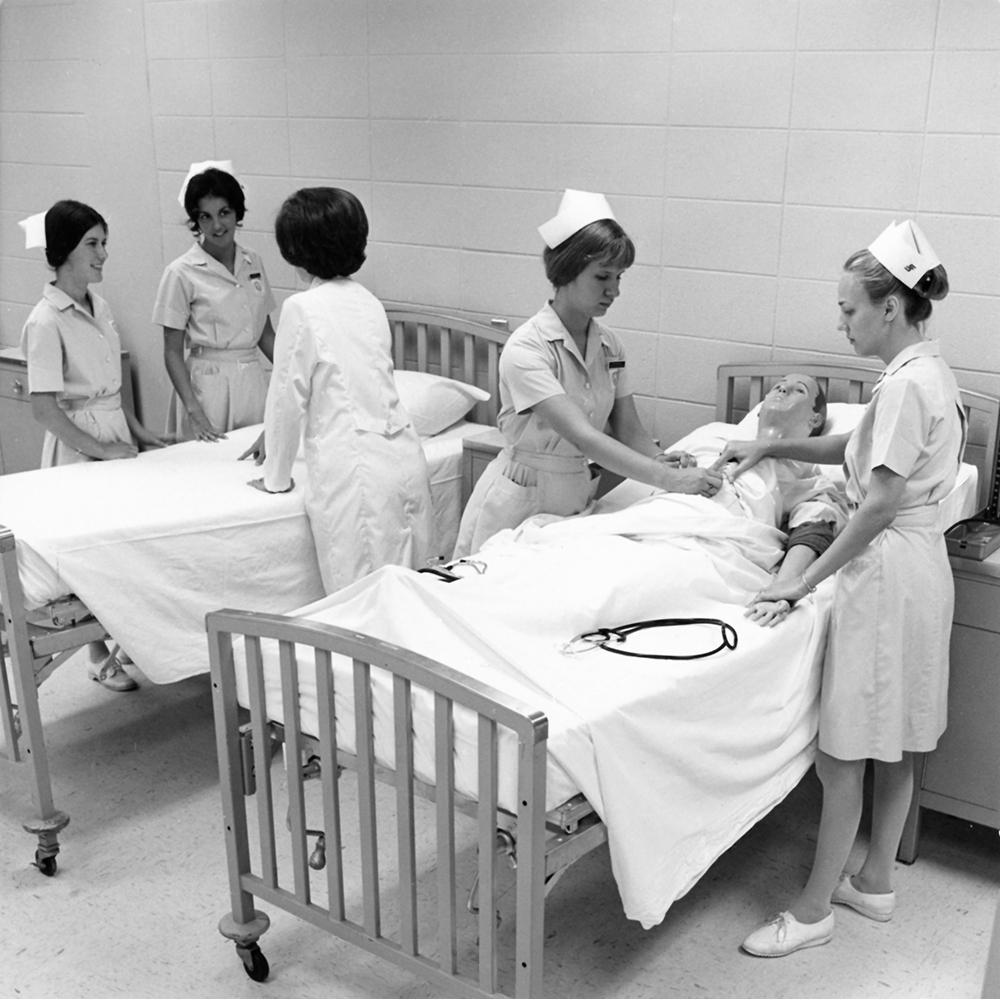
Nursing students in the simulation laboratory, circa 1972
Nursing students in the simulation laboratory, circa 1972
The School of Nursing was established at the University of Alabama and opened in September 1950 with one faculty member (Dean Florence A. Hixson) and 17 students. Although the school was based in Tuscaloosa, after 1953 nursing students were assigned to University Hospital in Birmingham for clinical experience. The school was moved to Birmingham in 1967 where it became one of the schools at the university's medical center. The nursing school has been housed in the same building at UAB since 1971, although there have been several additions and renovations to the original structure. New state-of-the-art simulations labs were included in the building's most recent expansion project, which was completed in 2018. In the school's 75-year history, there have been just five deans of nursing.
.
Image ID: MC51, #0126b
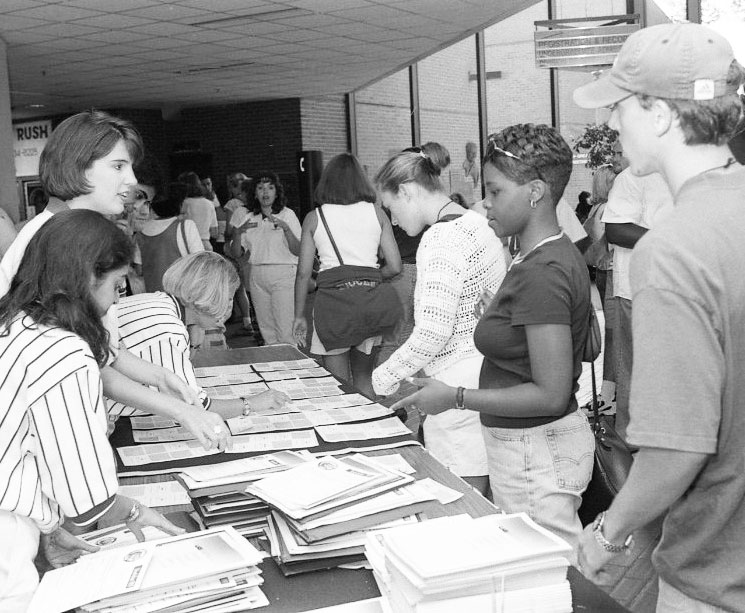
Student orientation, 1997
Student orientation, August 1997
New UAB students receive information packets at the university's student orientation, held in the Hill University Center in August 1997. The freshman class in 1997 totaled 2,220 students. Total UAB enrollment for the fall term was 15,850 students at the undergraduate level through the advanced professional schools.
Image ID: P23.3
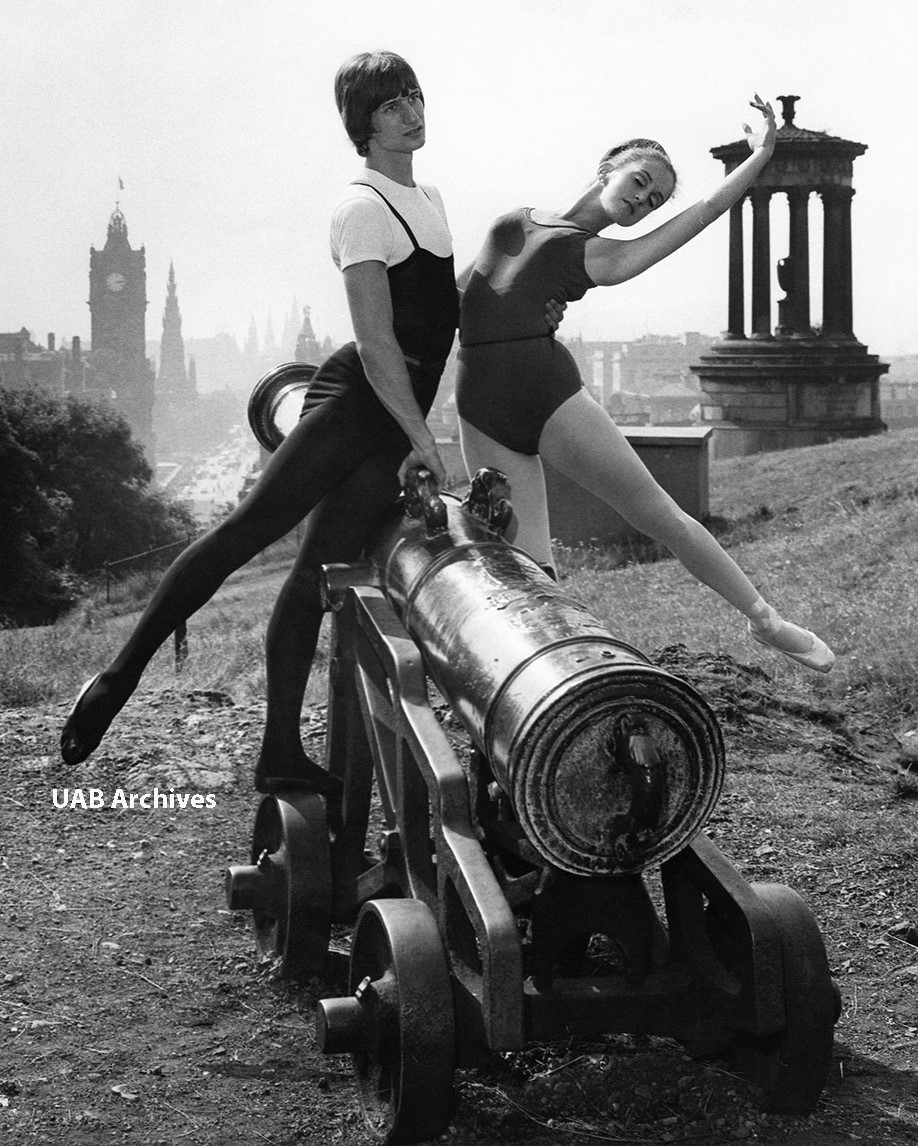
Ballet students in Scotland, 1969
Ballet students in Scotland, 1969
During the summer of 1969, several members of the Alabama Ballet spent the summer dancing and studying in Europe, with visits to Scotland, Italy, and Switzerland. In Scotland, Helen Dexter and Larry Bailey were photographed on Calton Hill with the Dugald Stewart Monument and the city of Edinburgh in the background. At the time of this European tour, the Alabama Ballet was an affiliate of UAB and was under the direction of faculty member James F. Hatcher, founding director of the UAB Town and Gown Theatre.
Image ID: PMC16 #0459
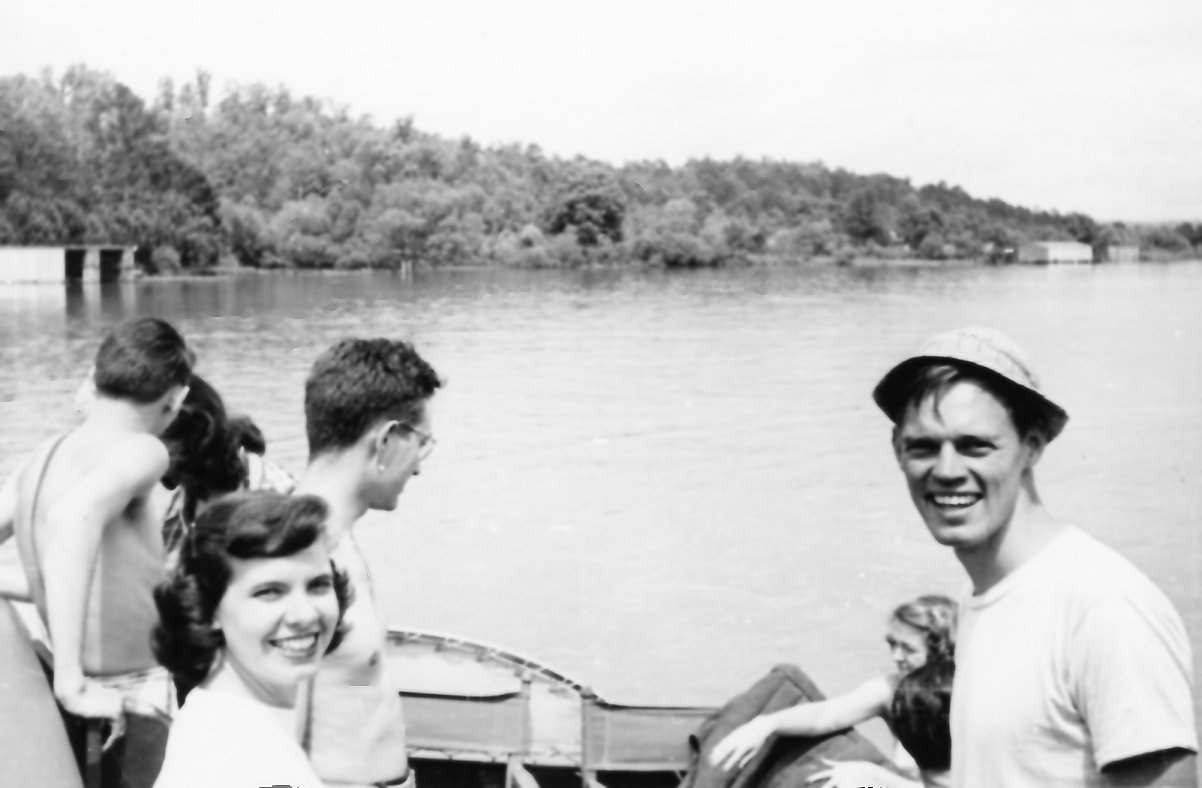
Medical students enjoy a day at the lake, 1949
Medical students enjoy a day at the lake, 1949.
Members of the medical class of 1949 were the first students to spend all four years of study in Birmingham, having begun their educational journey in the fall of 1945. The seniors spent a day on Lake Guntersville just before final exams as the last group outing for the class. On June 3, 1949, 31 medical students graduated; there were 24 male and 7 female graduates. The Tennessee Valley Authority had just created the lake in Marshall and Jackson Counties with the completion of Guntersville Dam in 1939.
Image ID: PMC112, #0064
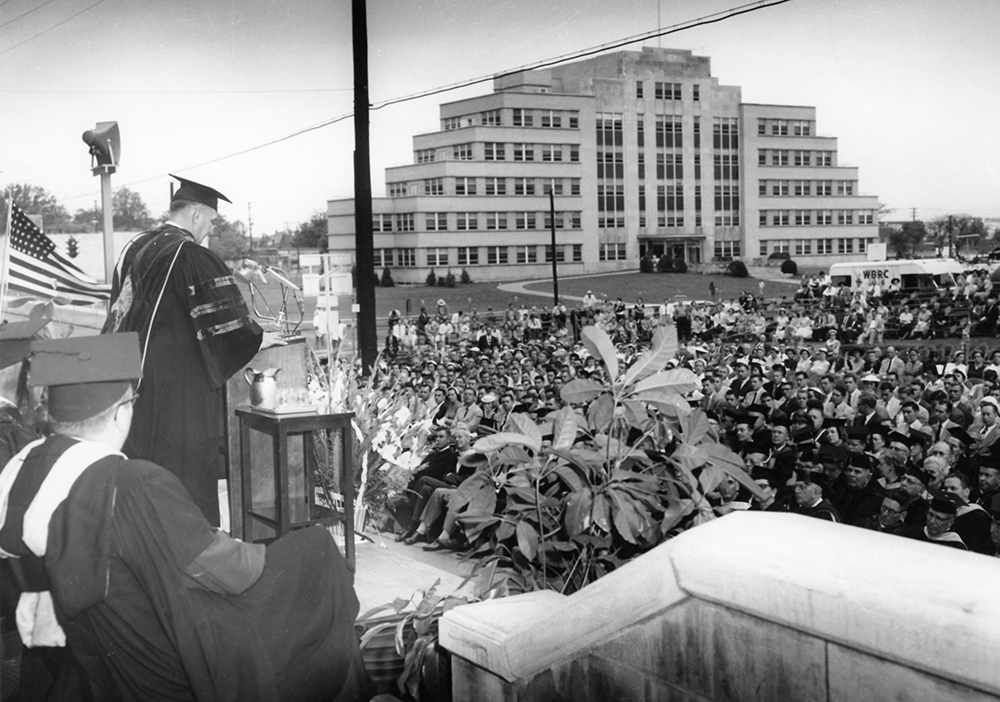
Installation of the university's first vice president, 1955
Installation of the university's first vice president, 1955
In 1955, Dr. Robert C. Berson became the dean of the Birmingham medical school and the inaugural vice president for Health Affairs. He was the first vice president in the 124-year history of the University of Alabama. In honor of the occasion, an installation ceremony was held May 15, 1955, in front of the Medical and Dental Basic Science Building and Dental Clinic [today's School of Dentistry Building], with university administrators from Tuscaloosa, medical center administrators from Birmingham, local and state government officials, and members of the Board of Trustees. Students, staff, and faculty of the university and members of the public, including the news media, were also in attendance. Dr. Berson (at the podium) speaks to the assembled crowd. Berson would remain in Birmingham until 1962. The building in the background was the Crippled Children's Clinic and Hospital.
Image ID: P16.1.1, #1824g
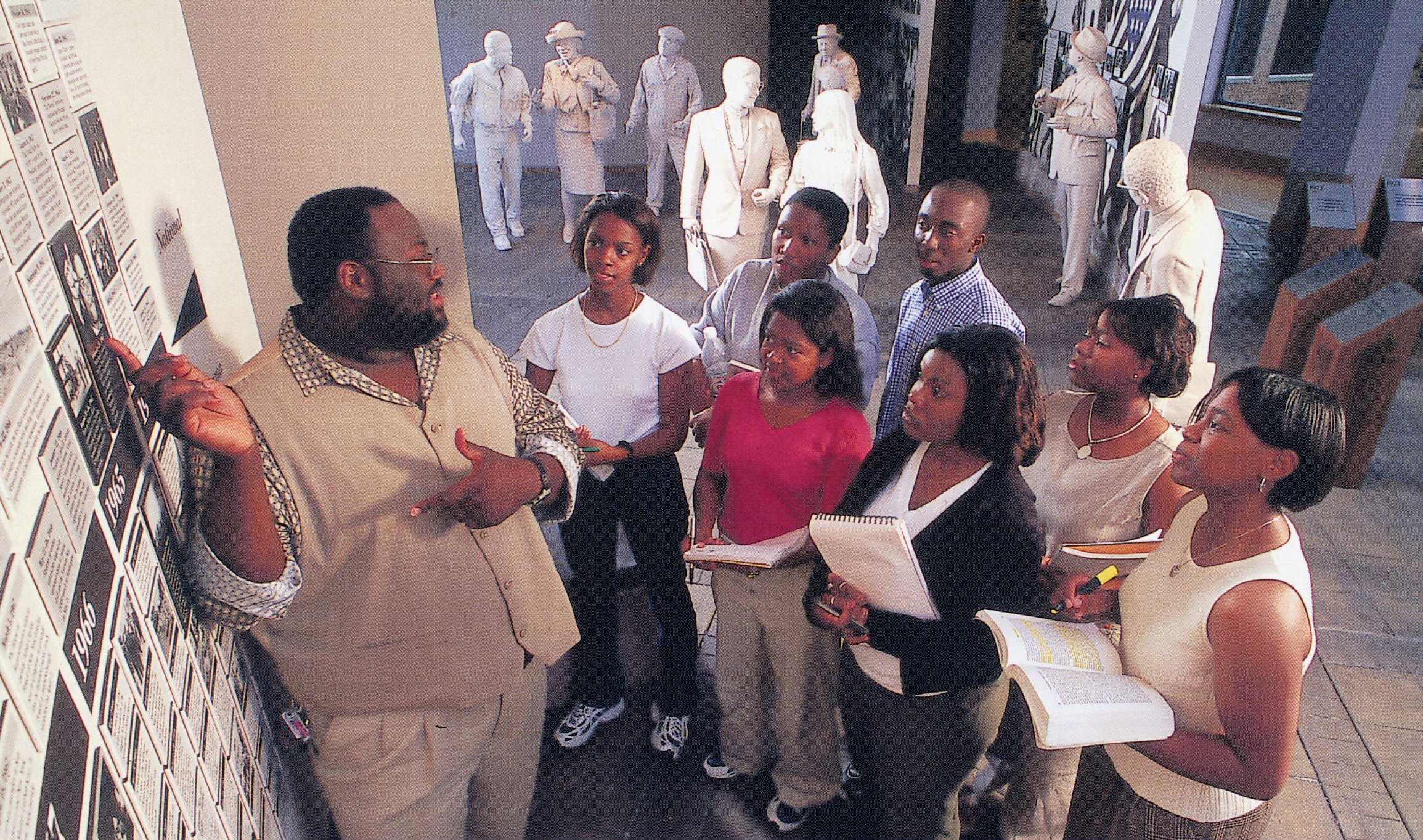
Visiting the Birmingham Civil Rights Institute, circa 2000
Visiting the Birmingham Civil Rights Institute, circa 2000
On April 28, 2000, the Alabama Commission on Higher Education (ACHE) approved UAB's proposal for a major in African American Studies, the first such program in the State of Alabama. Dr. Horace Huntley (History) had in 1979 been the initial director of UAB's interdisciplinary, non-degree program. Approval for the major came after a multi-year planning and implementation process spearheaded by Dr. Virginia Whatley Smith (English), director of the African American Studies Program until 1999, and by Dr. Adeniyi Coker (Theatre) who succeeded Smith as program director in the fall of 1999. The new bachelor's degree in African American Studies would be awarded to the program's first graduate at the June 2001 commencement ceremony. In this photo, Dr. Coker addresses UAB students during an educational visit to the Birmingham Civil Rights Institute.
Image ID: UAB campus publication
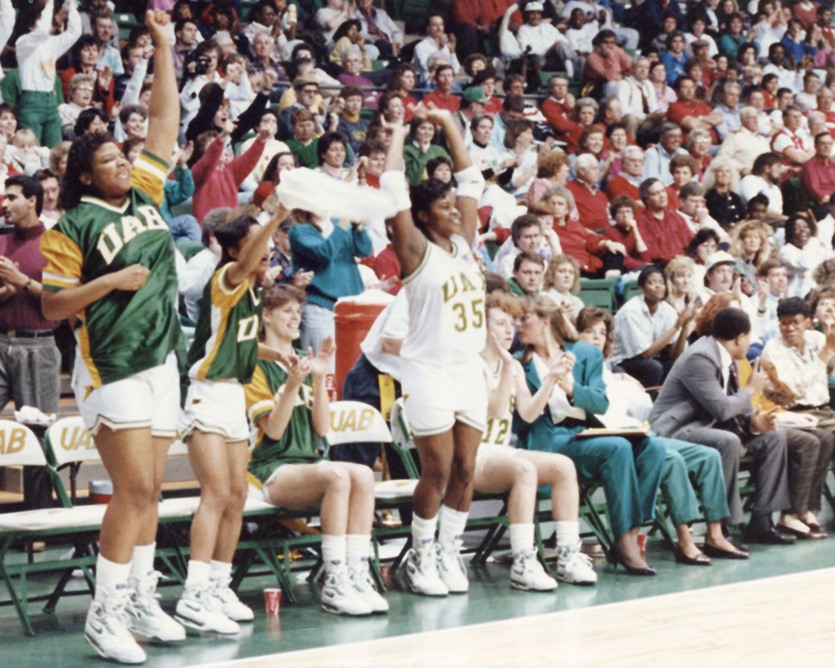
Basketball team celebrates courtside, circa 1991
Basketball team celebrates courtside, circa 1991.
Jacque Nero (#35) and teammates celebrate courtside at a women's basketball game in the UAB Arena [now Bartow Arena]. Nero was a Blazer student-athlete from 1989 until 1992. She became UAB's first-ever women's player to earn the honor of Conference Player of the Year (1991); she repeated in 1992 winning the same award. She holds many records at UAB, ranking third all-time in points scored and fifth all-time in rebounds. Nero was inducted into the UAB Athletics Hall of Fame in 2018.
March traditionally serves as the month for intercollegiate basketball tournaments, both within a conference and in the national NCAA tournament. The UAB Women's Blazers have five regular-season conference championships and one conference tournament championship. The Blazers have played in two NCAA tournaments and appeared in the Sweet Sixteen Round in 2000.
Image ID: P6.1, #2477
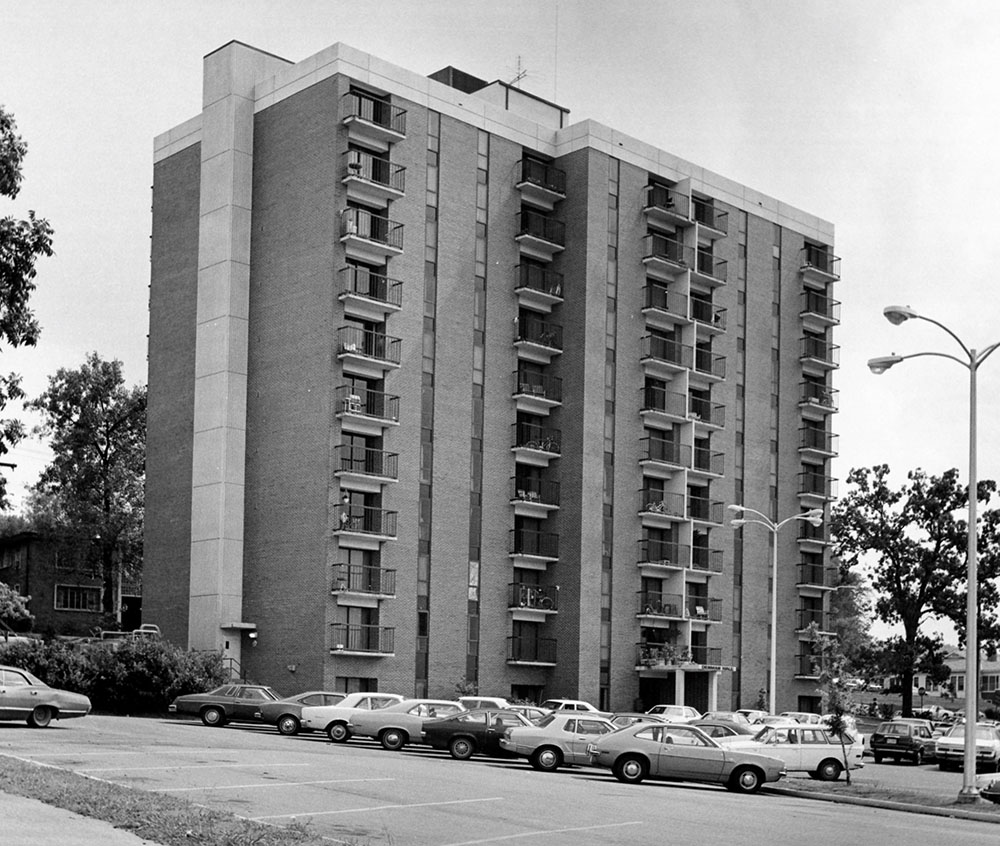
Denman Hall, circa 1975
Denman Hall, circa 1975.
In 1973 construction was completed on a student residence at UAB. The new building provided 100 housing units in efficiencies, one-bedroom units, and three-bedroom suites. In 1975 the residence hall was renamed Denman Hall in honor of Hugh Denman, an executive director of the Housing Authority of the Birmingham District (HABD) and a supporter of UAB. Since the demolition of older facilities in 2002, Denman Hall has been the oldest remaining residence on the UAB campus. Denman was closed before the fall 2024 term and demolition of the building began in January 2025.
Image ID: P8.1.1, #0006
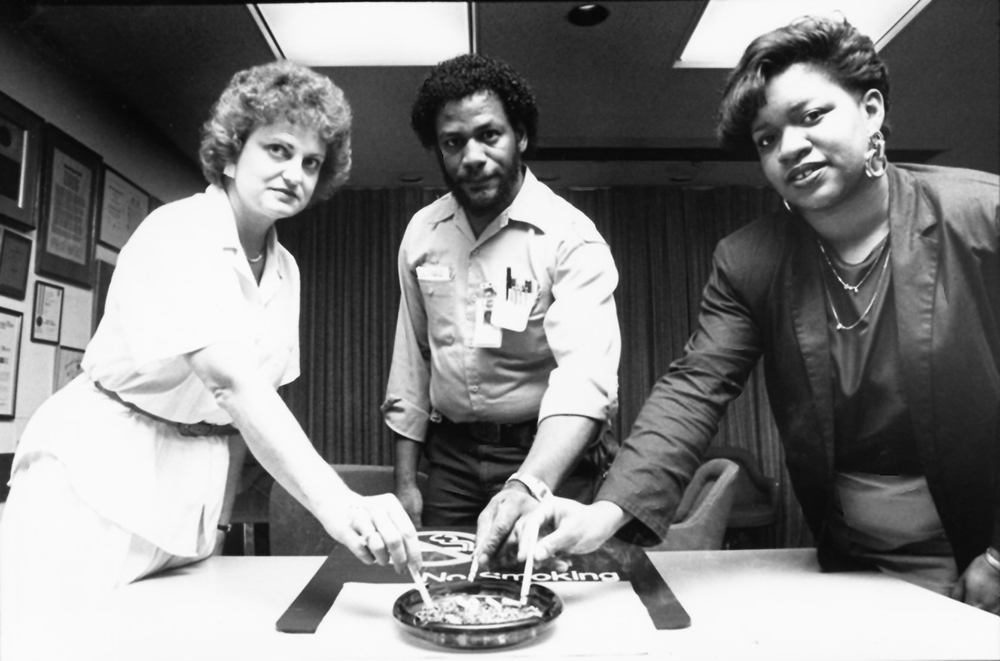
UAB employees mark the declaration of a smoke-free campus, 1990
UAB employees mark the declaration of a smoke-free campus, 1990.
As of January 1, 1990, all buildings, grounds, parking lots, and parking decks across the UAB campus became smoke free. The move to a smokeless campus was a gradual process. In 1987 all indoor public areas within the university's multi-block medical center and hospital had become smoke free.
Image ID: P16.1.11, #0160
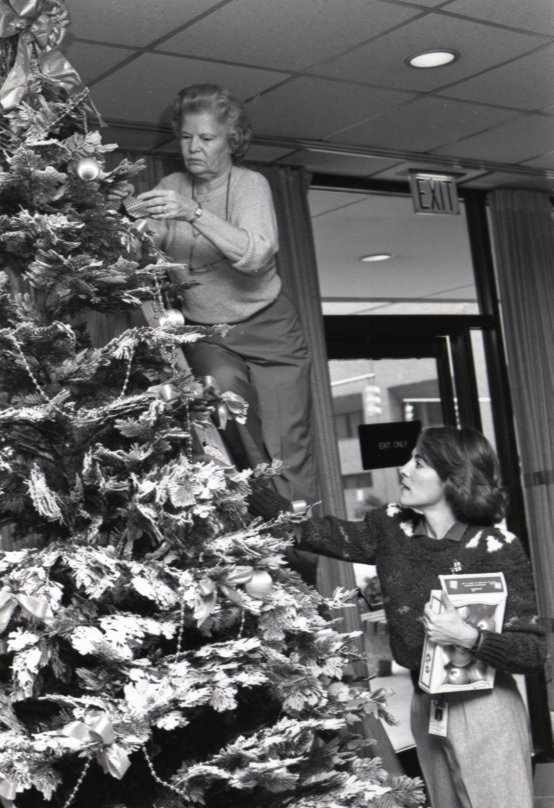
Decorating for the holiday, 1986
Decorating for the holiday, 1986
Volunteers decorate University Hospital for the holiday season. The hospital has a long history of service hours provided by volunteers. The hospital auxiliary was established in 1950 and has remained an integral part of University Hospital.
Image ID: A2004-03P
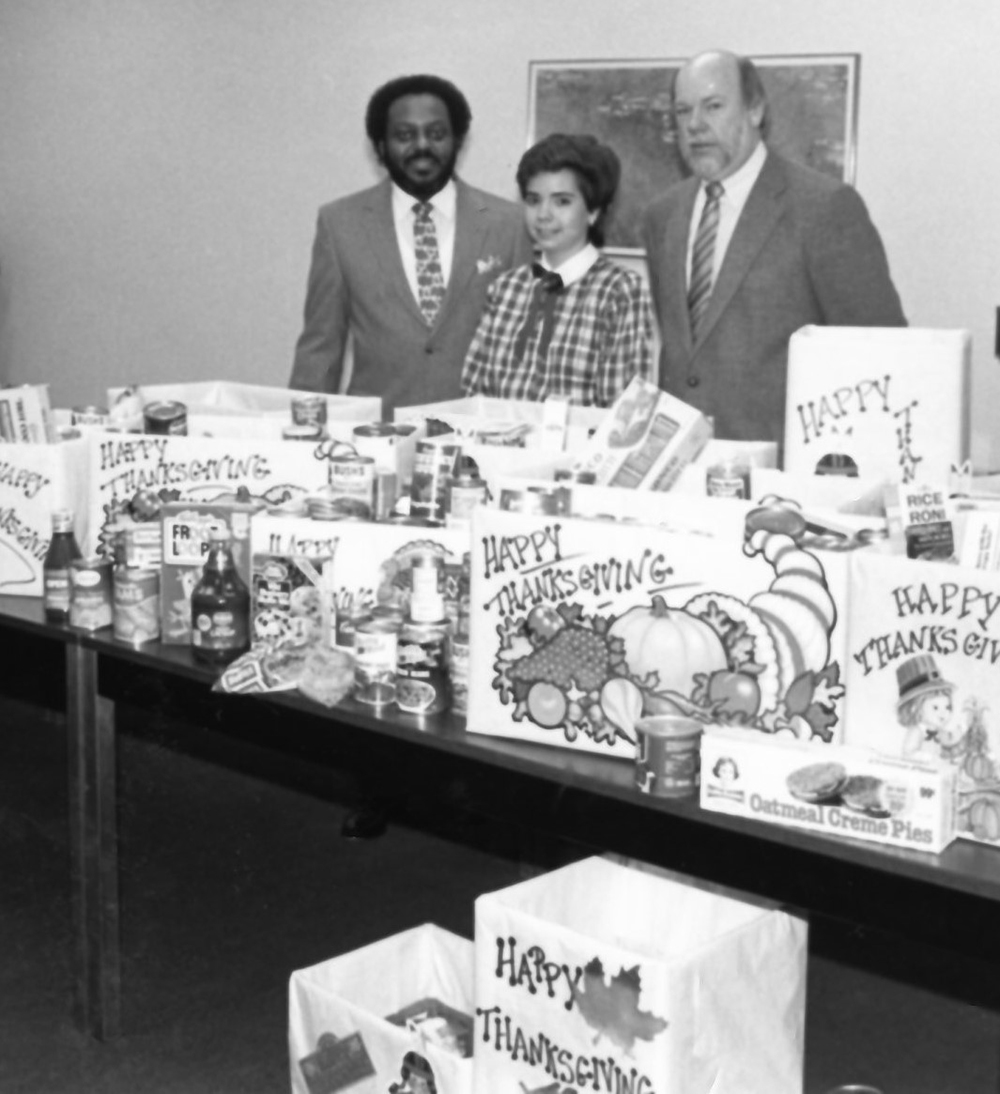
Food collected for Thanksgiving distribution, 1986
Food collected at UAB for Thanksgiving distribution, November 1986
The Student Association of the School of Community and Allied Health [today's School of Health Professions] held a food drive to benefit local charities and to provide food to needy families during the holiday season.
Image ID: P7.4.1, #0267
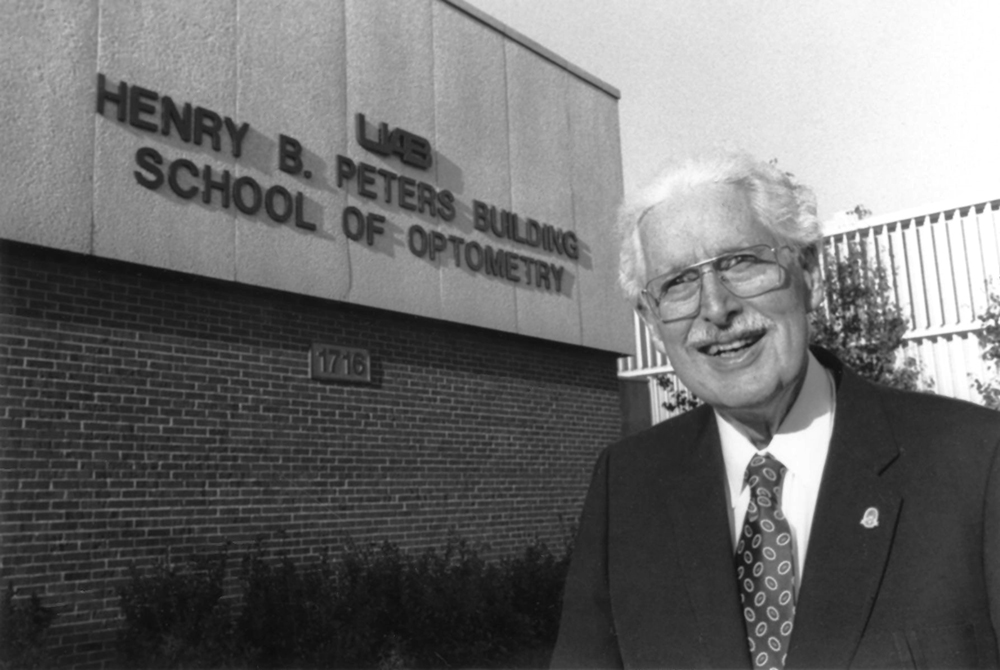
Dedication of the Henry B. Peters Building, 1994
Dedication of the Henry B. Peters Building, 1994
At a dedication ceremony on October 19, 1994, the 19-year-old optometry building was renamed as the Henry B. Peters Building in honor of the school's founding dean. Dr. Peters was recruited to UAB in 1969, and he established the first optometry school in the United States within an academic health center. Dr. Peters stepped down as dean in 1986 and was named professor and dean emeritus. He then served until 1988 as the first executive director of the UAB Research Foundation.
Image ID: PMC104, #0277
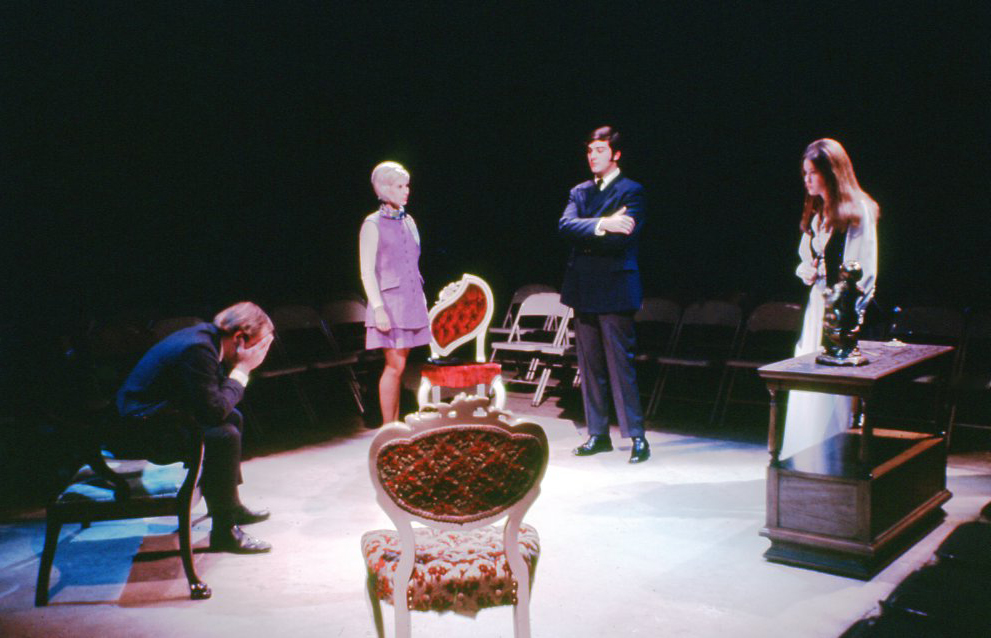
No Exit, the first student theatre production, 1970
No Exit, the first student production, 1970
The first all-student theatre production at UAB was Jean Paul Sartre's No Exit in the fall of 1970. The show was mounted as a theater-in-the-round production on the stage of the university's Clark Memorial Theatre off Highland Avenue. It was directed by faculty member Ward Haarbauer and featured UAB students Jim Hethcox, Rosa Melton, Pat Purcell, and Julie Templin. No Exit predates the establishment of a formal academic department, which was first created in 1973 as the Department of Performing Arts. It became the Department of Theatre and Dance in 1980 and was renamed as the Department of Theatre in 1995. Dr. Haarbauer was the inaugural departmental chair, serving from 1973 until 1981.
UAB Archives announces the opening of a major archival collection from the UAB Department of Theatre. Record Group 50 contains over 1,600 photographs, hundreds of playbills and event programs, and administrative files from the department dated 1970 until the present. Contact the UAB Archives for additional information.
Image ID: P50.2, #0967
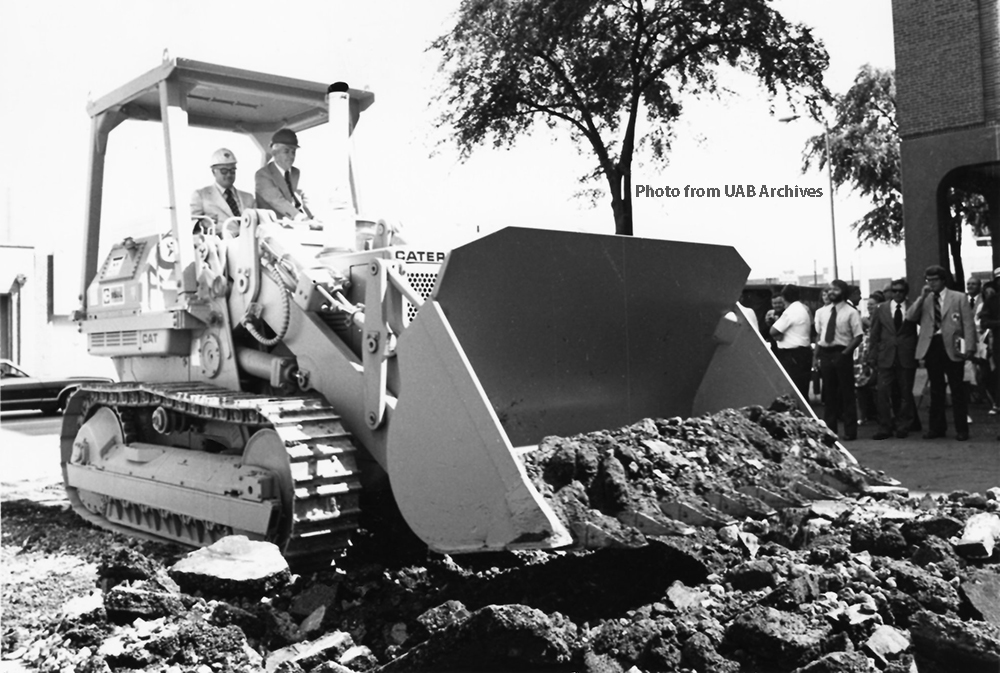
Groundbreaking ceremony for an addition to University Hospital, 1974
Groundbreaking ceremony for an addition to University Hospital, August 1, 1974.
University officials use a backhoe to break ground -- and the concrete of a parking lot and sidewalk -- for a nine-story addition to the hospital complex, the Monday Morning Quarterback Club Tower. UAB's new facility would be named in honor of the local civic organization, the Monday Morning Quarterback Club, which supports children's medical needs through charitable activities and contributions. The club provided funding for the building. "Quarterback Tower" would be opened in July 1977.
Image ID: P7.3.3, #0007
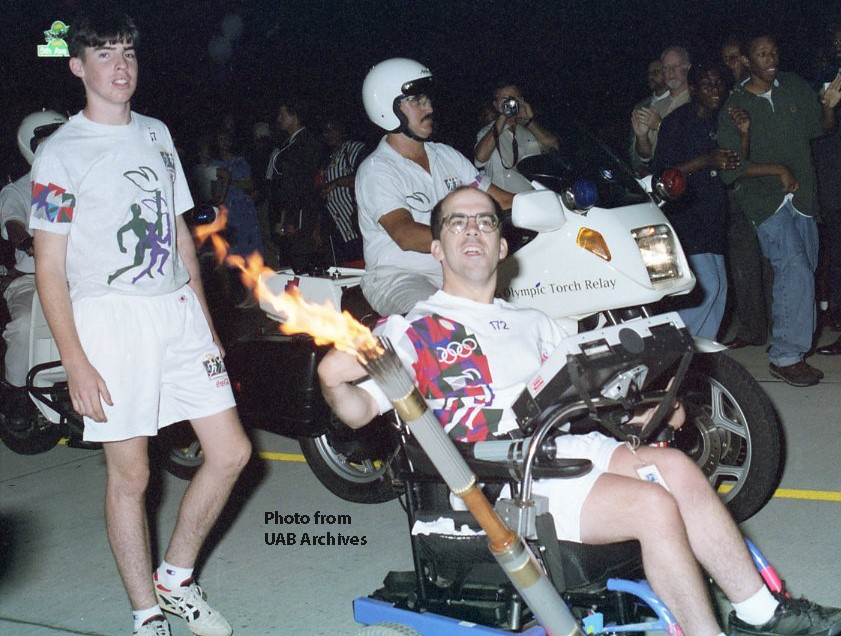
Olympic flame travels through the UAB campus, 1996
Olympic flame travels through the UAB campus, 1996
Gordon Richmond, an administrative associate in the Division of Clinical Immunology and Rheumatology, carries the Olympic Torch as part of the Olympic Torch Relay. Richmond, who was also a graduate student in the School of Public Health, was one of eight UAB community members who carried the torch as it made its way through Birmingham and on to Atlanta, Georgia. The night-time route took the relay team through the UAB campus, south down 14th Street beside the UAB Arena to 11th Avenue and through Five Points, and north on 20th Street past the UAB Administration Building and University Hospital. The City of Birmingham hosted soccer matches in July 1996 at Legion Field as part of the XXVI Summer Olympic Games held in Atlanta, and UAB’s West Field served as the practice field for several national soccer teams, including the US men’s team.
Image ID: P23.1
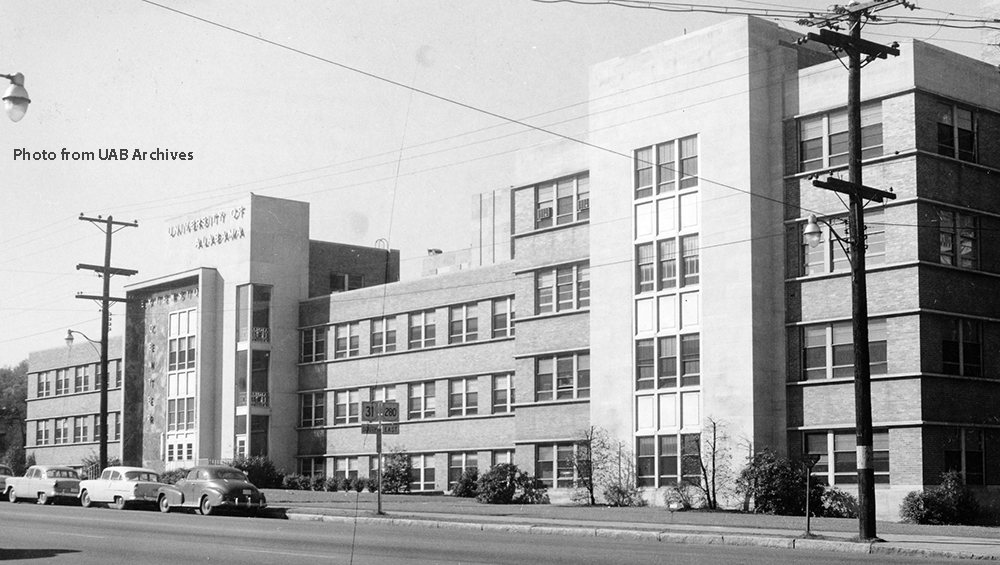
New campus facility opens, June 1954
New campus facility opens, 1954
The Birmingham Extension Center opened June 6, 1954, as the first facility the University of Alabama had constructed anywhere in the state for one of its extension programs. The building was located on 20th Street South at the corner of 7th Avenue and was connected to the university's basic sciences building [today's dental school]. At the time the building was completed, 20th Street also served as Highway 31 and Highway 280 through Birmingham's Southside neighborhood. The new facility housed classrooms, laboratories, administrative offices, the university bookstore, and the university's non-health sciences library. The building would be renamed two years later as Tidwell Hall in honor of extension dean Robert E. Tidwell, and in later decades would serve as the home of the UAB School of Public Health. Tidwell Hall was demolished in 1998 to construct the Kaul Human Genetics Building.
Image ID: P16.1.1, #0311

Anti-war campus protest, 1969
Anti-war campus protest in 1969.
Just after UAB began the fall term of 1969 as a new and independent university, there was an anti-war protest held on campus. UAB students and employees, along with members of the local community, protested US involvement in Vietnam. The Kaleidoscope newspaper reported a couple hundred people attended the protest. Two weeks afterward, a debate on the Vietnam War was held in the auditorium of the Engineering Building [Cudworth Hall] on the evening before a city-wide anti-war rally was held in Birmingham's Kelly Ingram Park.
Image ID: P7.2.7, #2071
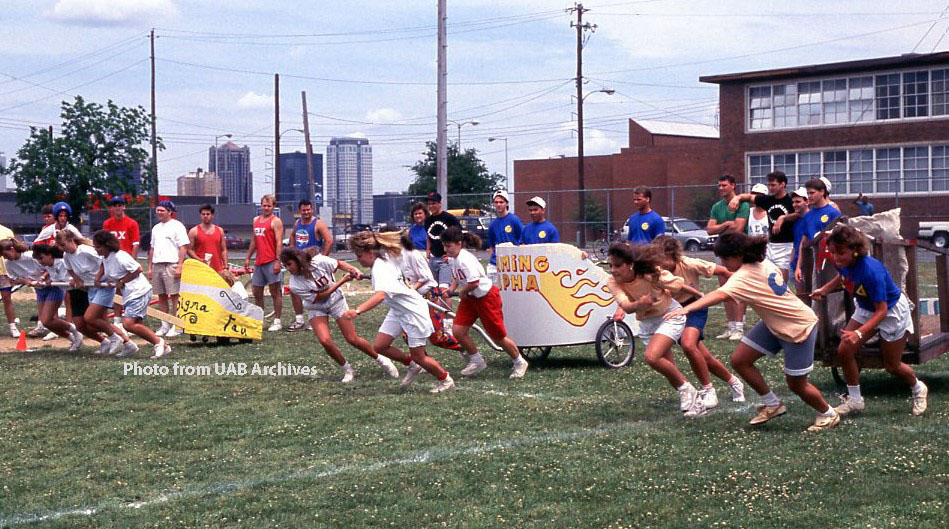
Racing chariots during Greek Week, April 1989
Racing chariots during Greek Week in April 1989.
UAB hosted a Greek Week celebration in 1984. Sponsored by the Interfraternity and Panhellenic Councils, the event was held April 23-29 and included an off-campus party that raised funds for Big Brothers/Big Sisters of Birmingham, a Greek jersey day for the UAB and Auburn baseball game, a study night at the University Center, and a day trip to Gulf Shores. During the celebration of Greek Week in 1989, sororities and fraternities participated in a Greek Games, with competitive events such as tug-of-war and a chariot race.
Image ID: A2007-11P
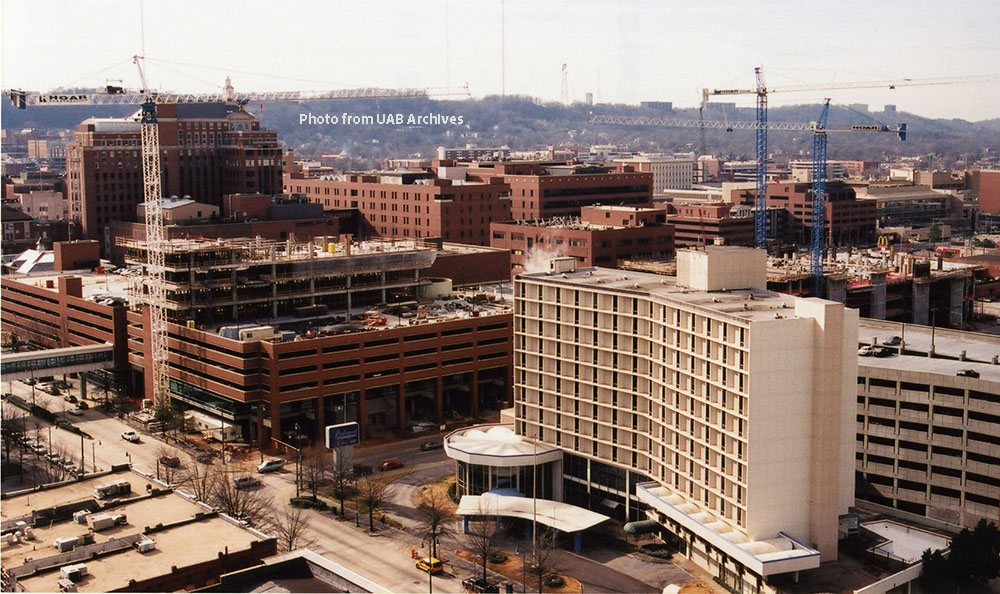
Cranes across campus illustrate continued UAB expansion, 2002
Cranes across campus illustrate continued UAB expansion in 2002.
A crane on 20th Street (left center) marks the construction of the medical school's Faculty Office Tower, which was built on top of the existing parking deck located between 5th and 6th Avenues. The building was completed in 2003 and in 2023 was renamed as the Lyons Harrison Faculty Office Tower. Two other cranes (right background) mark the construction of the North Pavilion addition to the University Hospital complex. The 11-story North Pavilion was completed in 2004 as the largest building ever constructed at UAB. The multi-story white building (lower center) was the Parliament House Hotel, a landmark on Birmingham's Southside neighborhood for decades. The Parliament House was opened in 1963 and was demolished by UAB in 2008 for continued campus expansion.
Image ID: P17.1.28, #0123
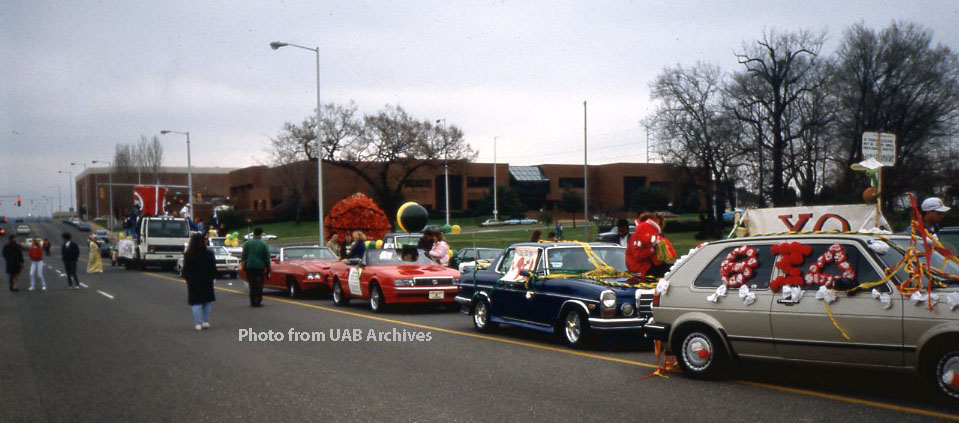
Lining up for UAB's first homecoming parade, 1989
Lining up for UAB's first homecoming parade in 1989.
Homecoming was originally celebrated at UAB as part of the basketball season and was first held in January 1979. Ten years later, on February 4, 1989, the university sponsored the first homecoming parade, which traveled across campus and ended at the new UAB Arena. Homecoming 1989 had the theme of "Catch the Spirit." The women's basketball team defeated Virginia Commonwealth after a pep rally and bonfire held on Thursday. The men's basketball team defeated Old Dominion following the inaugural parade on Saturday afternoon; Blazer sophomore guard Andy Kennedy led the team with 20 points scored.
Image ID: A2018-06P
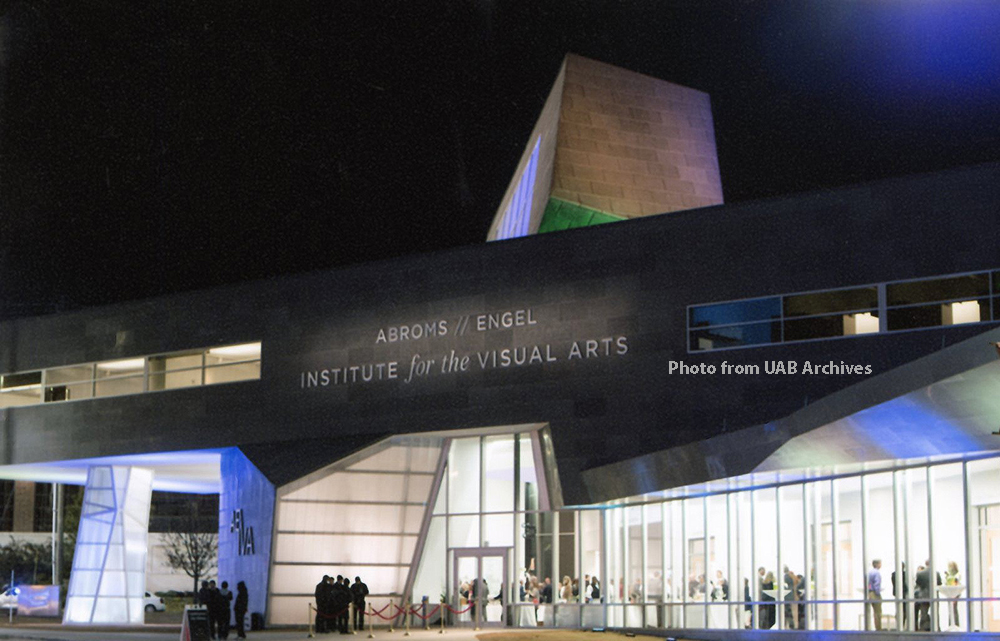
AEIVA opened at UAB, 2014
AEIVA opened at UAB in 2014.
The Abroms-Engel Institute for the Visual Arts (AEIVA) was formally dedicated on January 15, 2014. The striking new facility was the new home for the university’s art galleries, administrative and faculty offices, and the Department of Art and Art History. AEIVA was named in honor of UAB benefactors Marvin and Ruth Engel and Hal and Judy Abroms.
Image ID: A2018-13P
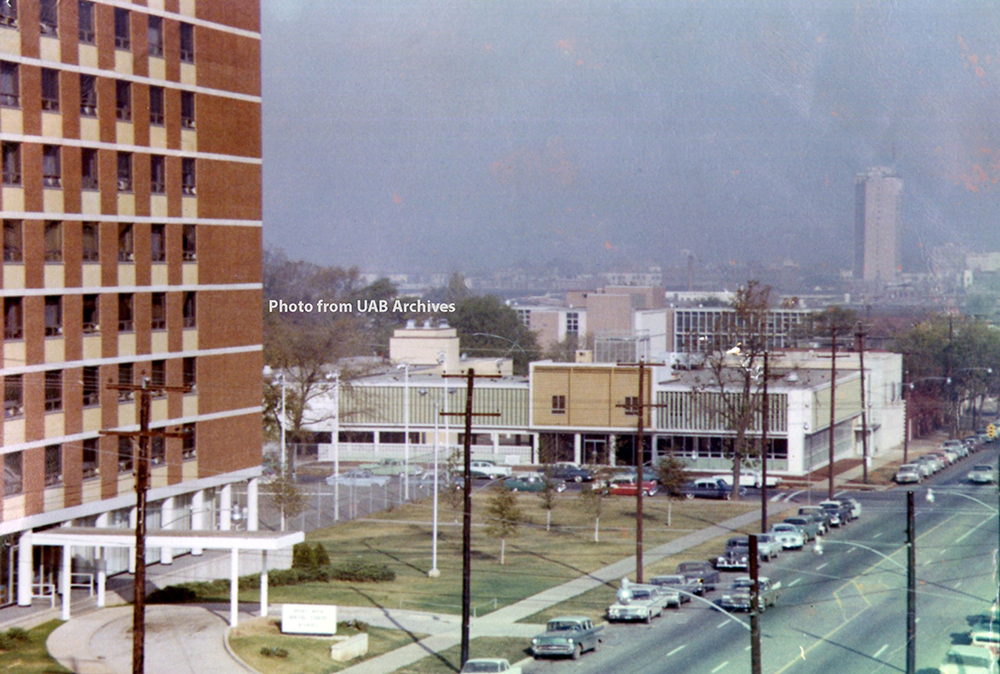
The Eye Foundation Hospital opened for patients, 1963
The Eye Foundation Hospital in Birmingham was dedicated on December 8, 1963, and was opened to patients later that month. The private, independent hospital was constructed at the edge of the university medical center campus. Dr. Alston Callahan, founder of the hospital, was on the original faculty of the medical school and had served as the inaugural chair of the Department of Ophthalmology from 1945 until 1954. The Eye Foundation Hospital was acquired by UAB in 1997 and was later renamed in honor of its founder. The brick building on the left of this image was the dormitory for students enrolled in the University Hospital nursing school. This later named Hixson Hall was demolished by UAB in 2007.
Image ID: M2001-01
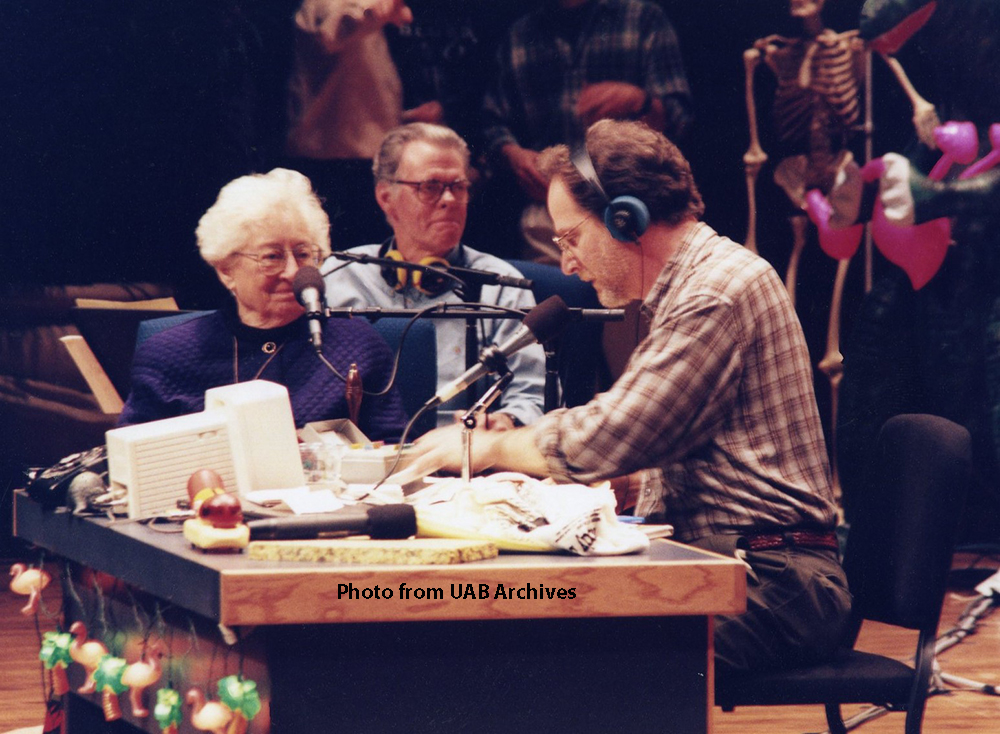
National radio broadcast from UAB's Alys Stephens Center, 1996
Radio host Michael Feldman (right) interviews Alabama author, journalist, and storyteller Kathryn Tucker Windham as part of the weekly radio broadcast of "Whad'Ya Know?" The syndicated National Public Radio program was broadcast live on Saturday, November 2, 1996, from the stage of the concert hall at UAB's new Alys Stephens Performing Arts Center, which had just opened in September. "Whad'Ya Know?" was a long-time staple of the broadcast schedule for UAB's WBHM 90.3 FM Public Radio Station.
Image ID: P46.1, #0200
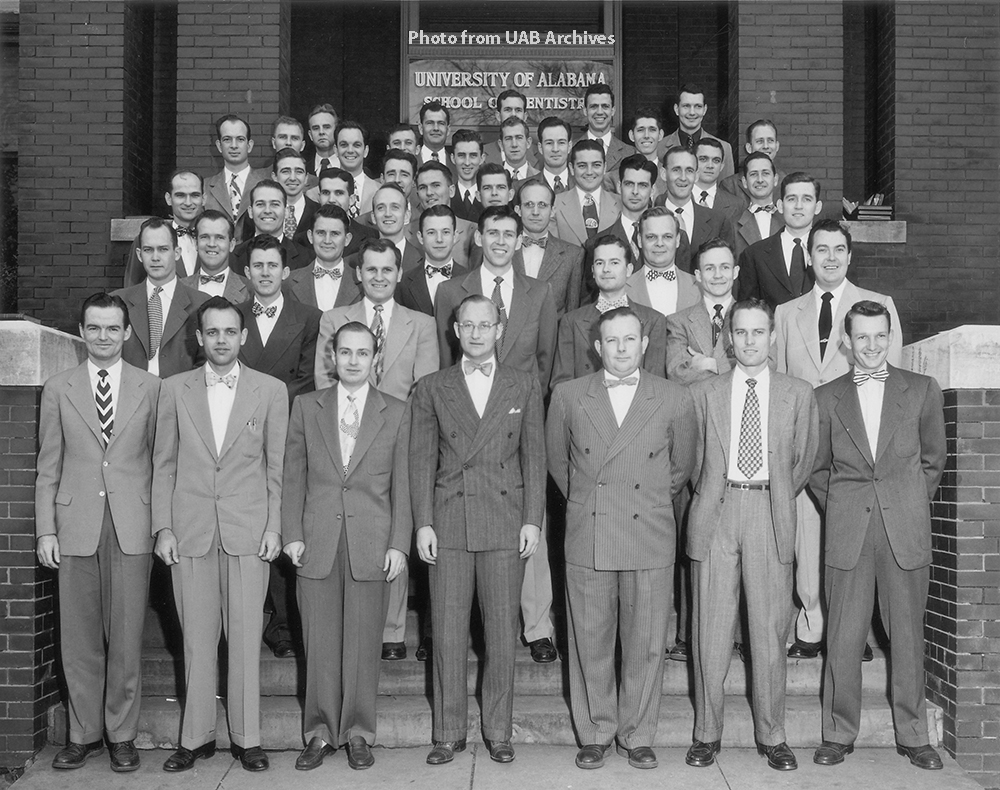
The first class of the School of Dentistry, circa 1948
Recruited to Birmingham by Dr. Joseph F. Volker, founding dean of the dental school, the 52 members of the first class of the School of Dentistry were all veterans of World War II. The students began studies in the new dental school on October 18, 1948. With no stand-alone home, the dental school was initially housed in the Hillman buildings of the hospital complex and it would remain there until 1951 and the completion of a new building. Fifty members of the inaugural class would graduate on May 31, 1952; Walter C. Andrews, Jr., was the school's first graduate.
Read more on the School of Dentistry website.
Image ID: A90-01, #0223
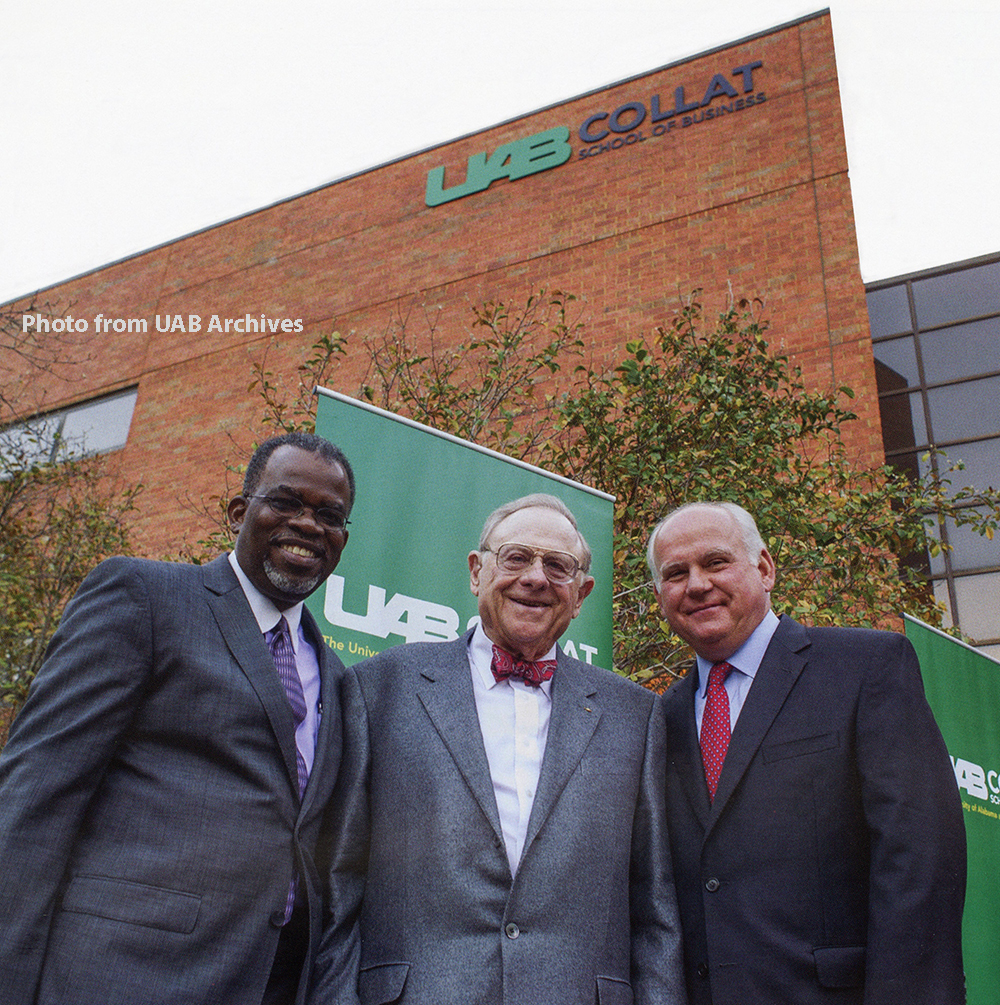
Business school renamed as the Collat School of Business, 2013
On September 13, 2013, the Board of Trustees of the University of Alabama System approved the renaming of the UAB business school as the Collat School of Business in honor of university benefactors Charles and Patsy Weil Collat. This was the first named academic school at the university. The Collat name was added to the home of the school later that year, and at that ceremony were (left to right): Dr. Eric P. Jack, dean of the Collat School of Business, Charles Collat, and Dr. Ray L. Watts, president of UAB. Dr. Jack was dean of the school from 2012 until 2023. Dr. Watts became the seventh UAB president in 2013, the first person to serve as president with an undergraduate degree (Engineering) from the university.
Image ID: Campaign Newsletter
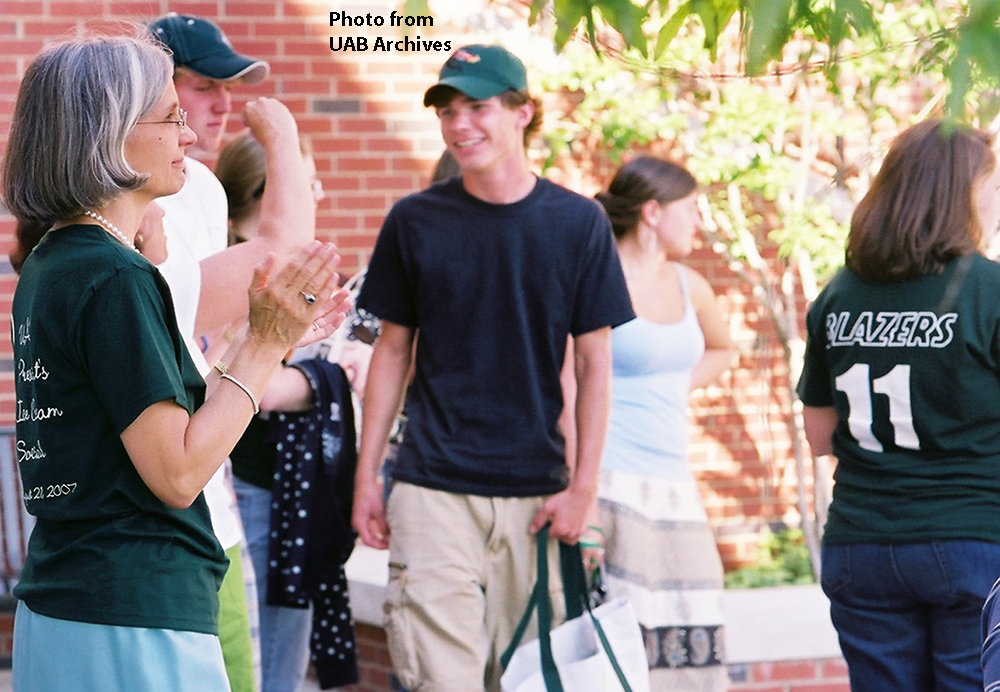
Welcoming Students Back to the UAB Campus, 2007
To welcome UAB students back to campus for the new school year, President Carol Z. Garrison (left foreground) hosted an ice cream social at the Commons on the Green on August 21, 2007. Attendees received ice cream, beverages, and a UAB tee-shirt. Dr. Garrison served as UAB president from 2002 until 2012. She was the second UAB president to have graduated from the university, having earned a master's degree in nursing.
Image ID: A2018-13P
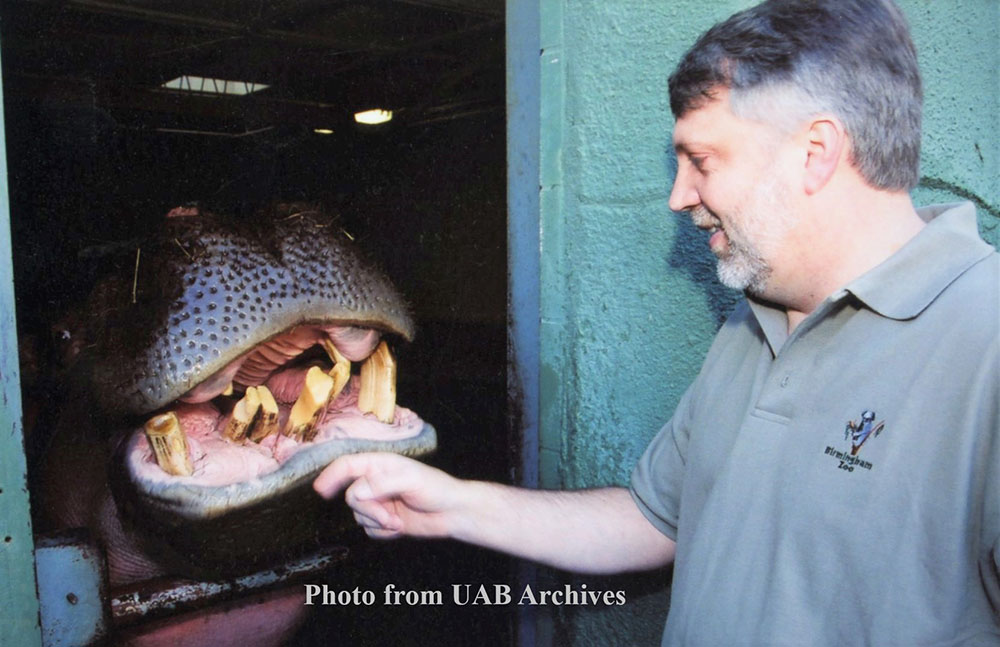
Visiting a patient at the Birmingham Zoo, 2001
UAB's Dr. Steven J. Filler became a volunteer dentist for the Birmingham Zoo in 1983; his first patient was a polar bear with a bad tooth. Over the years, Filler let UAB dental students accompany him on his zoo rounds on a regular basis. Filler worked with the zoo while serving as a member of the dental school faculty and as one of the school's assistant deans.
Image ID: P7.3.13, #1155
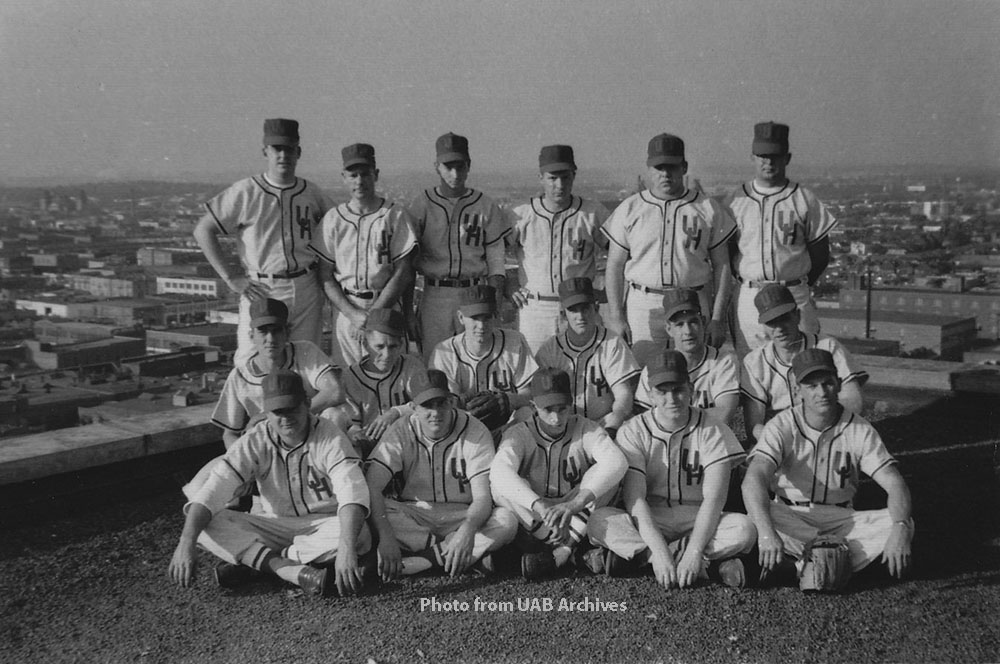
The hospital's boys of summer, 1959
In 1959 a baseball team was organized at University Hospital. It was comprised of staff from the hospital and from across the Birmingham medical center. The team competed in the Northern Division of the Birmingham Amateur Baseball Association and played home games in the city's Jordan Park, located just a few blocks west of the hospital at 8th Avenue South and 11th and 12th Streets South [the location of today's university soccer and baseball fields]. This first team photograph was taken on the roof of the hospital's Jefferson Tower.
Image ID: P16.1.12, #0239
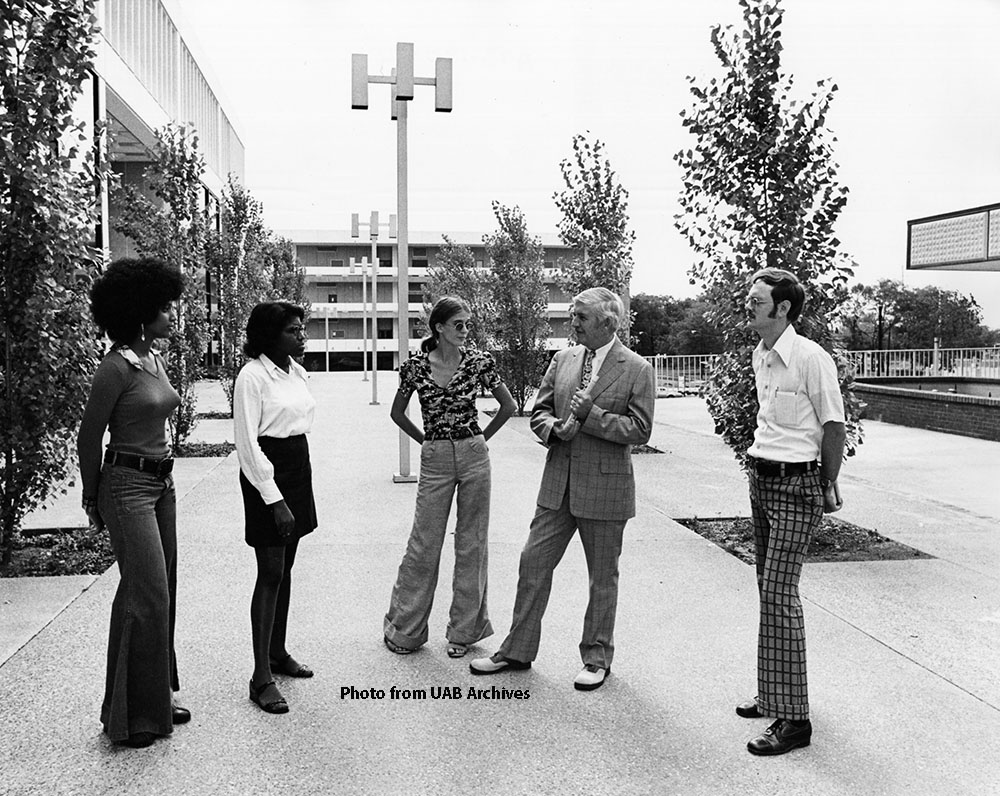
On the plaza at Sterne Library, circa 1975
UAB President Joseph F. Volker (second from right) speaking to members of the UAB community. Dr. Volker and the group were enjoying the day in the plaza between the Sterne Library (left) and University College Building No. 1 [later the School of Education Building]. A new outdoor plaza has just opened between Sterne Library and the newest academic building on the UAB campus, Phase I of the Science and Engineering Complex. The new building replaced the School of Education Building and will be occupied this summer by the Departments of Biology, Chemistry, and Physics.
Image ID: P7.3.2, #0054
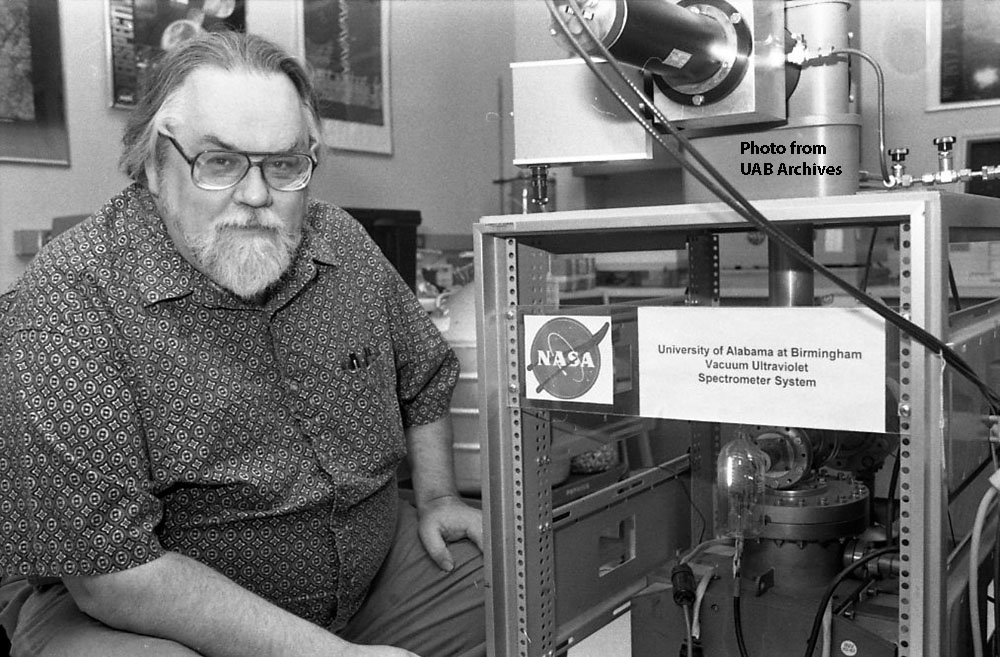
Dr. Thomas Wdowiak with a NASA spectrometer, 1999
Dr. Thomas Wdowiak, an astrophysicist at UAB, worked on several NASA research and exploration teams and helped design the Mars Rover vehicles. Once the rovers were on the planet, Wdowiak “drove” them from the NASA Jet Propulsion Laboratory in California and from his home in Birmingham. His NASA colleagues named a ridge on the western rim of the Endeavour crater on Mars as Wdowiak Ridge in his honor following his death in 2013. Wdowiak was a member of the faculty of the Department of Physics from 1976 until his retirement in 2005.
Image ID: P23.1
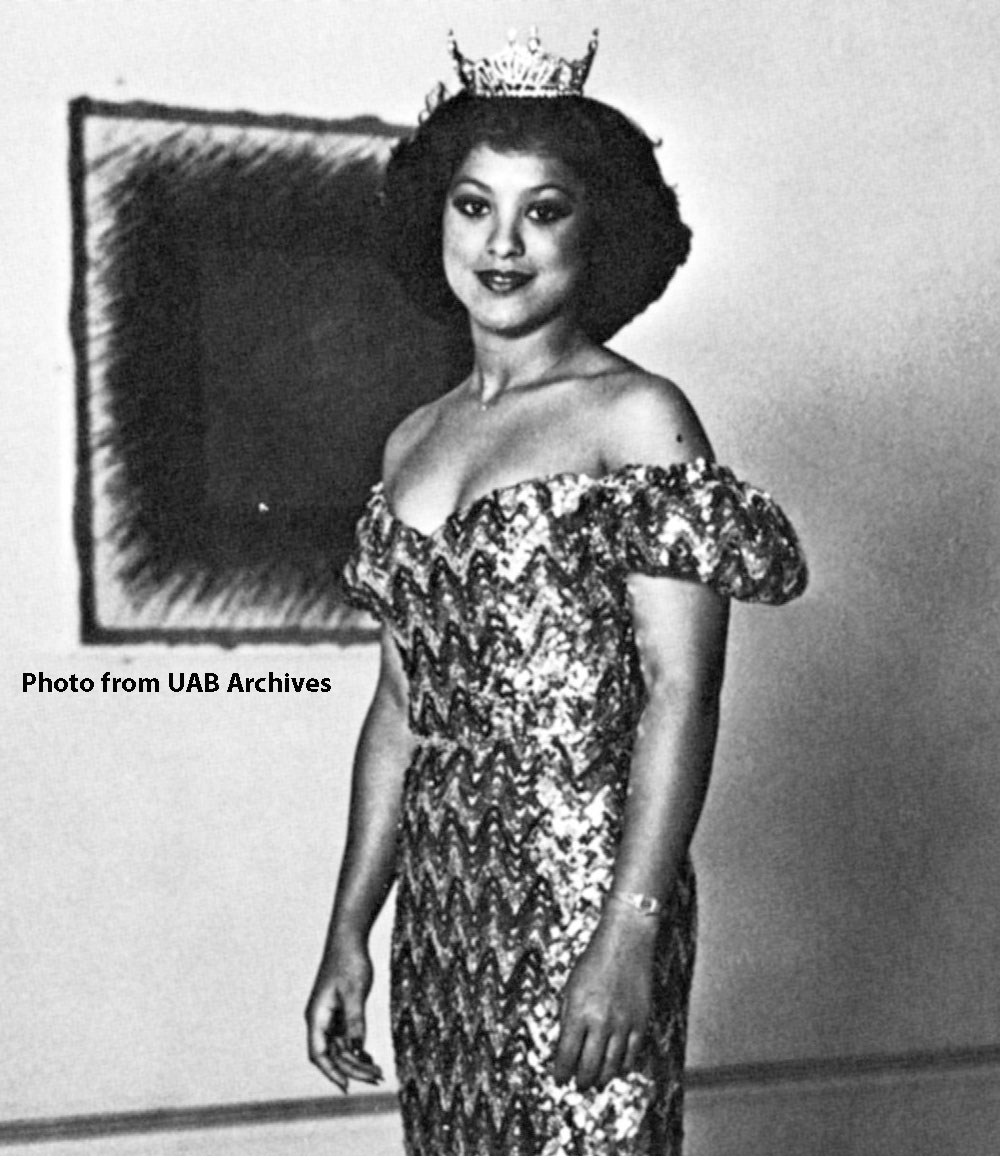
First Miss UAB selected, March 26, 1983
The inaugural Miss UAB pageant was held in the Bell Theatre on March 26, 1983, with twenty-two students competing. Phyllis Pope, a pre-dentistry major from Illinois, was chosen as the first Miss UAB. Her talent competition was vocals. The UAB pageant was established as an official preliminary for the Miss Alabama and Miss America organizations, and today's scholarship competition remains as a preliminary for the two organizations.
Image ID: Phoenix yearbook
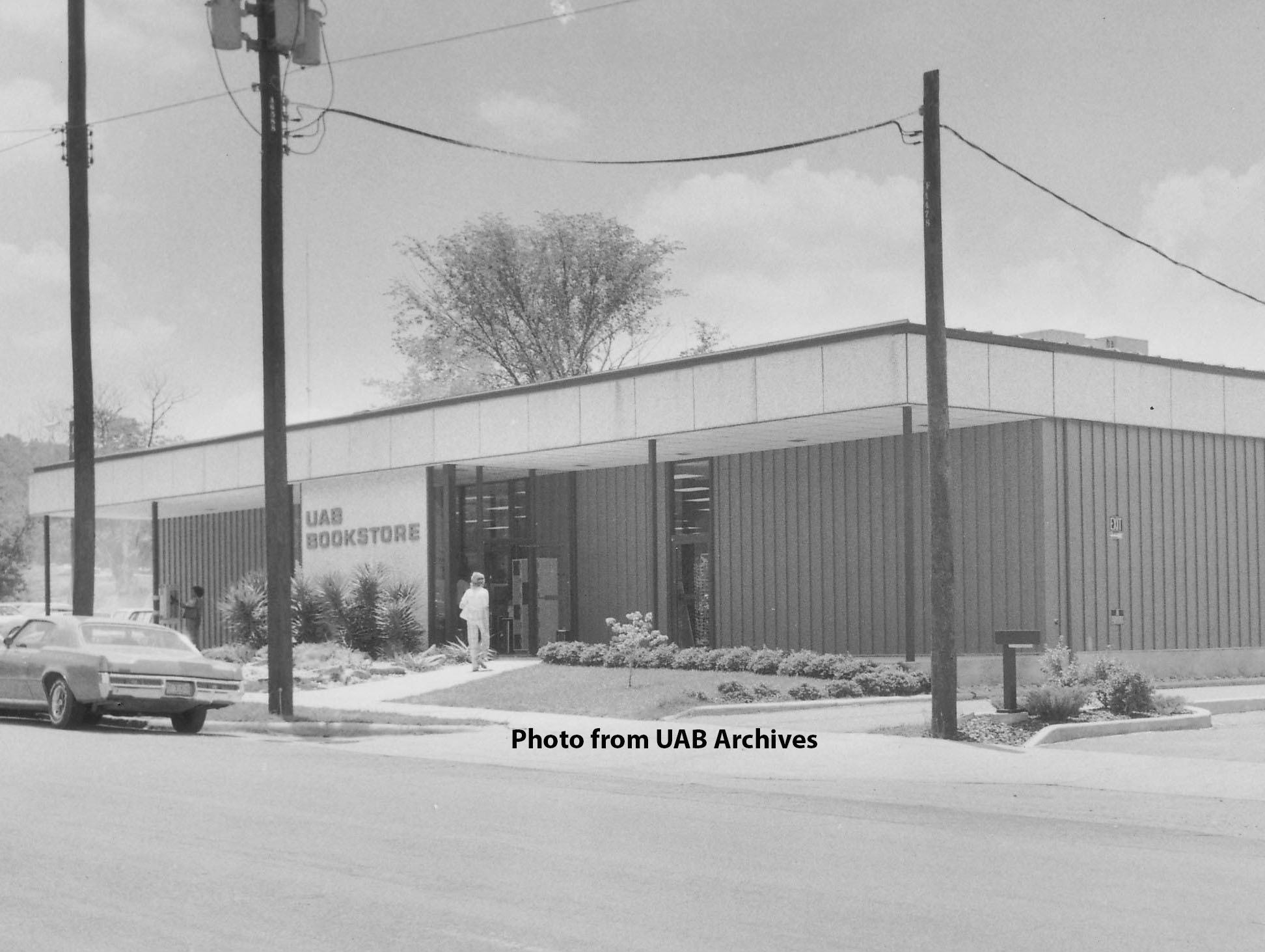
UAB Bookstore, circa 1978
In February 1973 UAB opened a new bookstore after a move from the store's prior location in the basement of Tidwell Hall. The "new" bookstore, a building which had formerly housed a dry-cleaning business, was located on 15th Street South at the corner of 8th Avenue South. The bookstore remained in this location until it was moved into the original Hill University Center in 1983. This building was again renovated and was renamed as the 15th Street Classroom Building, which provided the academic community with six classrooms and a conference-seminar space. The building was demolished in 2006 as development proceeded on the Campus Green.
Image ID: P8.1.1, #0013
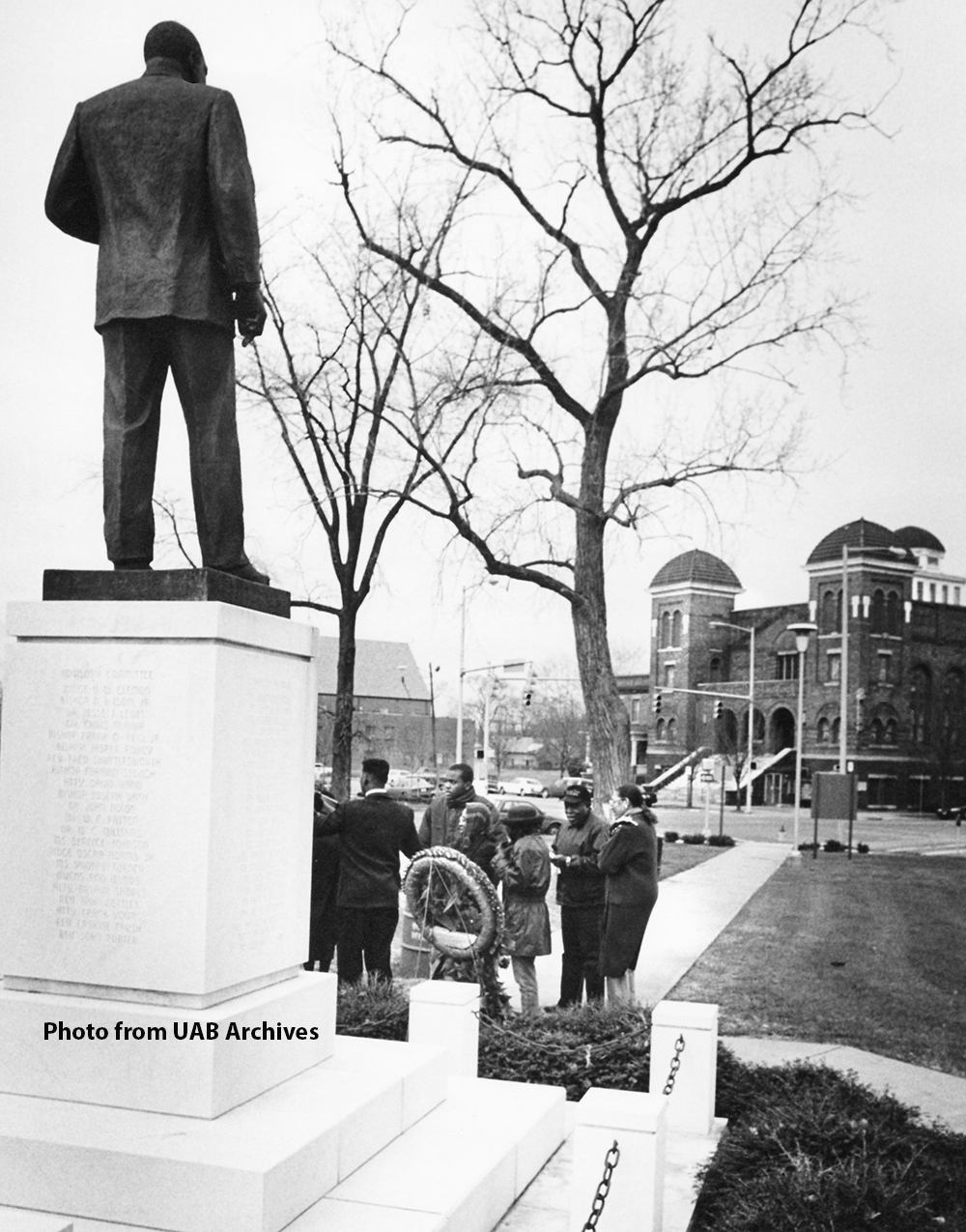
Students participate in events honoring Martin Luther King Day, 1991
UAB first observed Martin Luther King, Jr., Day as a university holiday in January 1993. But the university had held or participated in various commemorative events in prior years. In 1991 UAB students participated in a wreath-laying ceremony in front of the statue of Rev. King located in the city's Kelly Ingram Park; the Sixteenth Street Baptist Church is in the right background. This ceremony was one of several UAB events held that year to mark King Day.
Image ID: P7.4.1, #0027
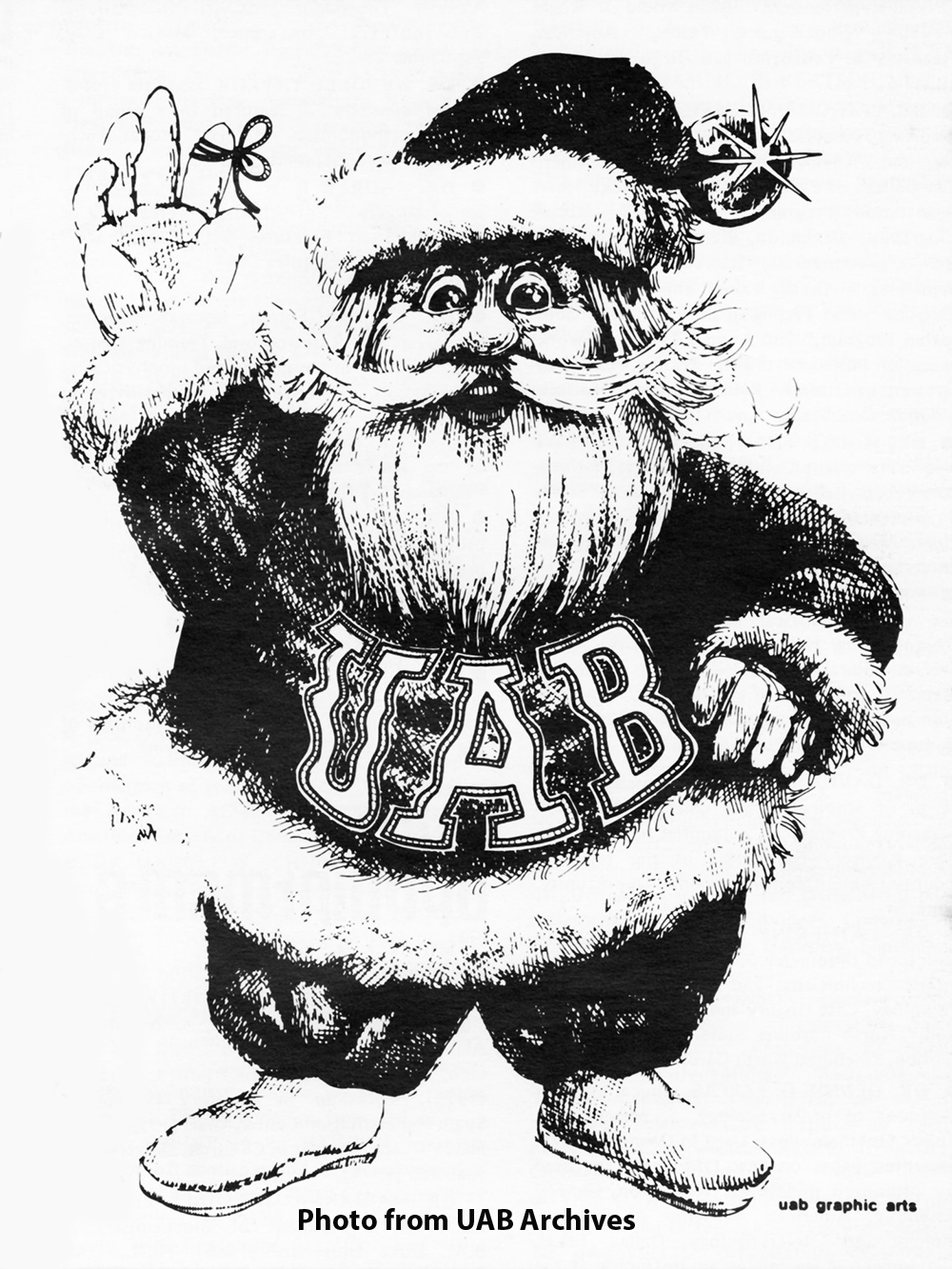
Santa Sends Holiday Greetings, 1975
In this image from a 1975 campus publication, Santa Claus donned a special UAB suit to wish everyone on campus a happy holiday season.
Image ID: Bulletin, 1975
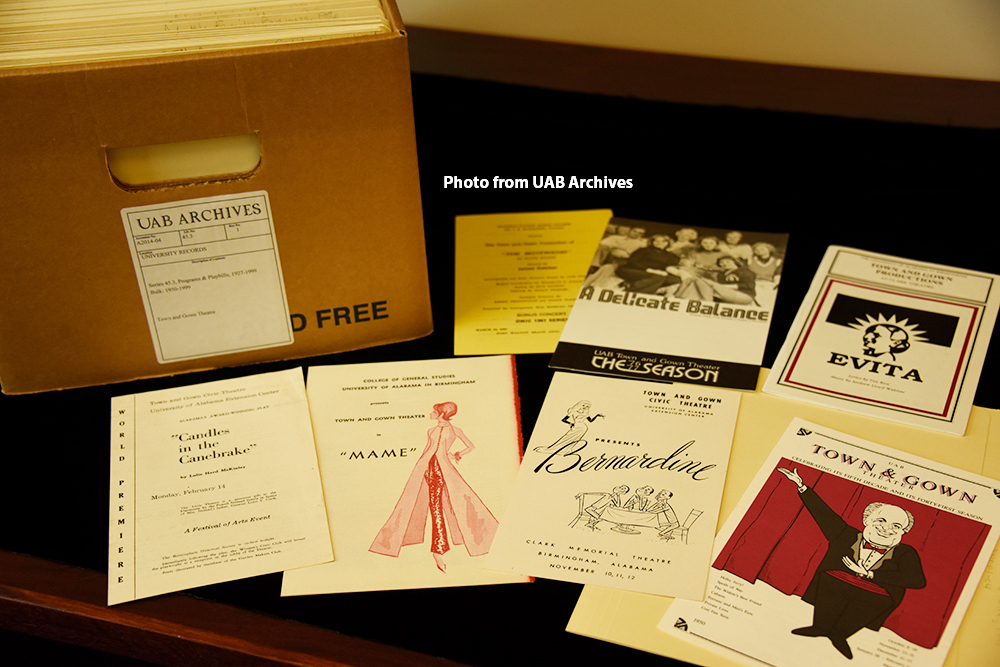
Thirty Years of Preserving University History
This image from 2017 highlights one of the collections held in UAB Archives, the records of the UAB Town and Gown Theatre (Record Group 45). The university's official archival repository was formally established by President Charles A. McCallum, Jr., in November 1992. University Archives, which is one of the three units of the special collections department of the UAB Libraries, is located in the Lister Hill Library Building. It is open for research by appointment to all university associates and to members of the community.
Image ID: P6
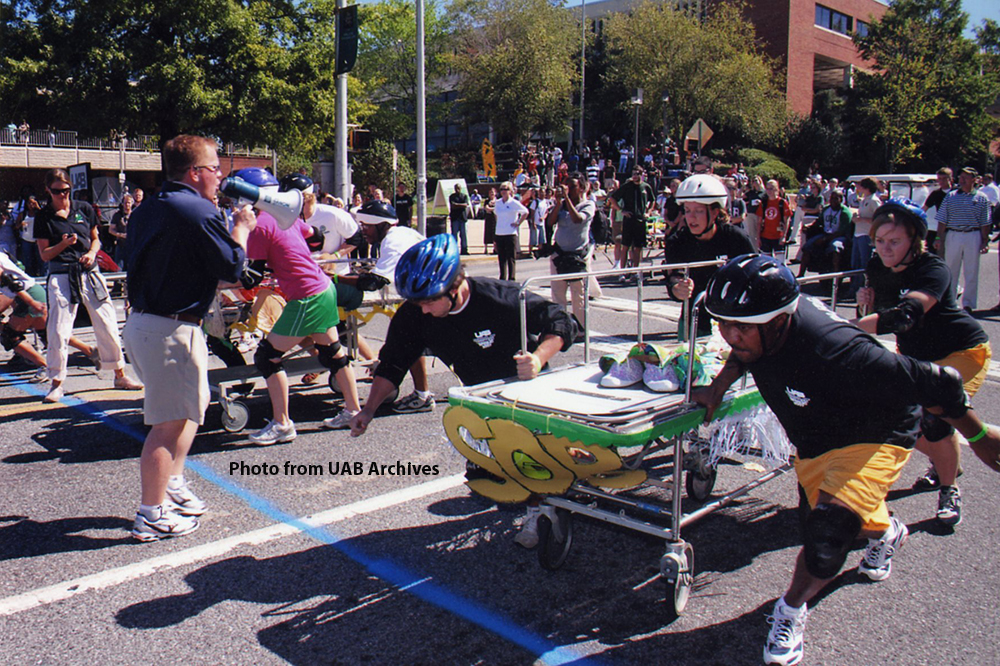
Gurney Derby at Homecoming, 2007
The Gurney Derby has been part of the UAB Homecoming Week festivities since 1994. Four-member teams decorate and then race a hospital gurney down 13th Street South from the Mervyn H. Sterne Library to the UAB Mini Park and back. In addition to the award for the team with the best race time, an award is presented to the team with the worst race time (the Dead Last Award).
Image ID: A2018-06P
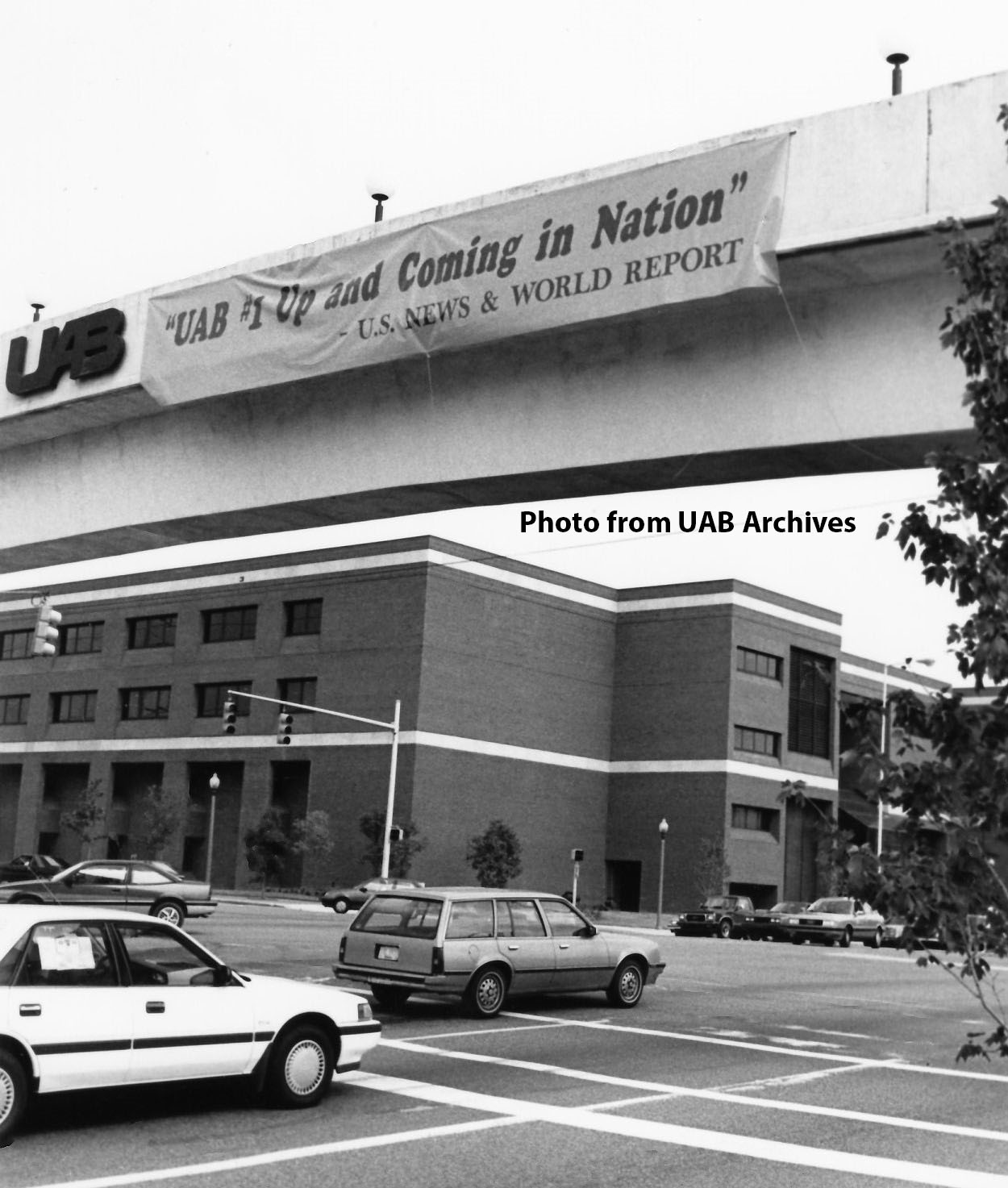
UAB selected as a top university, 1992
In the September 28, 1992, issue of U.S. News & World Report, UAB was selected in the magazine's annual best colleges issue as the No. 1 Up and Coming University in the nation. To celebrate, UAB staff placed a banner on the 13th Street pedestrian bridge over University Boulevard so that all traveling through campus would learn of this honor.
Image ID: P7.4.1, #0564
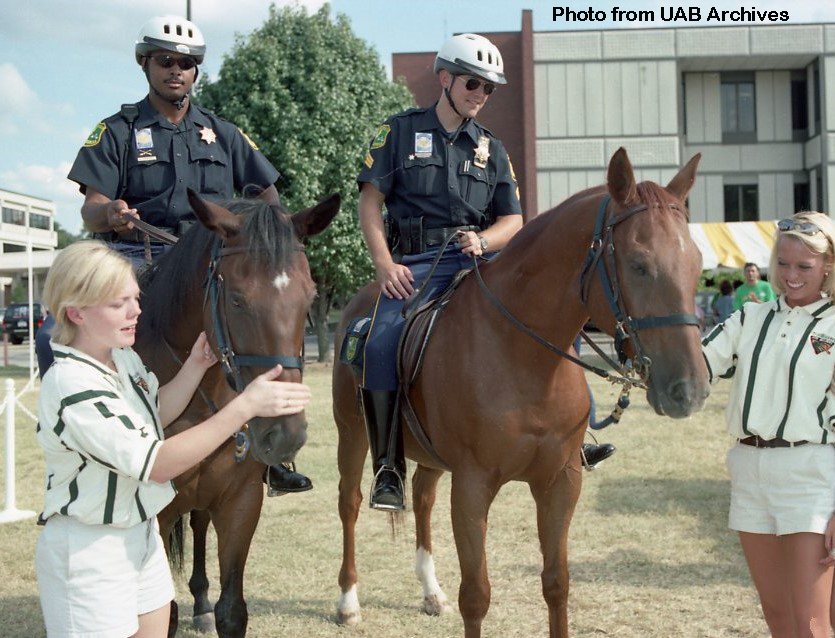
Students and the UAB Mounted Police during an event for new students, 1998
The office of Student Affairs has long hosted an annual event each fall term to welcome new incoming students to the UAB campus. These events provide information on the various student groups and campus organizations, offer live entertainment, and often feature free food for attendees. Formerly held in the UAB Mini Park, more recent fall events have been held on the UAB Campus Green. The 2022 event, Connect Fest, was held on the Green on Sunday, August 21.
Image ID: A2004--03P
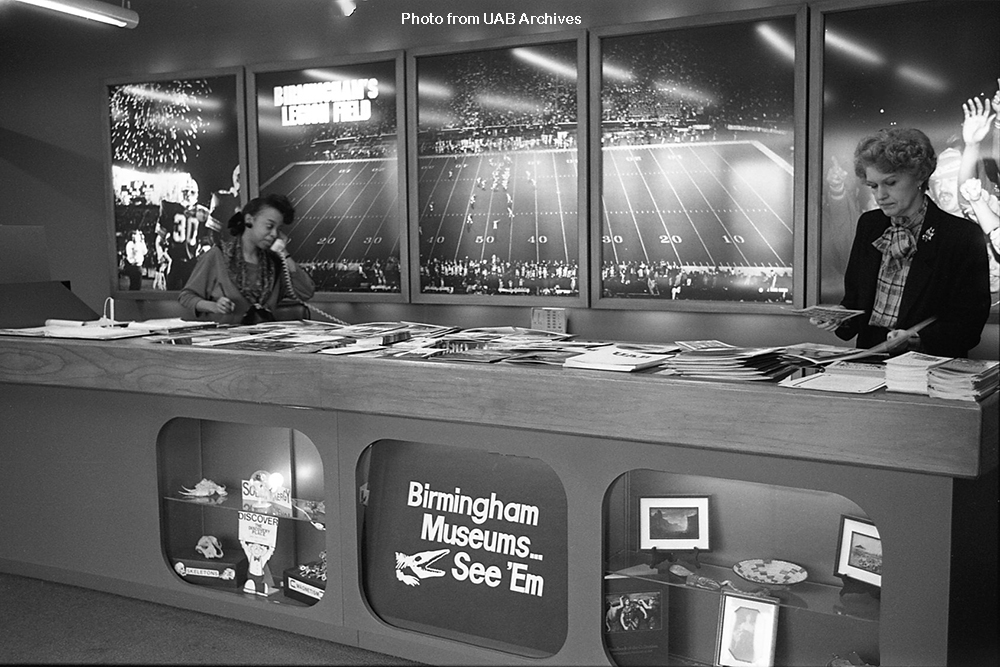
Visitor center at UAB welcomes visitors to campus and to Birmingham, 1988
A small brick building on the western edge of the university campus was opened in 1985 as a joint venture between UAB and the Greater Birmingham Visitors and Convention Bureau. Center staff assisted city and campus visitors, were able to assist with hotel and dining reservations, and were able to distribute UAB material and forms during weekends when most university offices were closed. The center was located at the corner of University Boulevard and 12th Street South, at the site of today's University Boulevard Office Building.
In July the university community welcomed the world to UAB and to Birmingham as UAB served as a major partner of the 2022 World Games. Sporting competitions were held at several university facilities, tug-of-war at the track facility, lacrosse at the soccer field, and racquetball and squash in the Campus Recreation Center. UAB residence halls served as the World Games Village and housed visiting athletes and coaches. UAB Medicine was also the official sponsor of medical services for the 2022 World Games. This was not the first time UAB had hosted national and international athletes, as UAB played host to several soccer teams during the 1996 Summer Olympic Games and campus was used as a sporting venue for the 2017 U.S. National Senior Games.
Image ID: A2007-11P
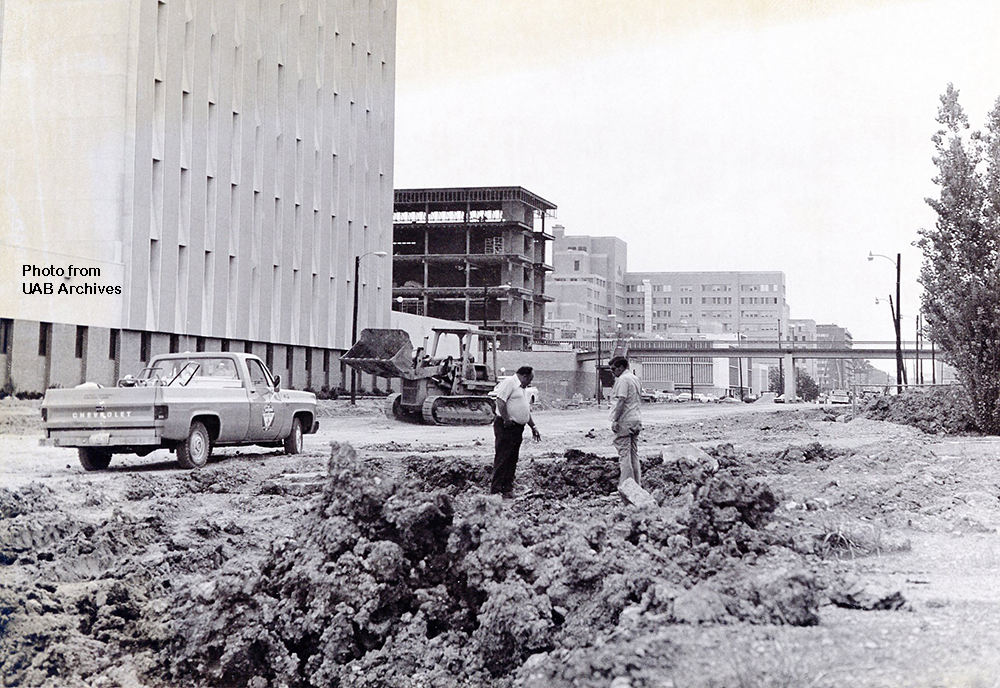
Eighth Avenue South closed for construction, circa 1974
As an urban university housed in the middle of the city of Birmingham, UAB construction projects and special events often necessitate the closure of portions of streets or of entire streets, for short or extended durations depending on the specific project. This is a common occurrence today, with numerous ongoing construction projects on the campus. But street closure is nothing new to UAB. As is clearly visible in this photograph from circa 1974, Eighth Avenue South, one of the city's main thoroughfares, was closed to traffic to allow work on the streetscape and for continued construction of the optometry building (center background). Eighth Avenue South would be renamed in 1981 as University Boulevard.
Image ID: P7.3.1, #0233
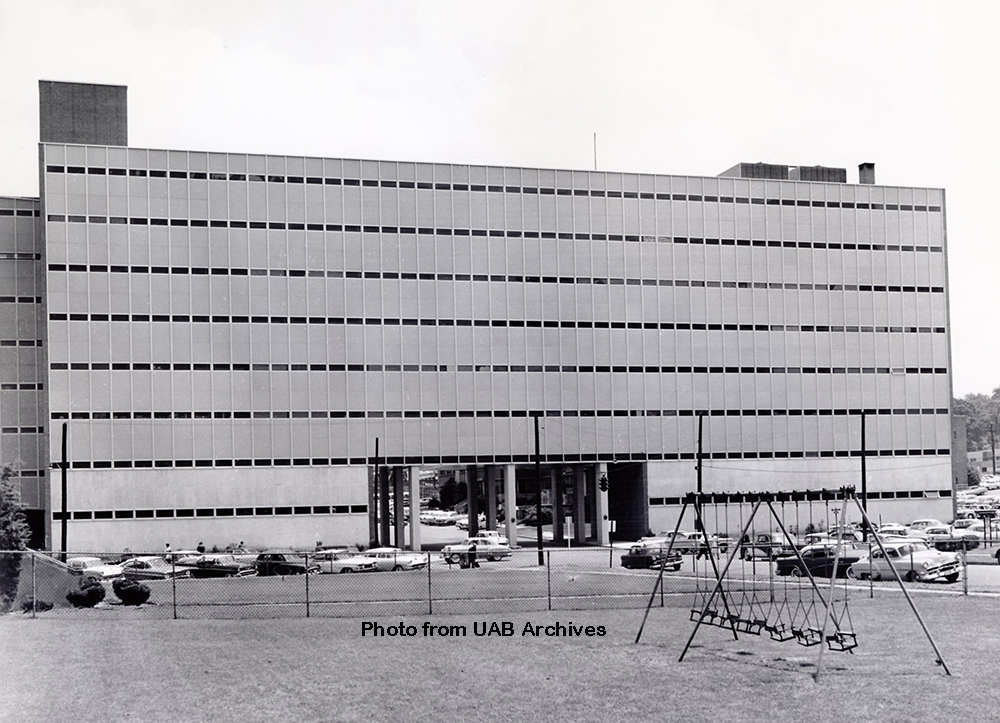
Health Sciences Research Building, circa 1960
The Health Sciences Research Building, which spans Seventh Avenue South, was dedicated on December 9, 1960. In 1966 an addition was completed on the southern edge of the building, and on November 6, 1966, the newly expanded building was rededicated as the Lyons-Harrison Research Building. It was named in honor of Dr. Champ Lyons (former chair of the Department of Surgery) and Dr. Tinsley R. Harrison (former chair of the Department of Medicine). On April 11, 2022, UAB held a groundbreaking for a project that will result in a complete renovation of the building and its renaming as the Altec/Styslinger Genomic Medicine and Data Sciences Building. The $78 million project is planned for completion in 2024.
Image ID: P7.2.7, #0356
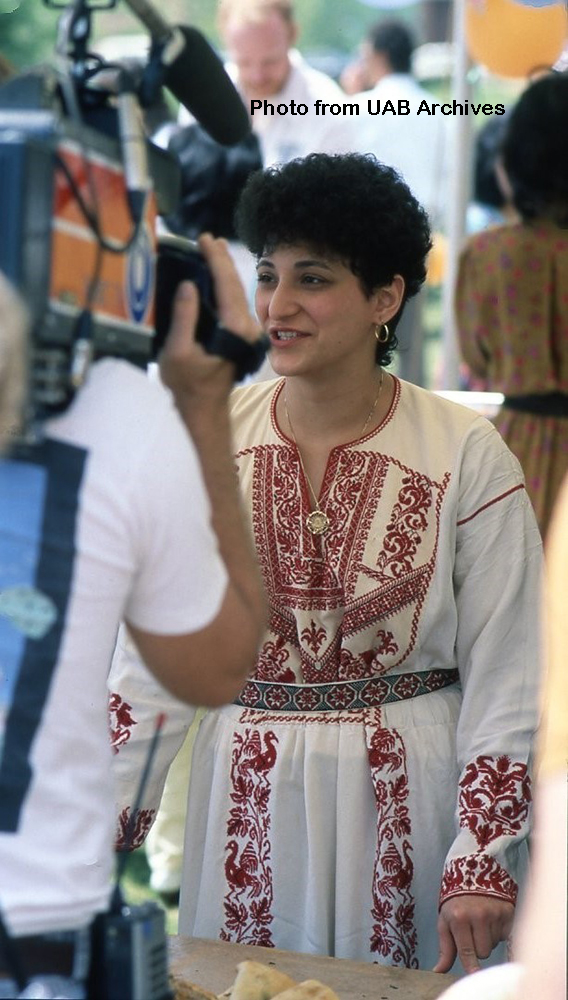
UAB International Festival, 1987
UAB's first International Festival was a multi-day event held in April 1987. It kicked off with an International Food Festival held in the Mini Park. Other events during the week included an arts and crafts bazaar, a talent show, and an open house held in the Smolian International House. UAB had previously hosted an International Food Festival, but in 1987 the festival was expanded to include more activities and events. UAB's International Student Association sponsored the festival.
Image ID: A2007-11P
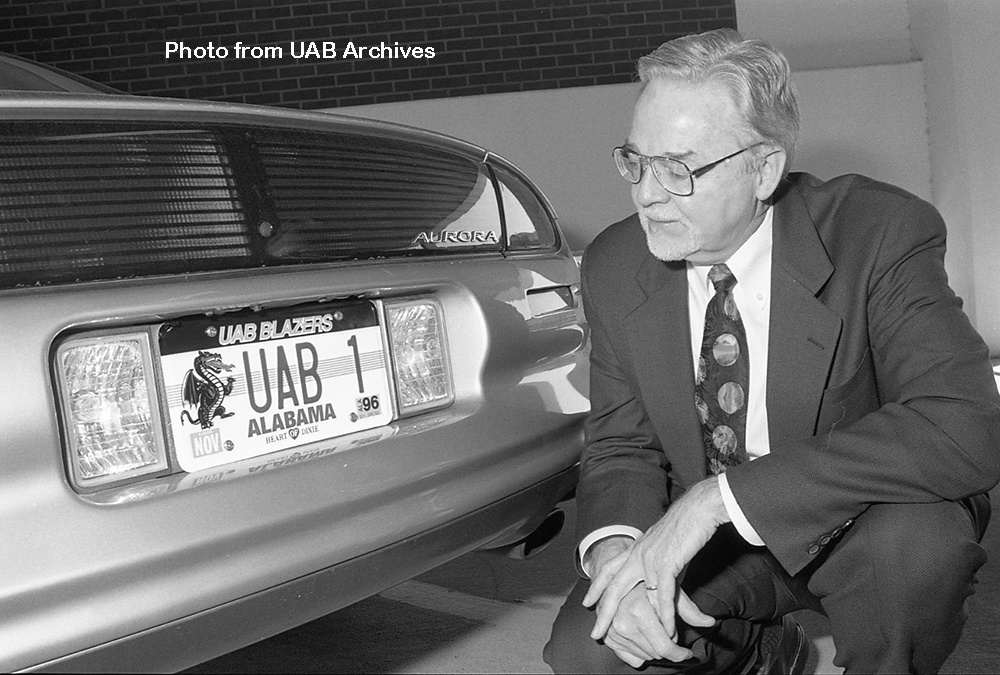
President Claude Bennett and the new UAB license plate, 1996
The UAB License Plate debuted in April 1991 as part of the state’s collegiate license plate program. The program supported the UAB National Alumni Society and raised funds for student scholarships. The new tag, which was introduced in 1996, was the second tag layout and featured UAB’s new mascot, Blaze the Dragon. Dr. J. Claude Bennett served as the fourth president of UAB from 1993 until 1996. Prior to being named as president, Bennett had been the chair of the university’s Department of Microbiology and chair of the Department of Medicine.
Image ID: A2001-17P
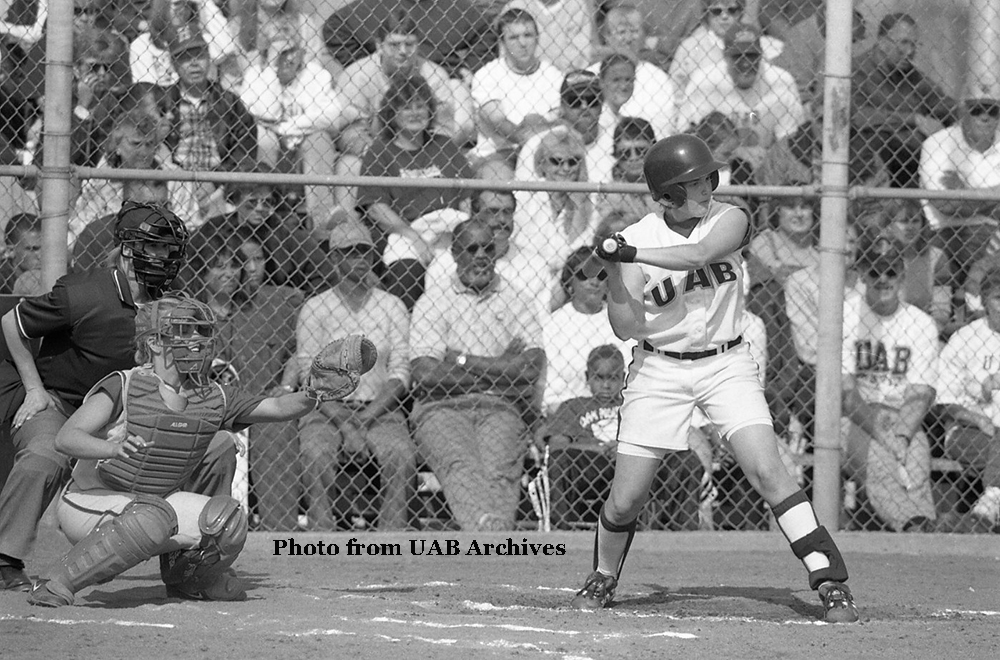
Blazer Softball begins, 2000
Image ID: A2004-03P
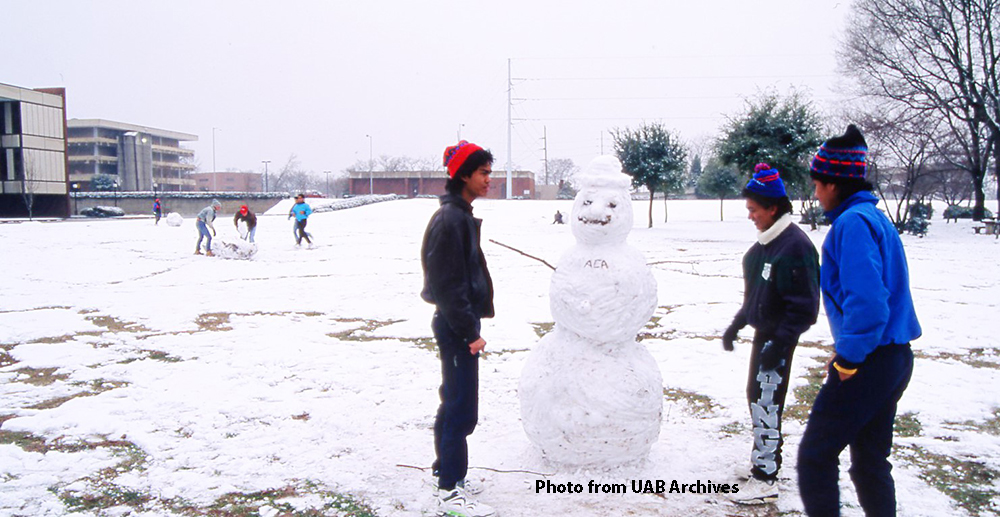
Students in the snow, January 1992
Image ID: P7.3.13
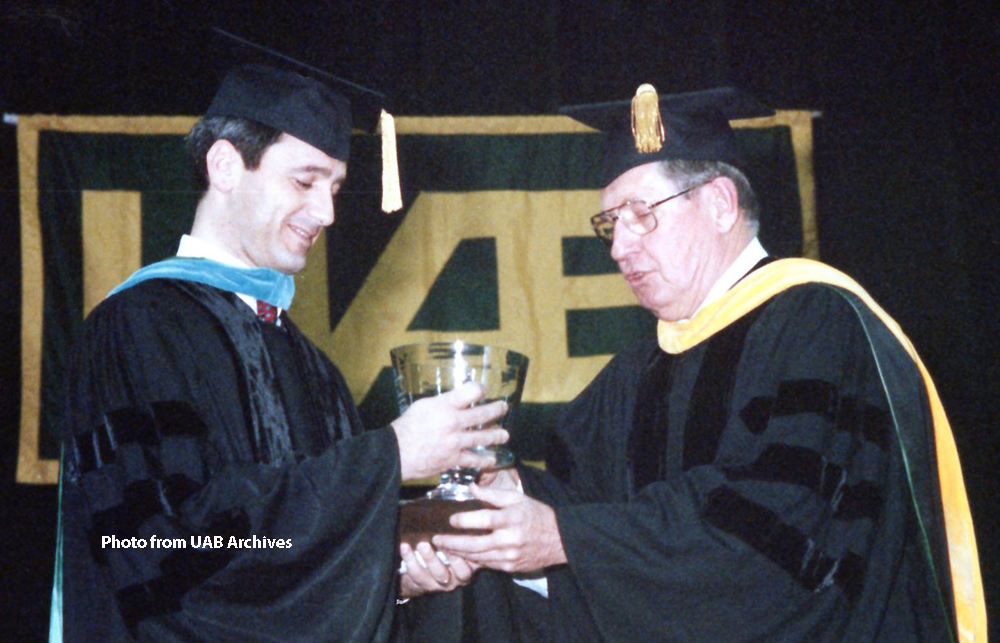
Dr. Larry DeLucas receives the inaugural Distinguished Alumnus Award, December 1991
Image ID: P6, #0102
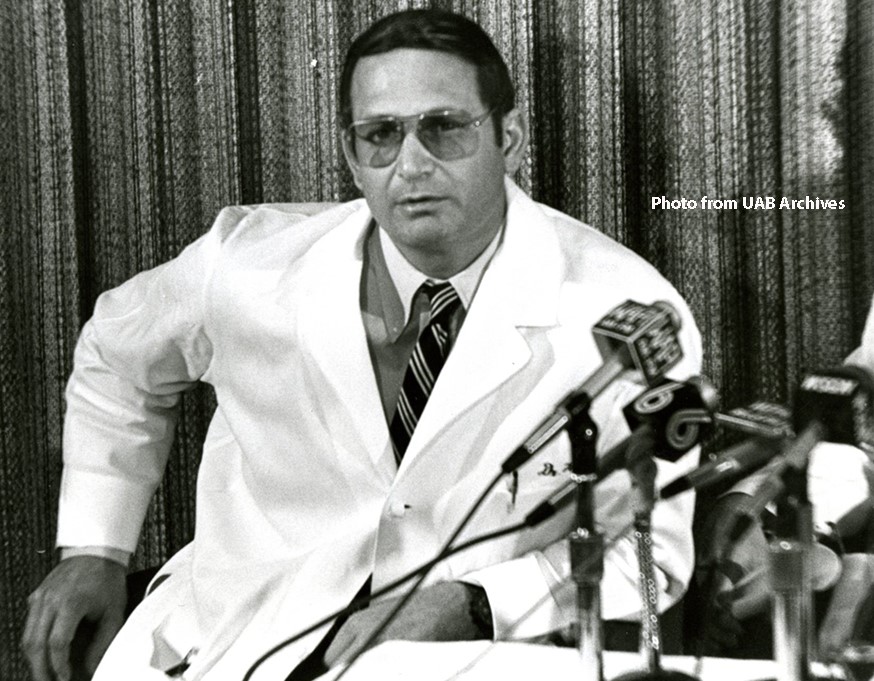
Transplant surgeon Robert Karp interviewed by local media, November 1981
Image ID: P7.2.1, #0211
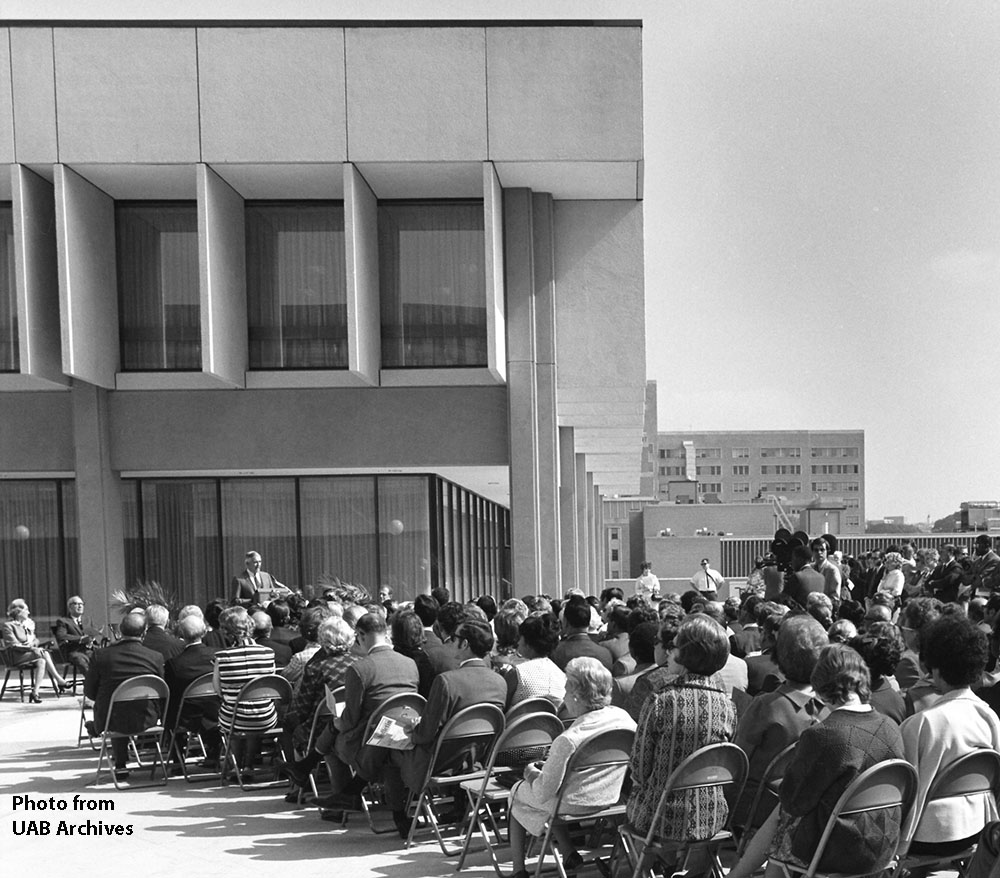
Dedication of the Lister Hill Library of the Health Sciences, October 19, 1971
Image ID: P7.2.7, #1458
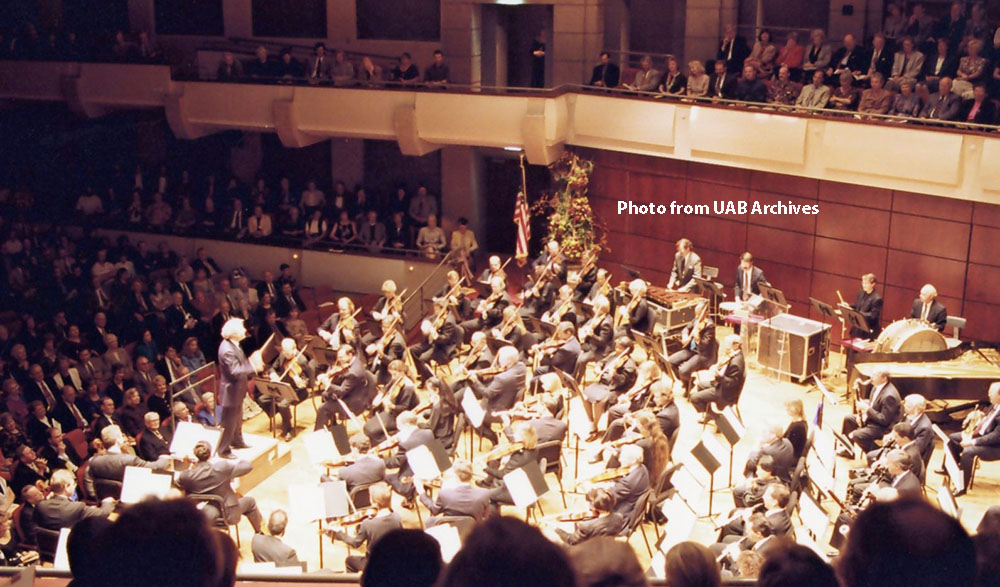
Alys Stephens Performing Arts Center opened, September 22, 1996
Image ID: P7.3.13, #1327
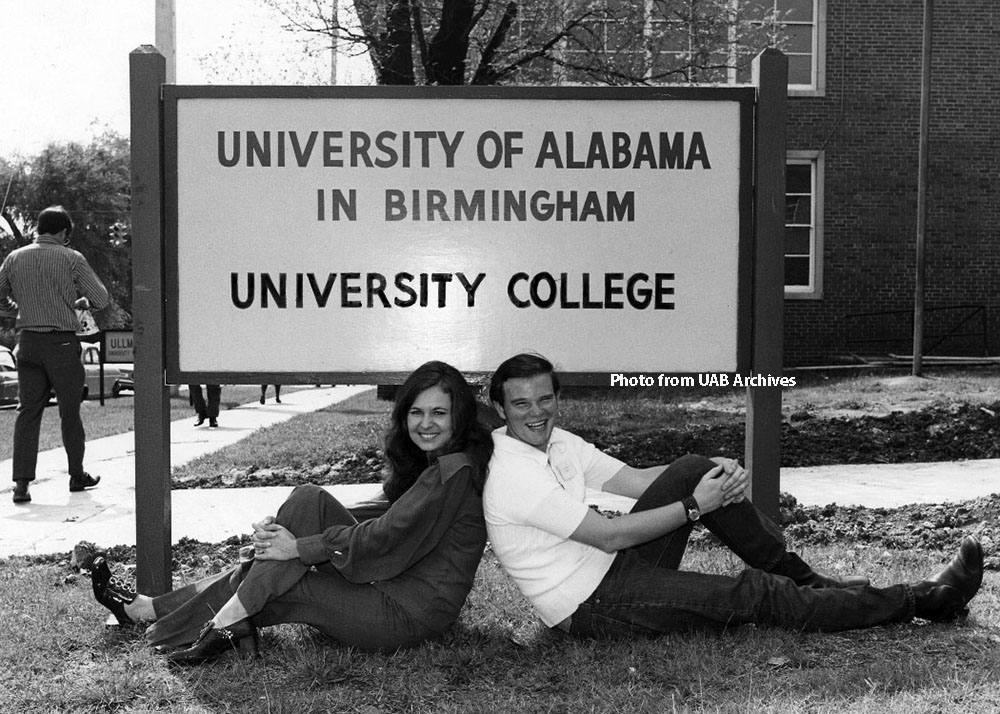
A new sign highlights the new University College, 1971
Image ID: P7.3.3, #0046
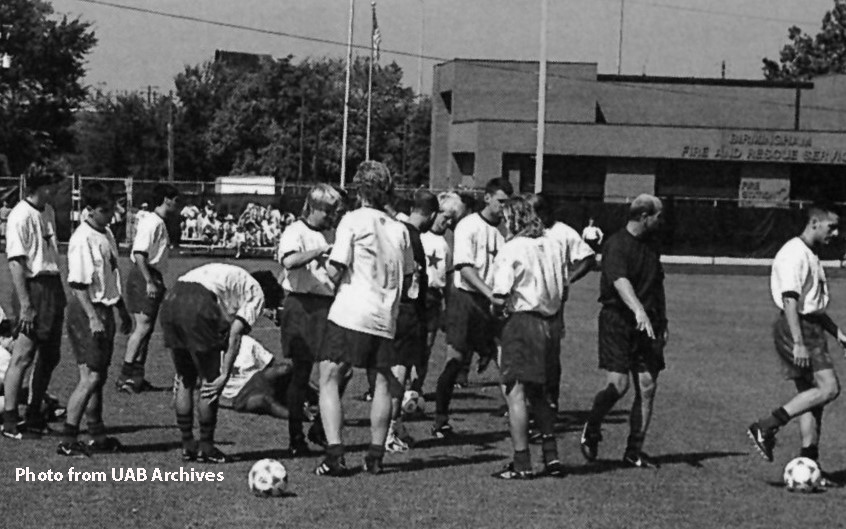
US Men's Soccer Team trains on the UAB campus, July 1996
Earlier this year, UAB was announced as a host for the forthcoming World Games, to be held in Birmingham in July 2022. Visiting athletes, coaches, and officials will be housed in UAB residence halls and four athletic competitions (lacrosse, tug-of-war, racquetball, and squash) will be hosted in venues on the UAB campus. UAB Medicine will also be the official sponsor of medical services for the World Games.
Image ID: 6.3 (UAB Soccer Media Guide, 1997)
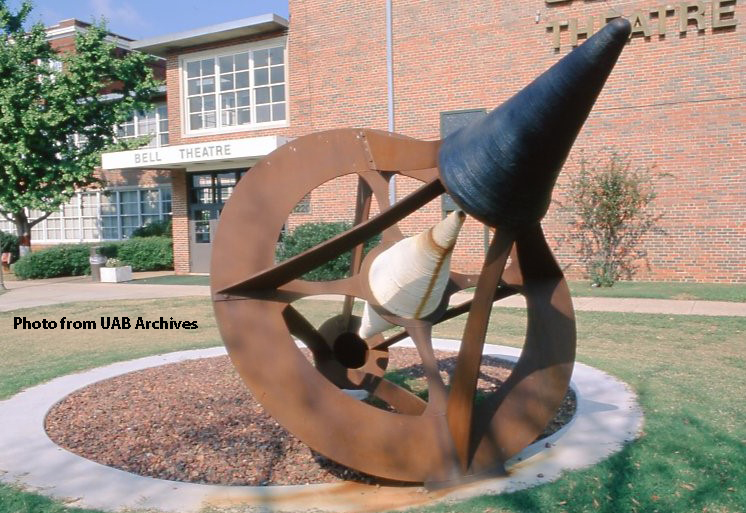
UAB outdoor sculpture, circa 2000
Image ID: P7.3.13
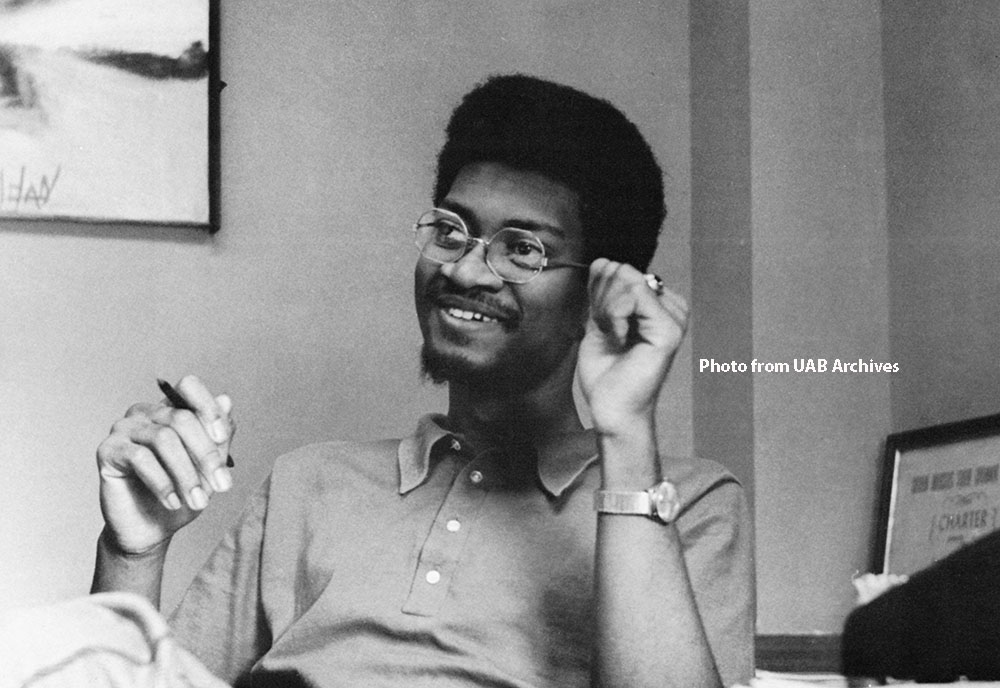
Bracie Watson elected SGA president, May 1971
Image ID: Annual Report yearbook
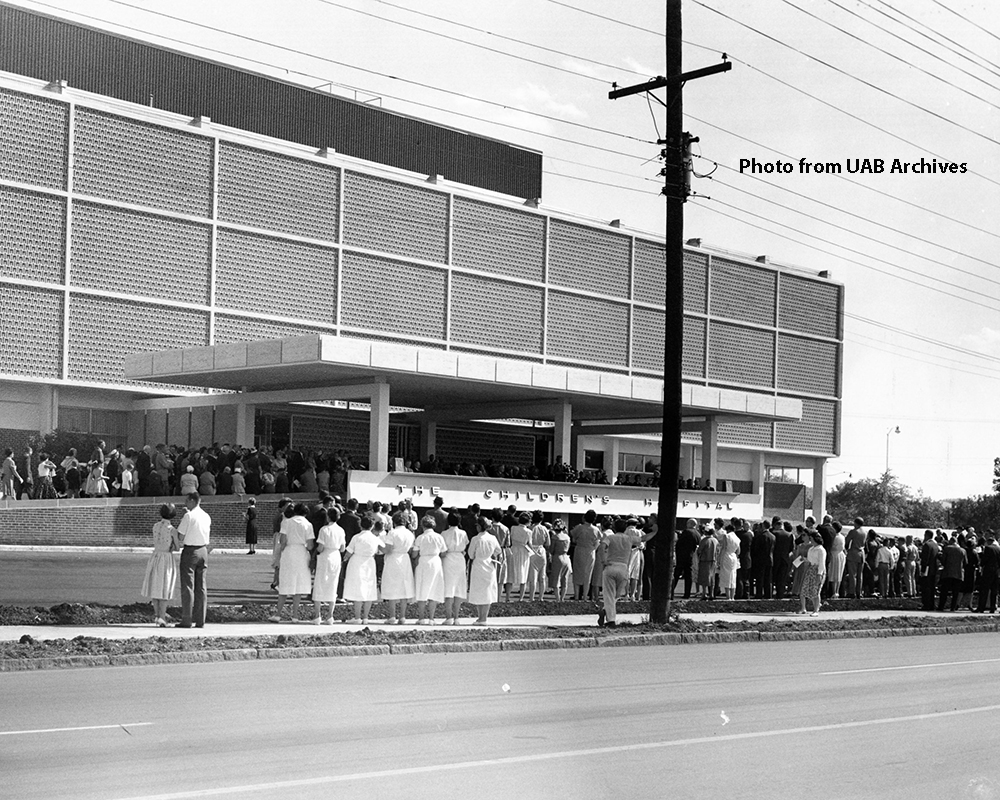
Dedication of Children's Hospital, 1961
Image ID: P7.2..7, #1433
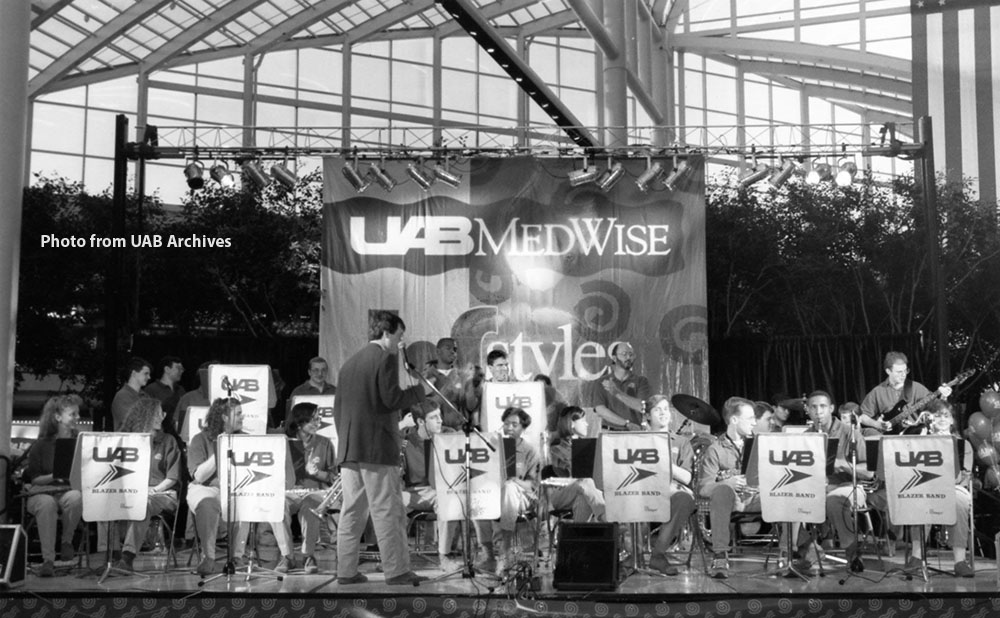
UAB MedWise Takes the Stage at the Riverchase Galleria, 1994
Image ID: P7.4.1, #1113
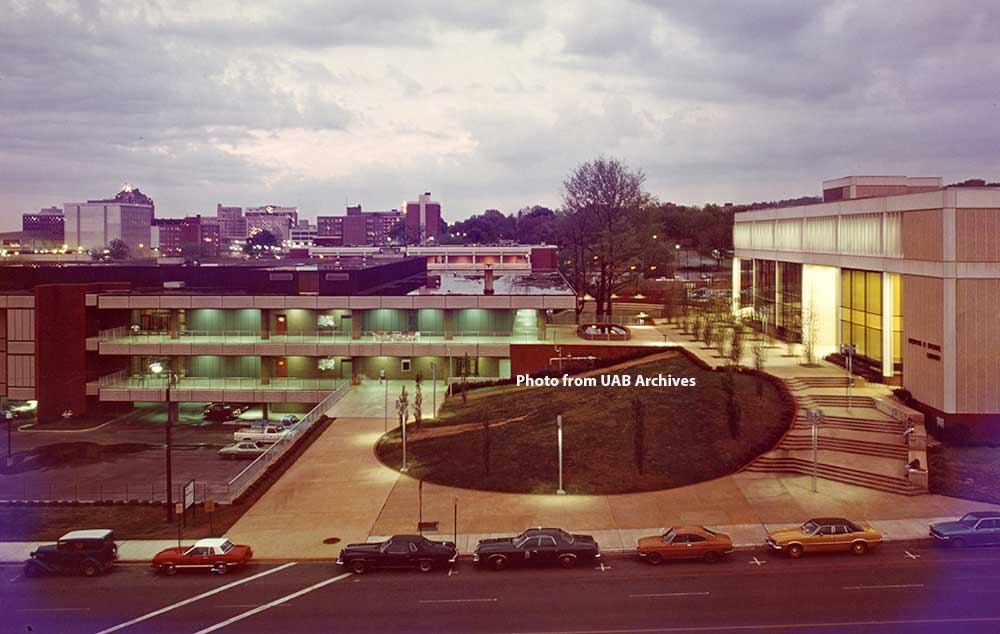
University College Building No. 1 and Mervyn H. Sterne Library at dusk, circa 1973
University College Building No. 1 and Mervyn H. Sterne Library were among the first four buildings constructed for the new University College campus. The four buildings were dedicated during ceremonies held on May 20, 1973. In September 1983 Building No. 1 was rededicated as the School of Education Building. The education school moved out of its long-time home in 2020, and the building is slated for demolition in order to make way for a new Science and Engineering Complex.
Image ID: P1, #0675
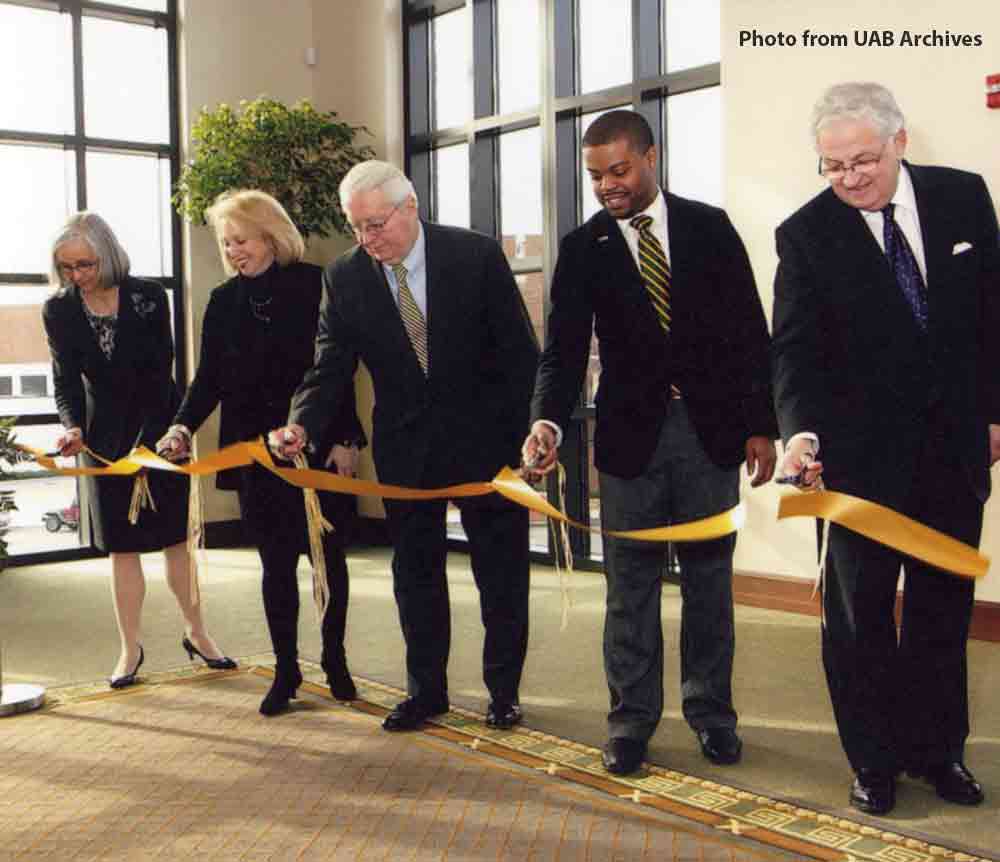
UAB National Alumni Society House Dedicated, 2011
Image ID: A2018-13P
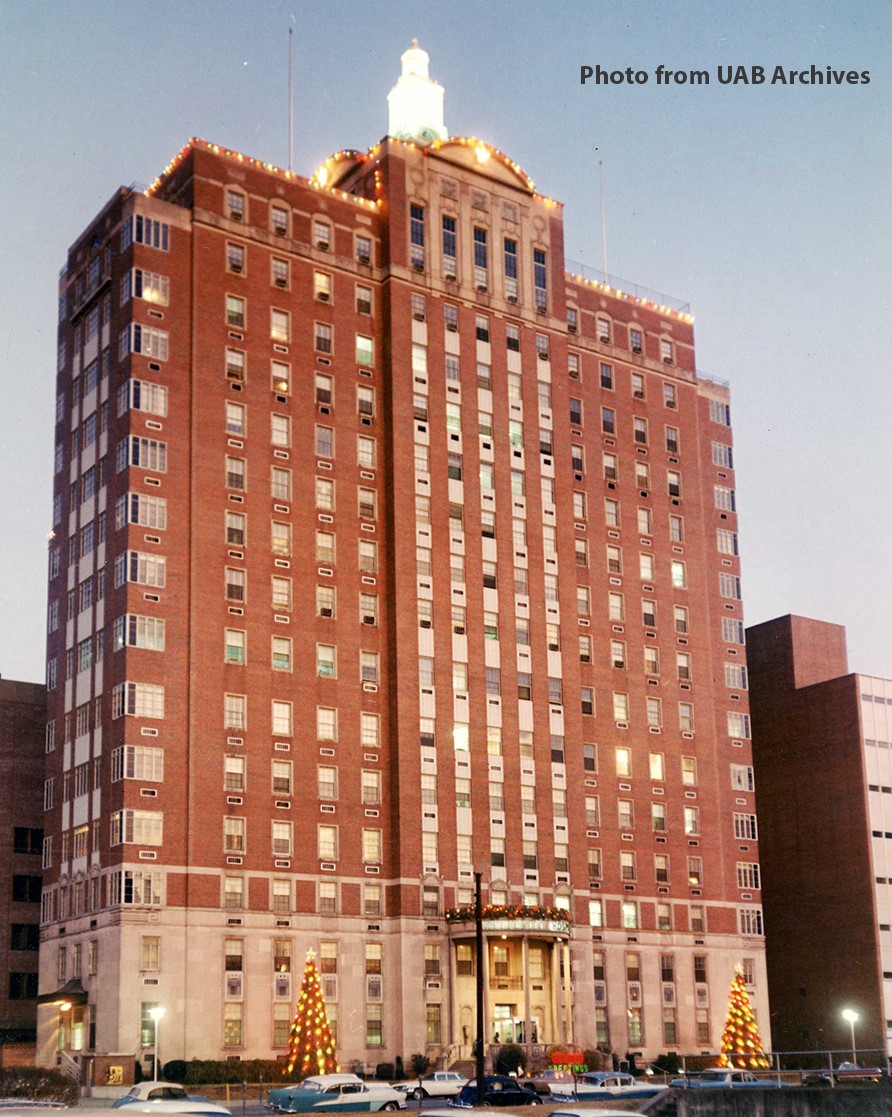
University Hospital decorated for the holiday season, 1965
Image ID: P16.1.1, #0509
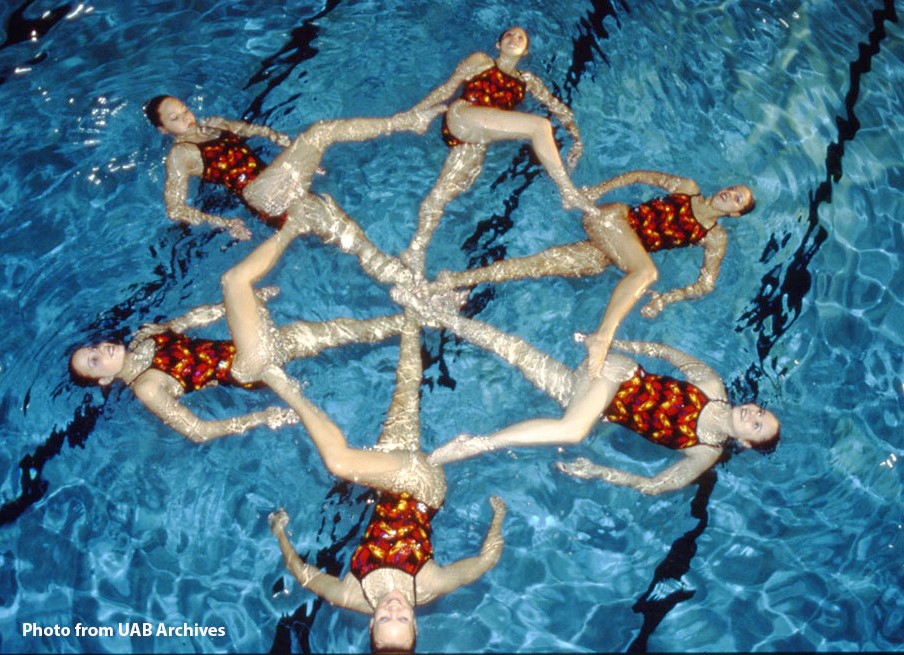
Women’s Synchronized Swimming team, circa 2000
Image ID: A2007-11P
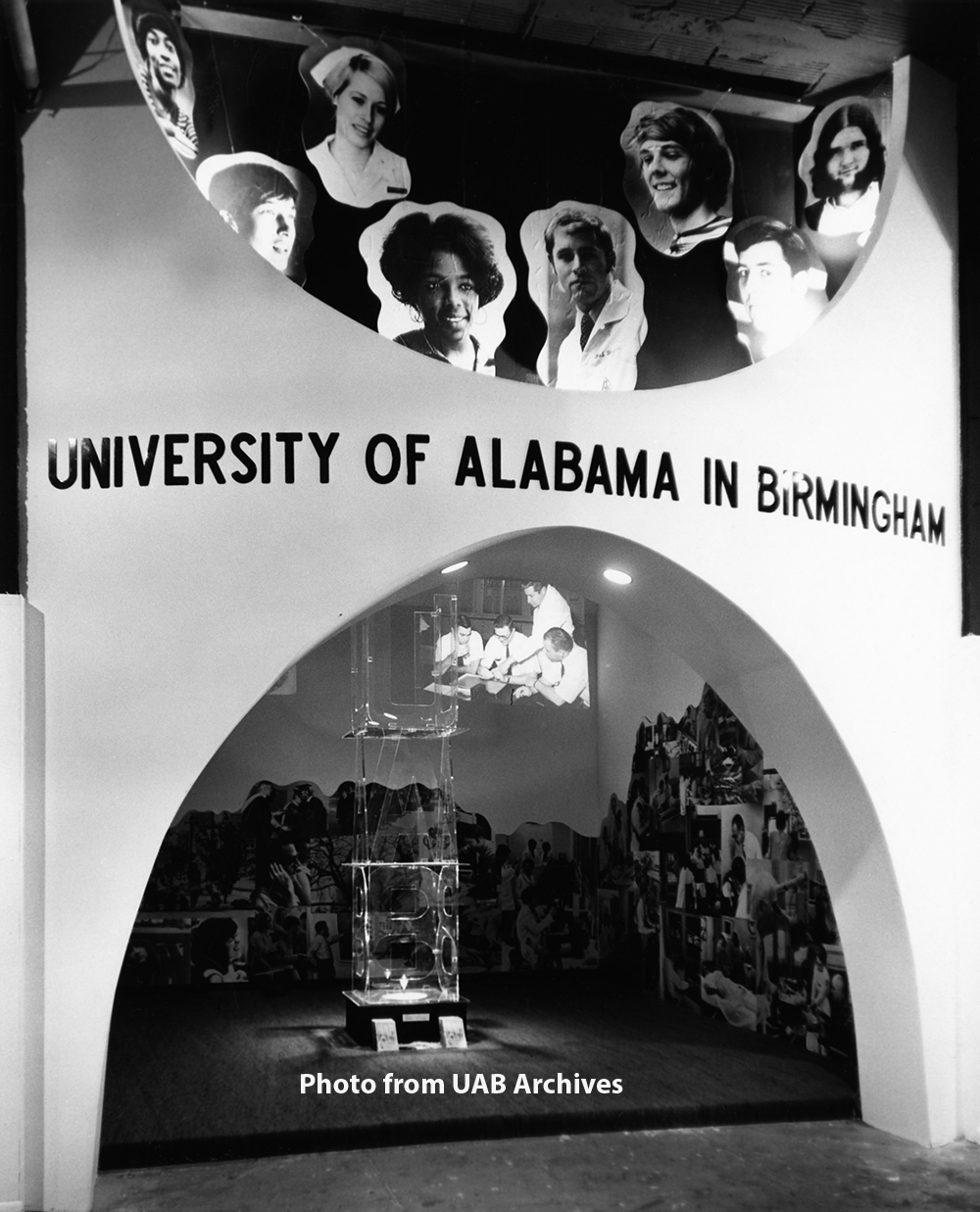
UAB Exhibit at the Alabama State Fair, 1970
The Alabama State Fair was held annually at the state fairground in the Central Park neighborhood in western Birmingham. The old fairground site is currently the location of the Birmingham CrossPlex, the indoor home facility for UAB Blazer track and field.
Image ID: P7.2.7, #0860
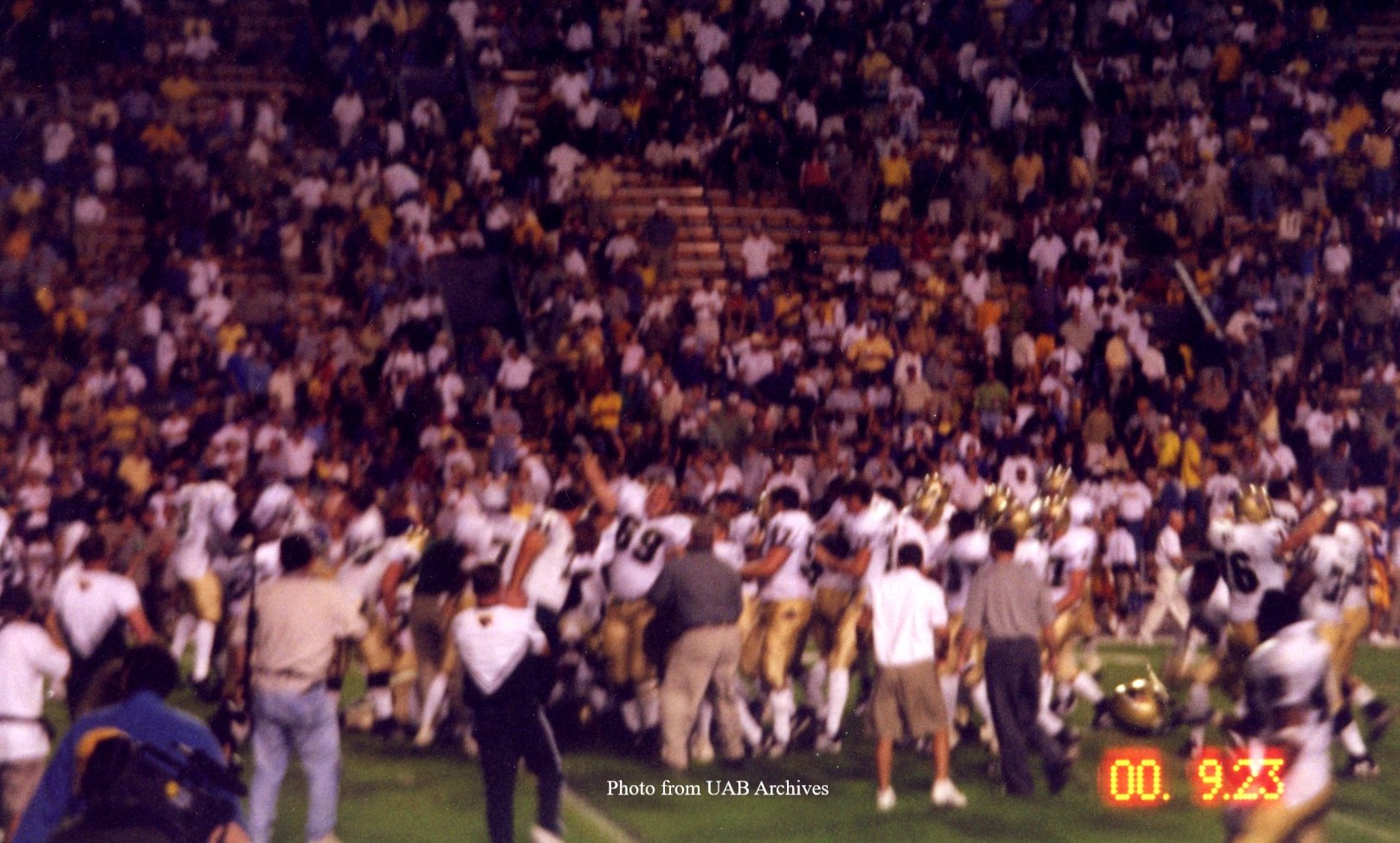
UAB Blazers celebrate victory over the LSU Tigers, 2000
On September 23, 2000, the UAB Blazers shocked the LSU Tigers by defeating the Tigers 13-10 in their homecoming game in Baton Rouge. The Blazers, who never trailed during the game, won on a last-second field goal by Rhett Gallego; it was UAB’s first ever win over a team from the Southeastern Conference (SEC). The Blazers ended the 2000 season with an overall record of 7-4.
The UAB Blazers began this unprecedented 2020 football season on Thursday, September 3, as one of the nation’s first two FBS games. UAB defeated Central Arkansas 45-35 in a game at Legion Field before 12,000 fans. Go Blazers!!
Image ID: A2018-06P
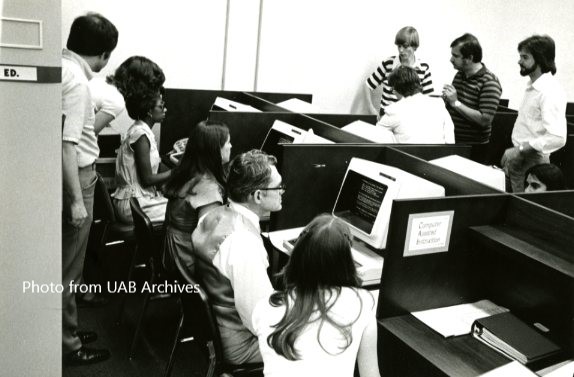
Computer Assisted Instruction at UAB, 1978
Image ID: P7.4.1, #0653
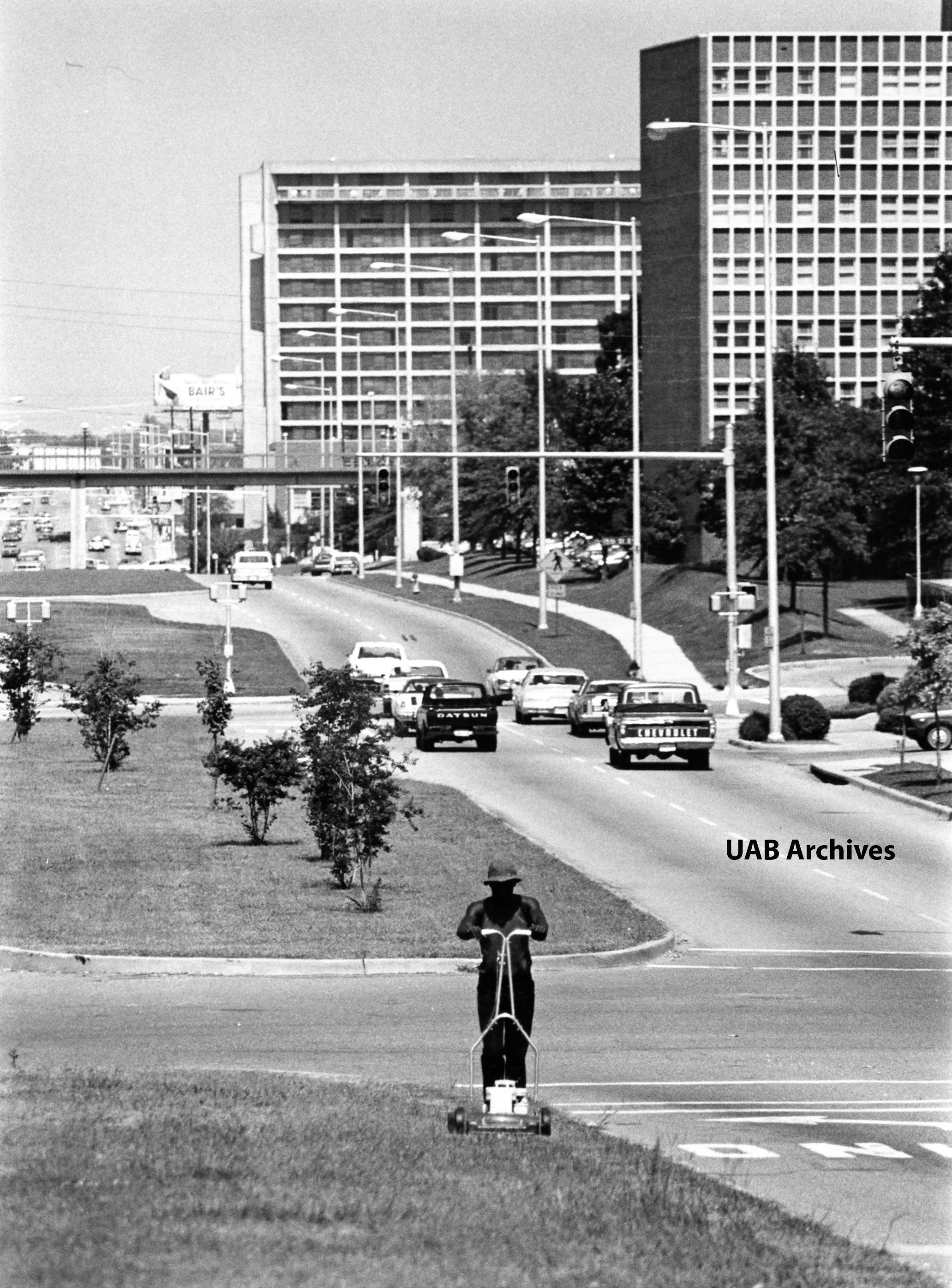
Mowing the median along Eighth Avenue South, 1979
Image ID: P7.3.1, #0220
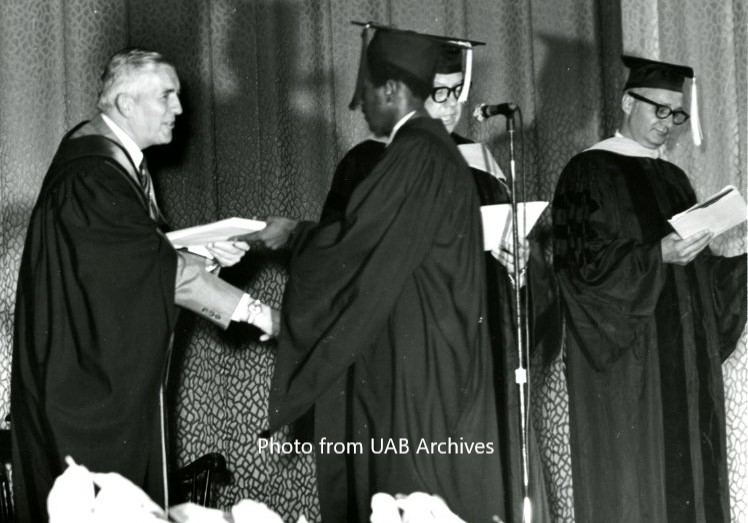
UAB’s First Commencement Ceremony, June 7, 1970
Image ID: P7.2.11, #0022
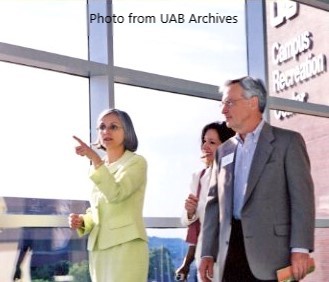
UAB Campus Recreation Center opens, May 2005
Image ID: A2018-13P
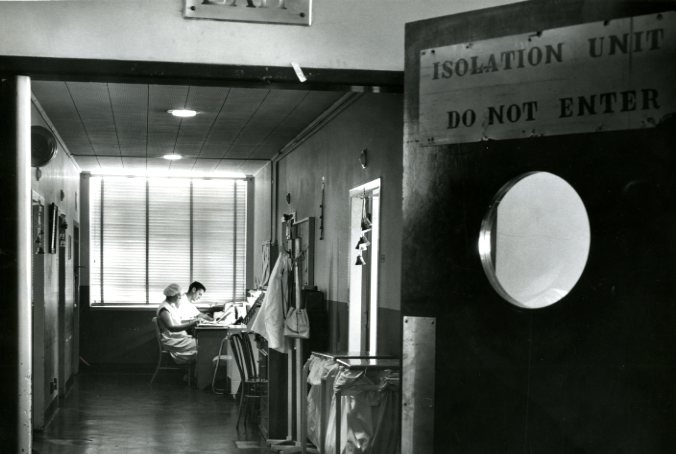
University Hospital's Isolation Unit, 1960
Image ID: P16.1.12, #4433
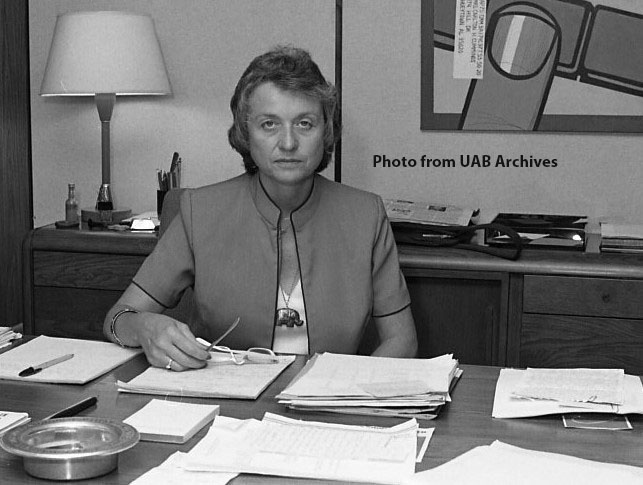
Dean Milly Cowles at her desk, 1980
Image ID: P23.3
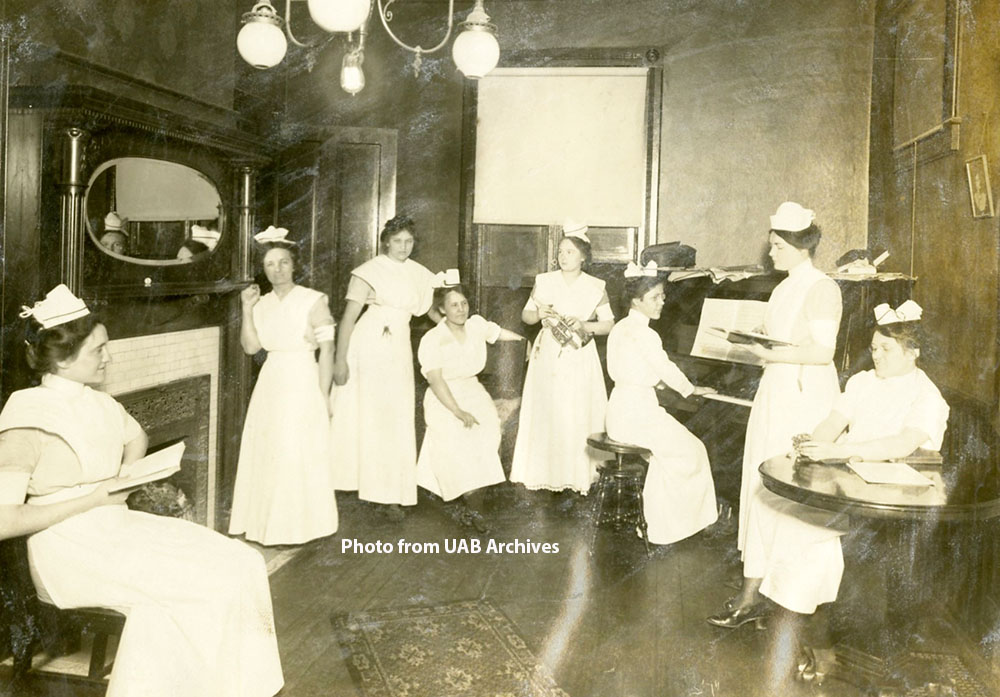
Nursing students enjoy some off time in Hillman Hospital’s nursing residence, circa 1910
Image ID: MC51, #125h
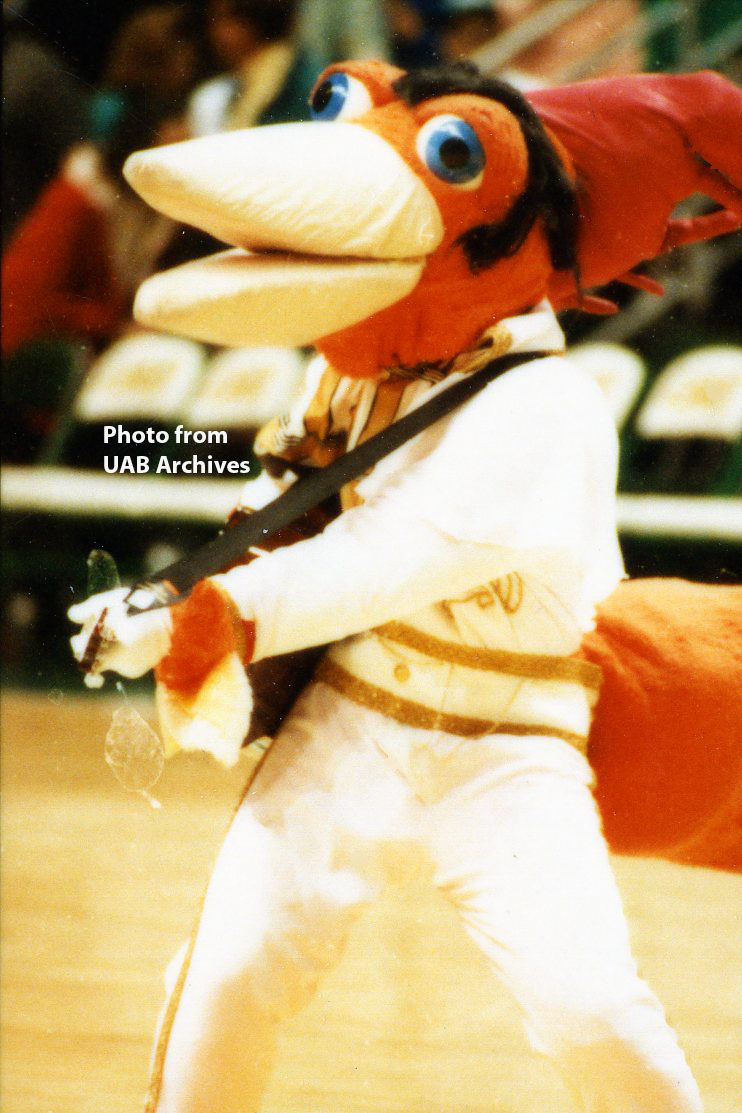
All shook up at a basketball game, January 1992
Image ID: P6.1, #1525a
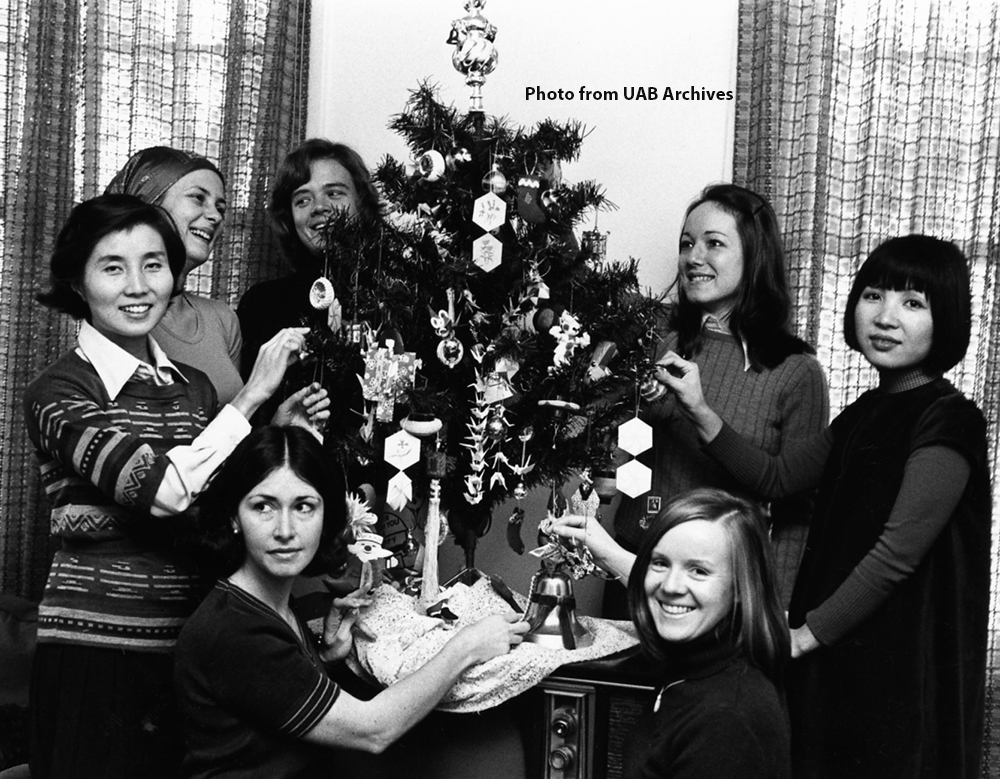
Tree decorating at the Friendship House, December 1976
Image ID: P7.4.1, #0086
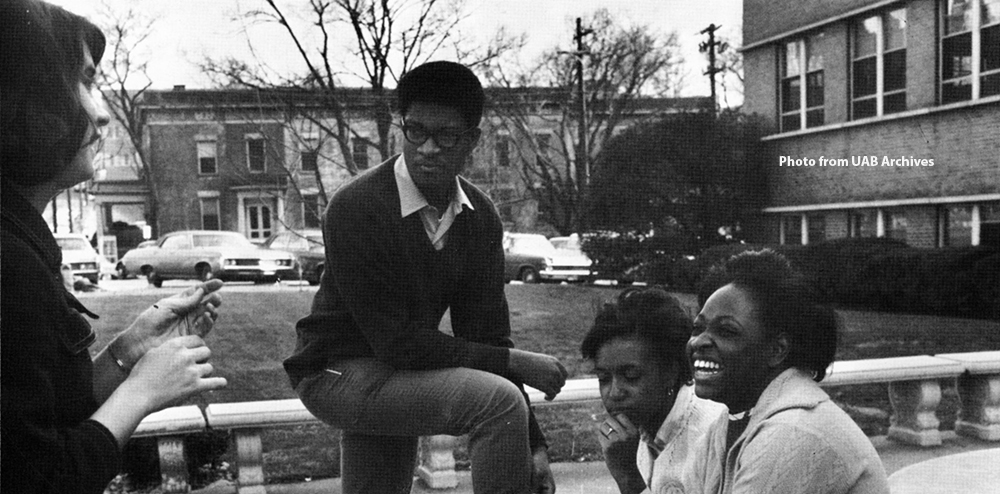
Students in front of Tidwell Hall, 1969
Image ID: Annual Report yearbook
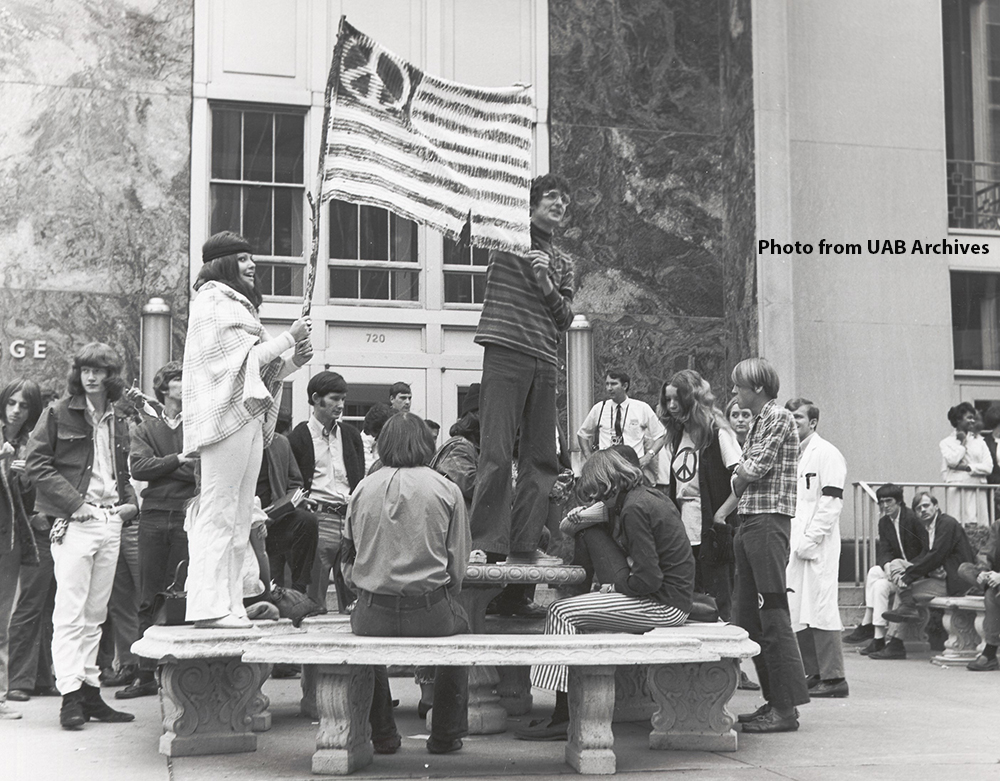
Vietnam Moratorium Protest at UAB, October 15, 1969
Image ID: P7.2.2, #2073
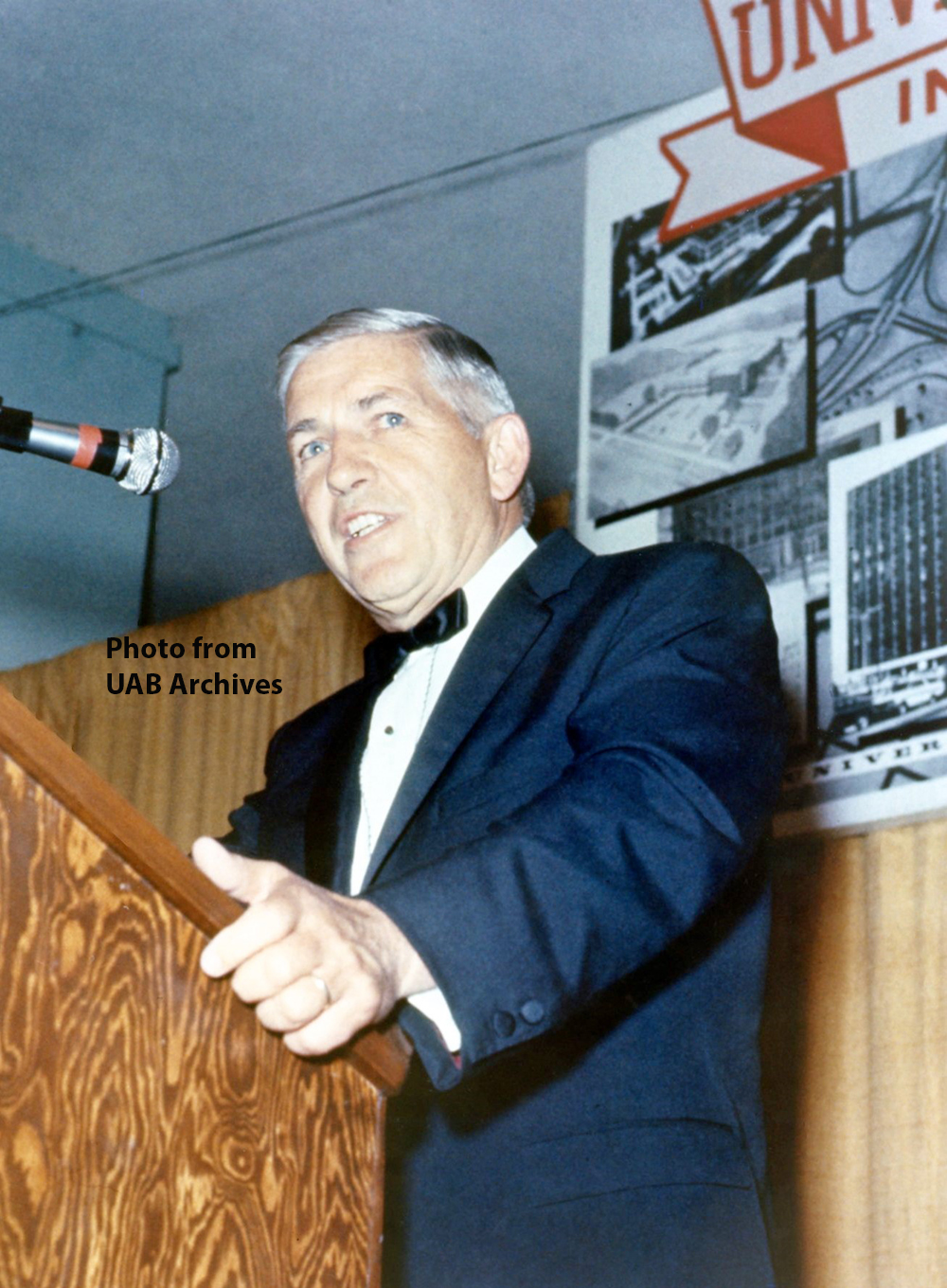
President Joseph F. Volker speaks at dinner held in his honor, September 5, 1969
Image ID: A90-01
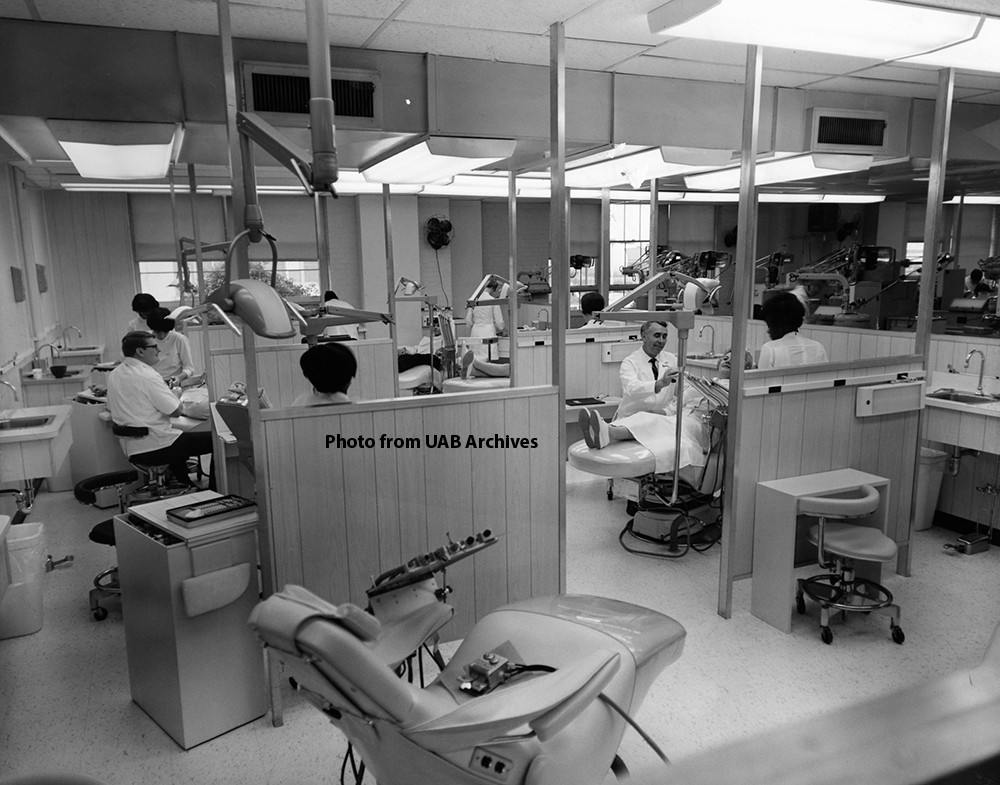
Clinical instruction in the dental clinic, 1969
Image ID: P7.2.7, #0271a
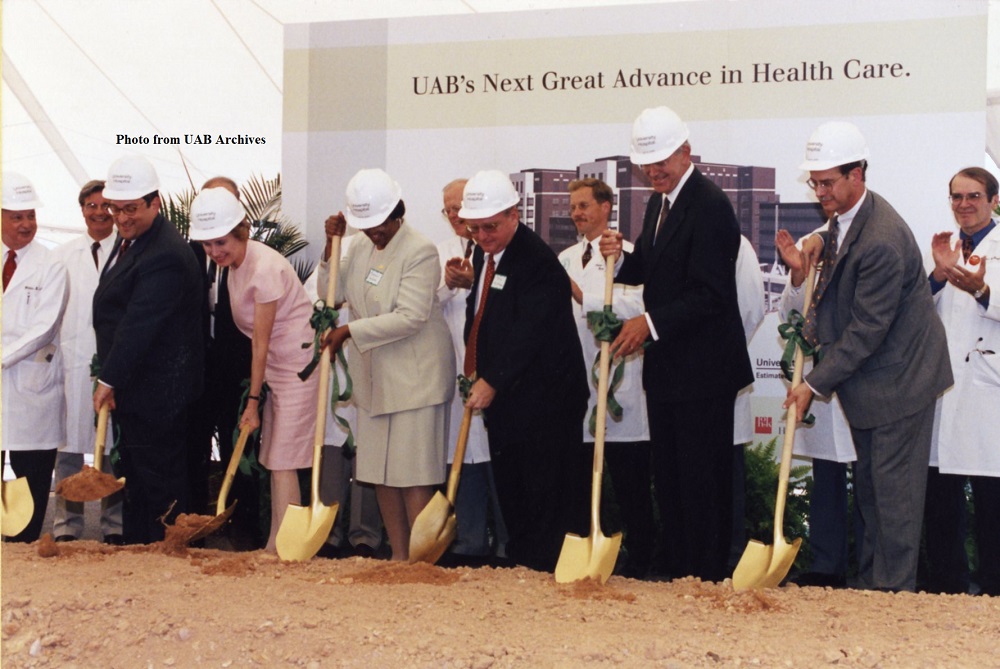
Groundbreaking ceremony for UAB's next advance in health care, July 14, 2000
Image ID: A2018-13P
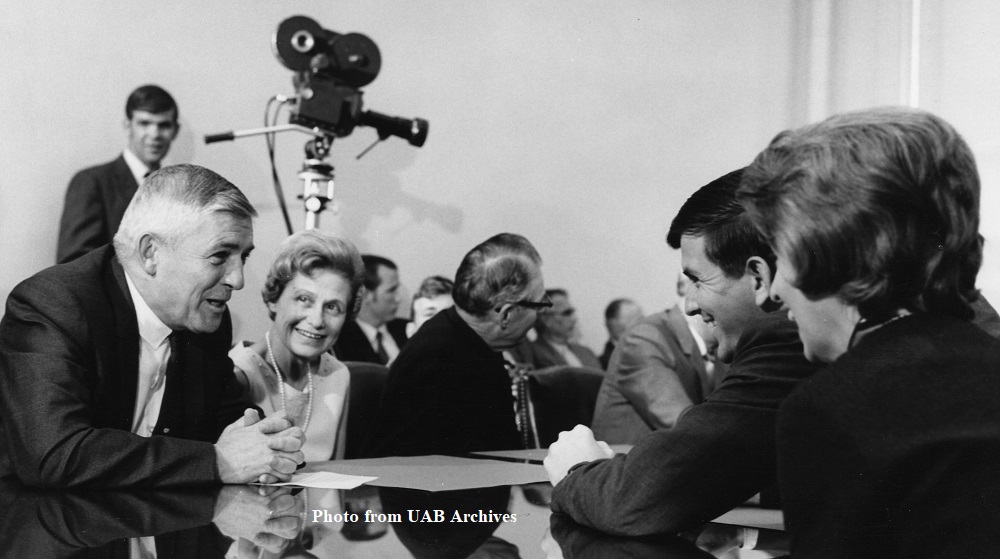
Joseph and Juanita Volker chat with David and Mary Mathews, June 16, 1969
At a press conference in Montgomery, Governor Albert P. Brewer and members of the Board of Trustees announced a new three-campus University of Alabama System with separate universities located in Tuscaloosa (UA), Huntsville (UAH), and Birmingham (UAB). The Board named F. David Mathews as the new president of the University of Alabama and Joseph F. Volker as president-elect of the new UAB; a search would later be held for the first president of UAH. Dr. Volker officially assumed office as the first president of UAB on September 5, 1969. Dr. and Mrs. Volker (left) and Dr. and Mrs. Mathews (right) chat across the table at the announcement press conference.
Image ID: P1, #0380
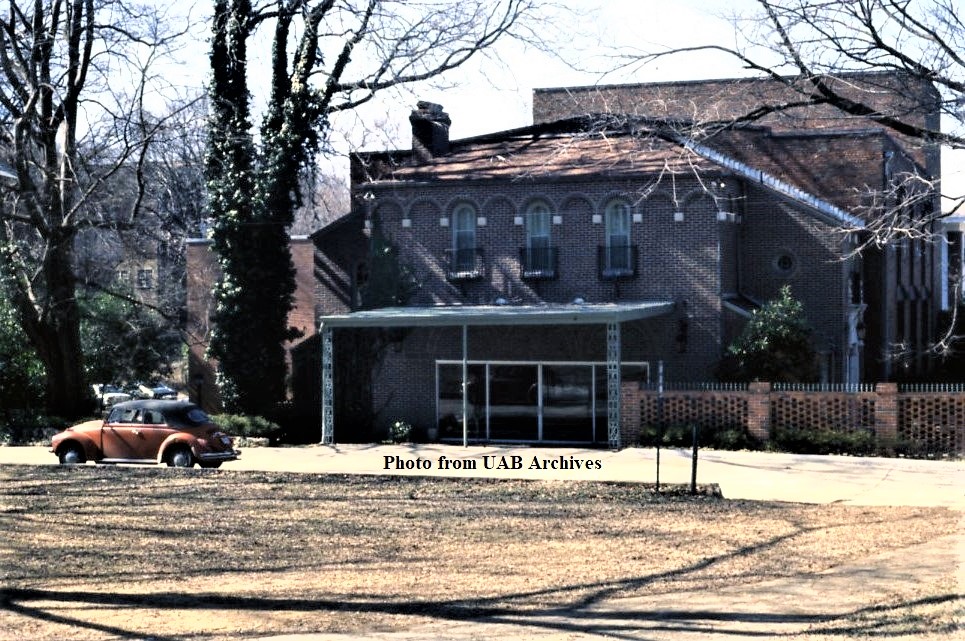
Clark Memorial Theater Building, circa 1990
Prior to the start of the 1998-1999 season, UAB announced that the season would be the final one for its long-running Town and Gown Theater program. Six shows were produced as part of that final season: The Glass Menagerie, Kiss of the Spider Woman, Red Hot & Cole, You Can’t Take it With You, and Cabaret. The production of Cabaret closed on May 16, 1999, ending the 49-year run of Town and Gown Theater and ending the university’s use of the Clark building on Hatcher Place in Caldwell Park. In 2000 the Metropolitan Arts Council acquired the old theater building and a renovated and newly renamed Virginia Samford Theatre was reopened in 2002.
Image ID: P45.2
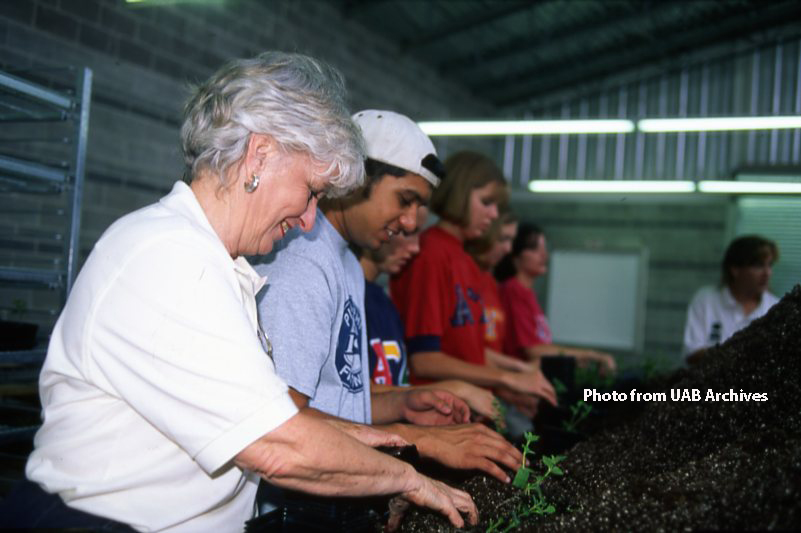
Into the Streets Day, 1999
UAB sponsored the inaugural Into the Streets volunteer event day on Saturday, April 10, 1999. Over 300 students participated in a wide variety of sponsored events, such as planting flowers and trees, painting houses, and picking up litter around the city and along the Cahaba River. Dr. Virginia Gauld, Vice President for Student Affairs (far left), joined students from UAB Greek organizations as they spent time doing some urban farming.
Image ID: P7.3.13
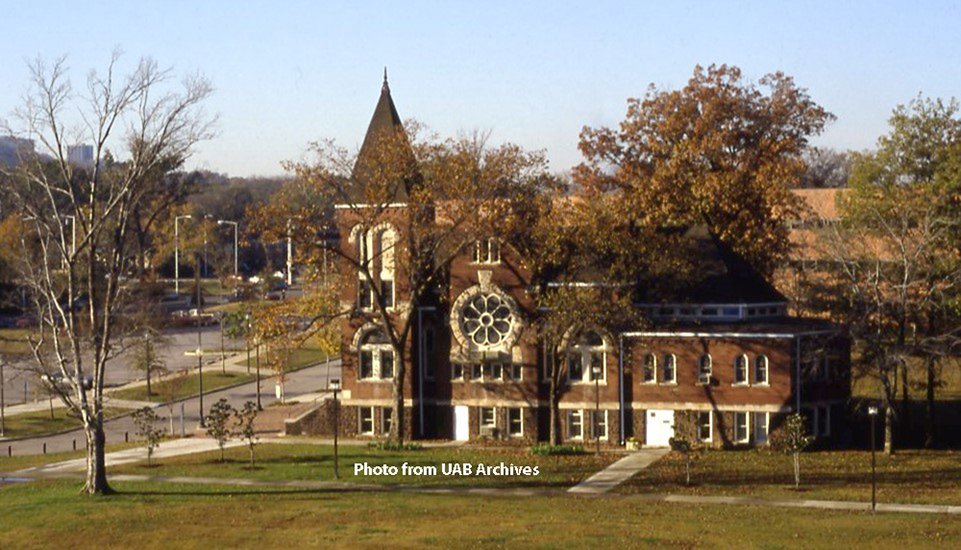
UAB Honors House, circa 1999
The former home of the Second Presbyterian Church was acquired by UAB in 1970 and soon afterward became the home of the UAB-affiliated Alabama Ballet; the building became known as the Ballet House. In 1985 the building was renamed as the Honors House when it became home to UAB's new Honors Program. The old church building was renovated with funding provided by William and Virginia Spencer, and the newly renamed Spencer Honors House reopened on March 18, 2002.
Image ID: P7.3.13
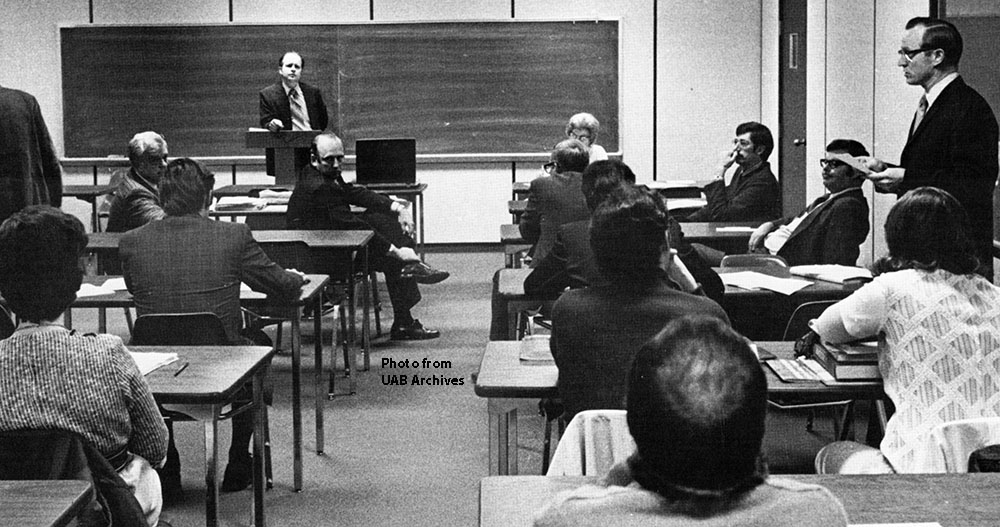
College of General Studies Senate, circa 1971
In January 1970 UAB employees and students approved by campus vote a referendum to create a Senate that would be comprised of faculty, staff, and student representatives. The first meeting of the new College of General Studies Senate was held February 11, 1970. The 39-member Senate included elected faculty, staff, and students and administrators appointed by the dean of the College of General Studies. During the fall term of 1971, the Senate was renamed as the University College Senate following the creation of the new administrative entity University College. In 1980 the Senate was reconstituted as a faculty-only body to serve as an advisory voice for the faculty in the various units within University College. After a multi-year process, in 1995 President J. Claude Bennett approved a campus-wide UAB Faculty Senate and this Senate first met on June 30, 1995.
Image ID: Annual Report yearbook
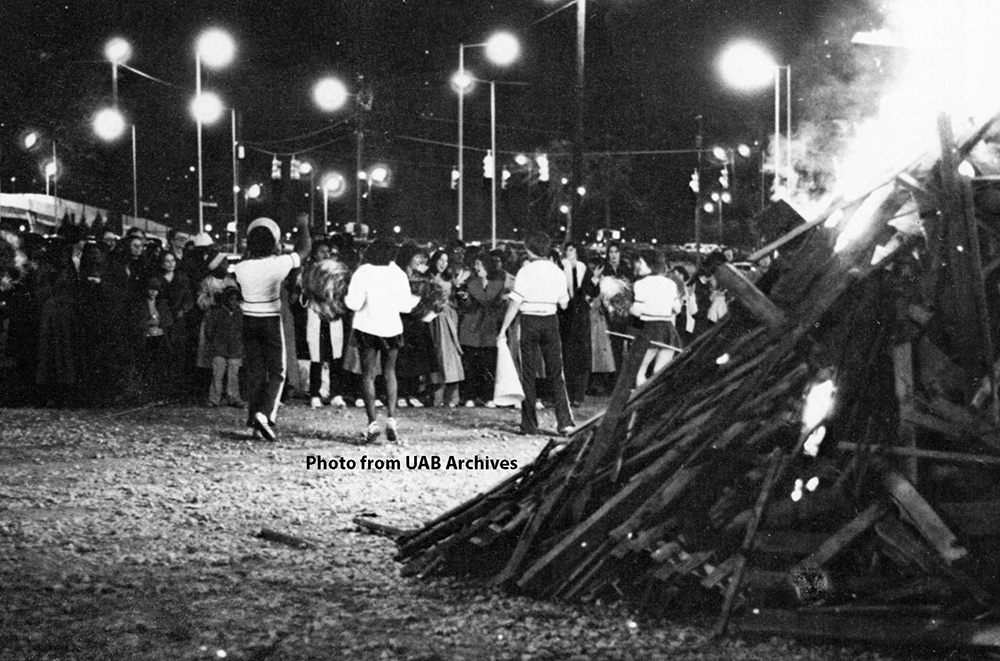
Homecoming Bonfire, 1979
UAB instituted a homecoming celebration to coincide with its new NCAA-level basketball program, which had debuted in the fall of 1978. The festivities in January of 1979 included basketball games for the new men's and women's teams, an on-campus bonfire, and a homecoming dance for students. Homecoming would remain a part of the basketball season until 1994 when the celebration was moved to the fall to coincide with football season.
Image ID: Phoenix yearbook
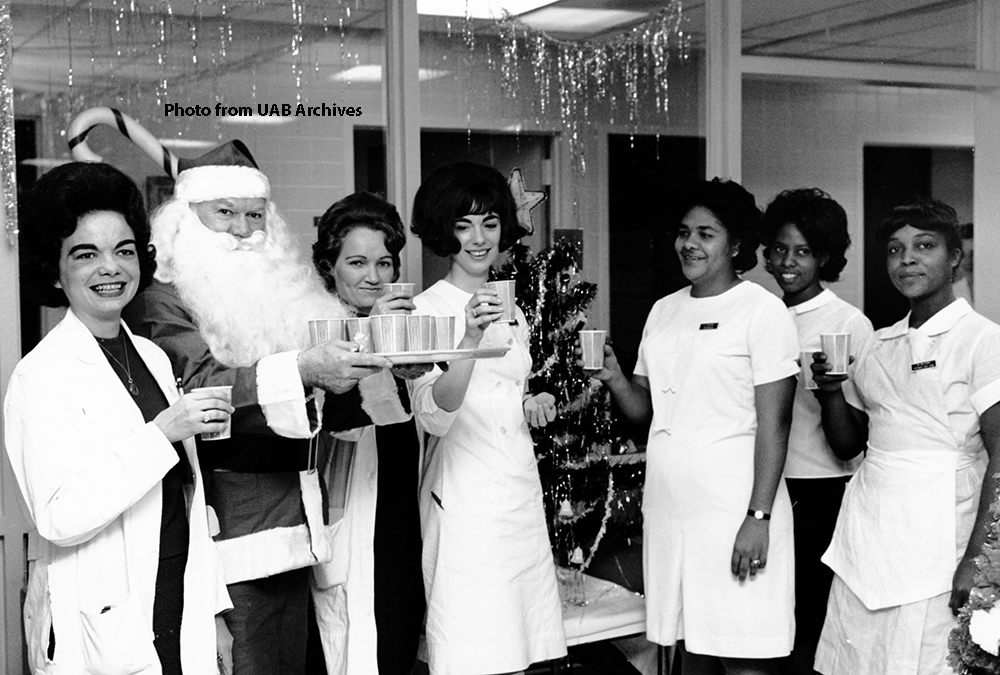
Hospital Staff with Santa Claus, 1967
Santa Claus shares the cheer with staff at work in University Hospital during the holiday season.
Image ID: P16.1.3, #2740
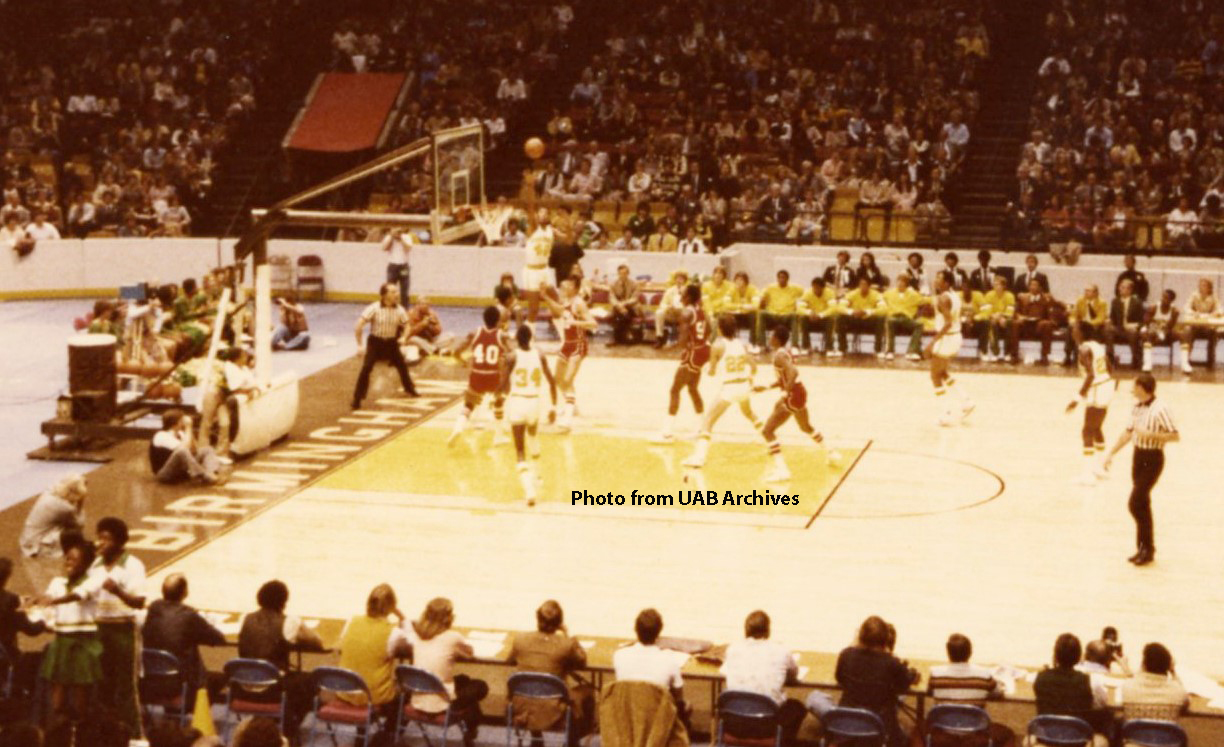
UAB Basketball Game, November 24, 1978
UAB began NCAA-level basketball play on November 24, 1978, with an inaugural game against the University of Nebraska before a crowd of over 14,800 in the arena at the Birmingham-Jefferson Civic Center. Coach Gene Bartow's Blazers lost 64-55. Five days later, Coach Fran Merrell and the Women's Basketball team competed in their first game at the BJCC; the Blazers lost to the University of North Alabama 82-77.
This month we celebrate the 40th anniversary of an intercollegiate athletics program at the University of Alabama at Birmingham. Today, UAB provides eleven sports teams for female students and seven for male students. There are also three spirit and two band programs that support the athletic program and entertain event attendees. Go Blazers!
Image ID: MC67, #0002
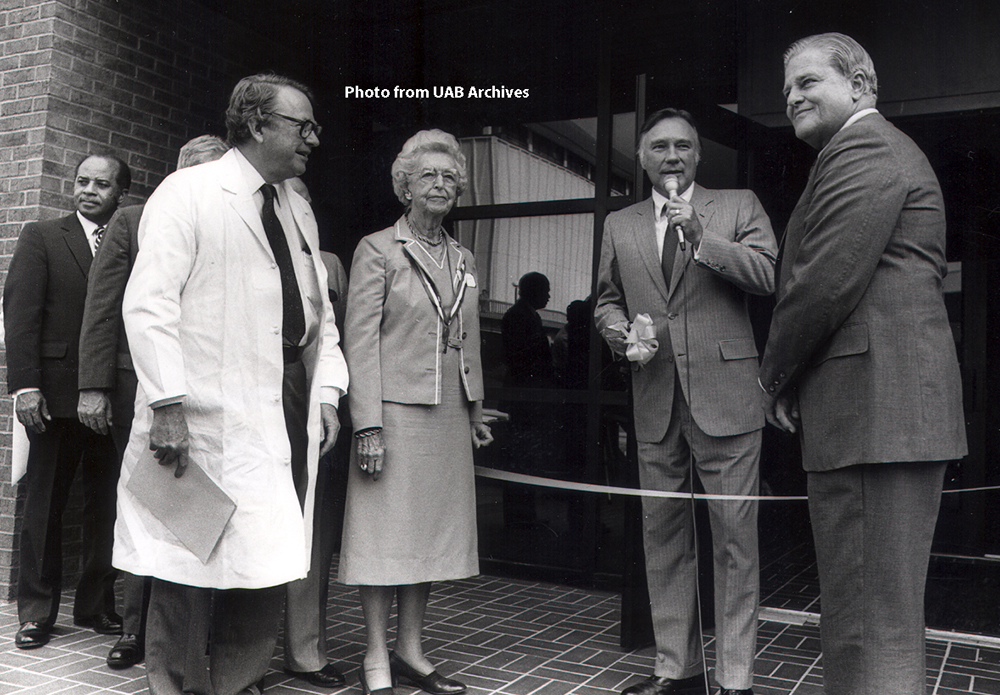
Dedication of the Webb Nutrition Sciences Building, October 18, 1983
The new building was made possible by a donation of Charles B. Webb, Jr., and the Susan Mott Webb Charitable Trust in honor of Webb’s late wife, Susan Mott Webb. At the October 18, 1983, dedication ceremony were (left to right): Dr. Richard Arrington, Jr., Mayor of Birmingham; Dr. Charles E. Butterworth, chair of the Department of Nutrition Sciences; Ruth R. Mott, mother of the late Mrs. Webb; Charles B. Webb, Jr.; and Dr. S. Richardson Hill, Jr., UAB President. The Susan Mott Webb Nutrition Sciences Building housed the nutrition department and provided classrooms and administrative offices for the allied health professions school.
Image ID: P7.4.1, #2525
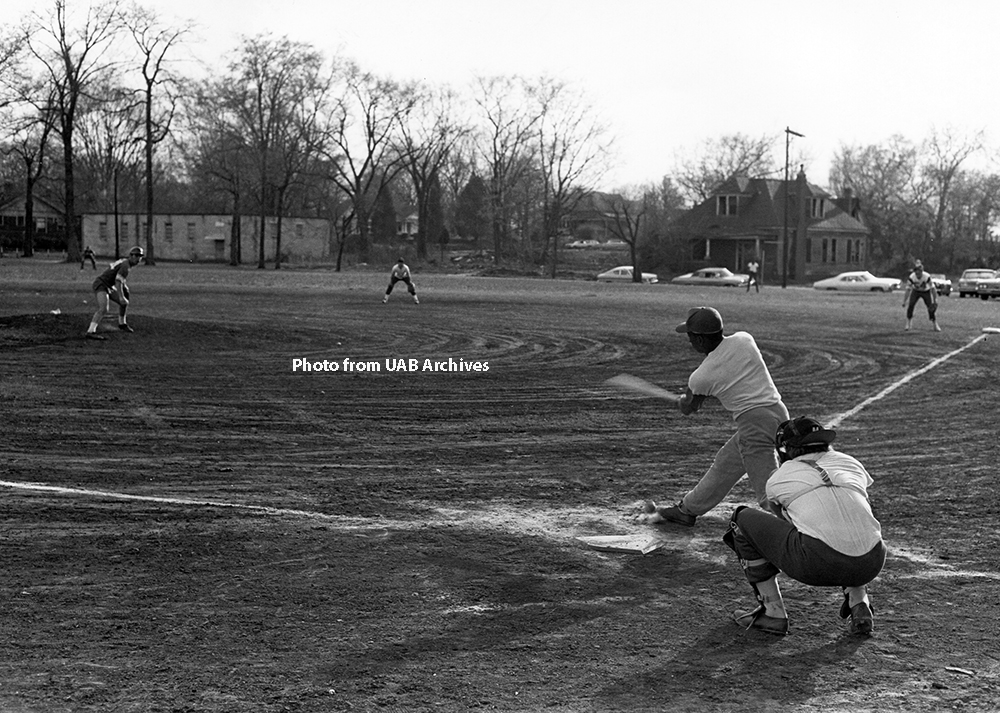
Intramural Game, circa 1980
Intramural sports have long been a part of university history, even when the teams had no campus home. In the early years, intramurals were held at George Ward Park, at Fair Park, and at Jordan Park, a city park adjacent to the western edge of UAB that was eventually incorporated into the campus. Intramural fields were later located on campus at the 600 block of South 12th Street and then on the 800 block of South 11th Street. A new Intramural and Club Sports Field Complex was officially opened on August 28, 2018. This new complex is located at 1101 5th Avenue South and is directly across the street from the Football Operations Center.
Image ID: P7.3.1, #1018
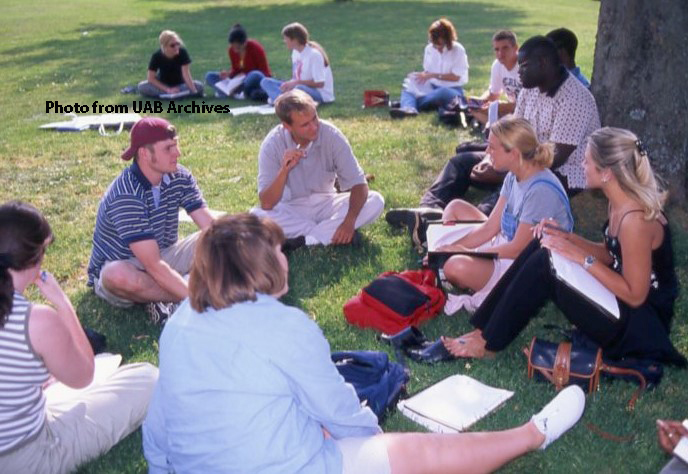
Students on the UAB campus, 2000
Students enjoy a class outside on a summer afternoon, 2000. Total enrollment at UAB in 2000 was 15,921 with 10,331 undergraduate students. As of the fall of 2017, total enrollment at UAB was 20.902 students, a record high for the university, with a 6.18 percent increase in undergraduate students, 10.51 percent increase in graduate students, and 4.36 percent increase in doctoral and professional students. The incoming freshman class of 2017 was also a record high of 2,299.
Image ID: P7.3.13
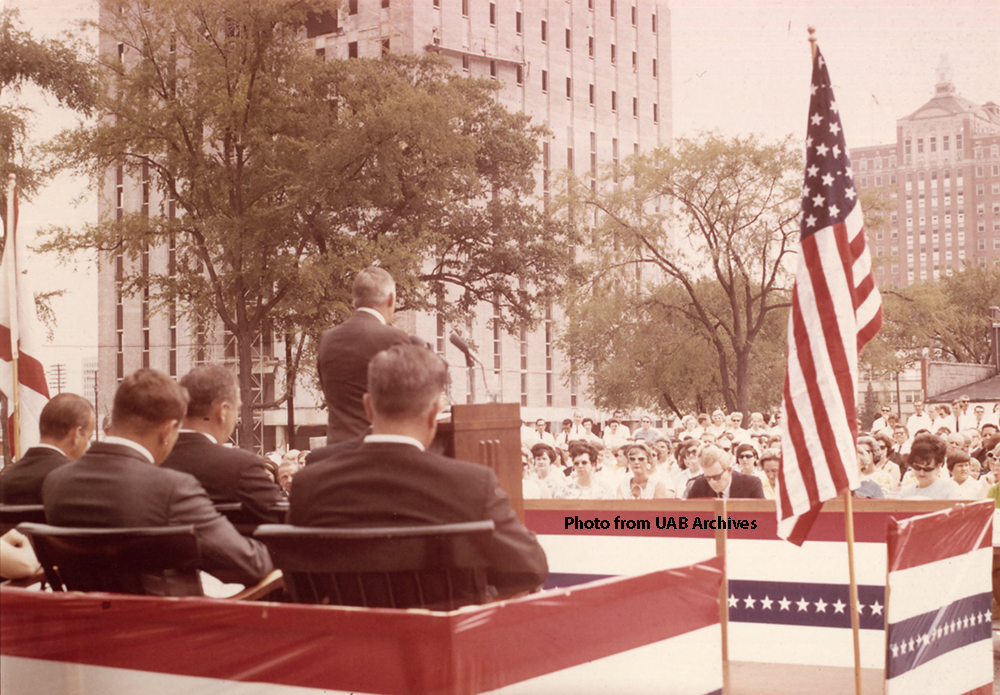
Expansion Groundbreaking Ceremony, July 30, 1968
The groundbreaking ceremony for a major expansion of the university's medical center was held on July 30, 1968. This ceremony heralded the groundbreaking for three new facilities at the growing campus in Birmingham: a new health sciences library (Lister Hill Library), a new basic sciences building (Volker Hall), and a new home for the School of Nursing. Those seated on the platform included the president of the university, the executive vice president, and the deans of dentistry, medicine, and nursing. Looking east from along Seventh Avenue South are, in the background, Jefferson Tower (right) and the construction of the Sparks Center (left).
Image ID: P1, #0283
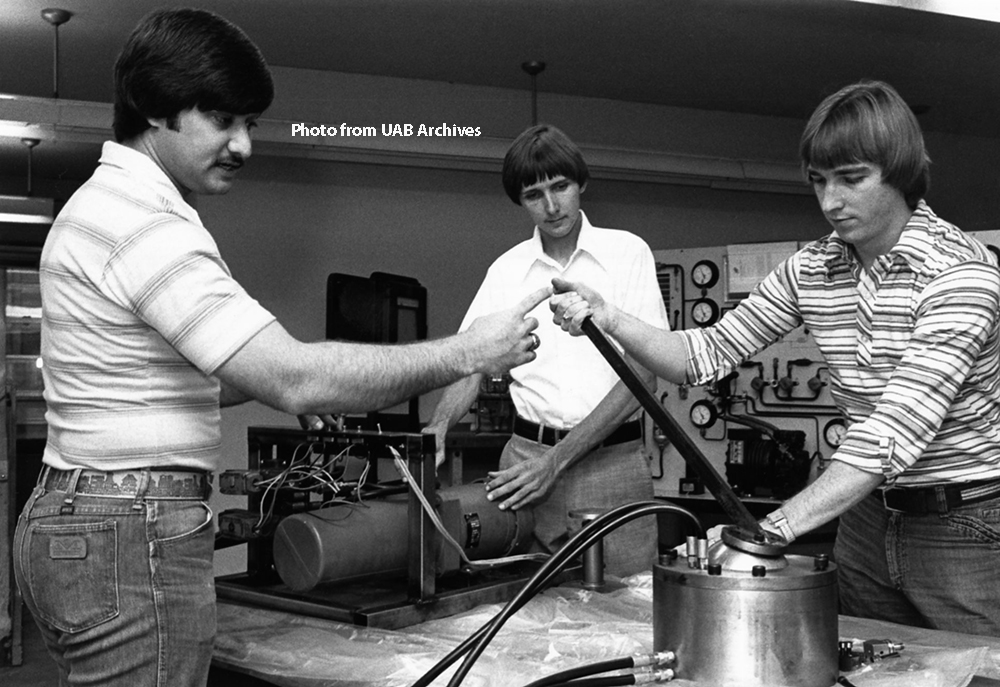
Engineering students assemble a mechanical arm, June 1978.
Engineering students assemble a mechanical arm, June 1978. UAB students work on improving the prototype of the device for the American Society of Mechanical Engineers (ASME) student competition.
Image ID: P7.4.1, #0699
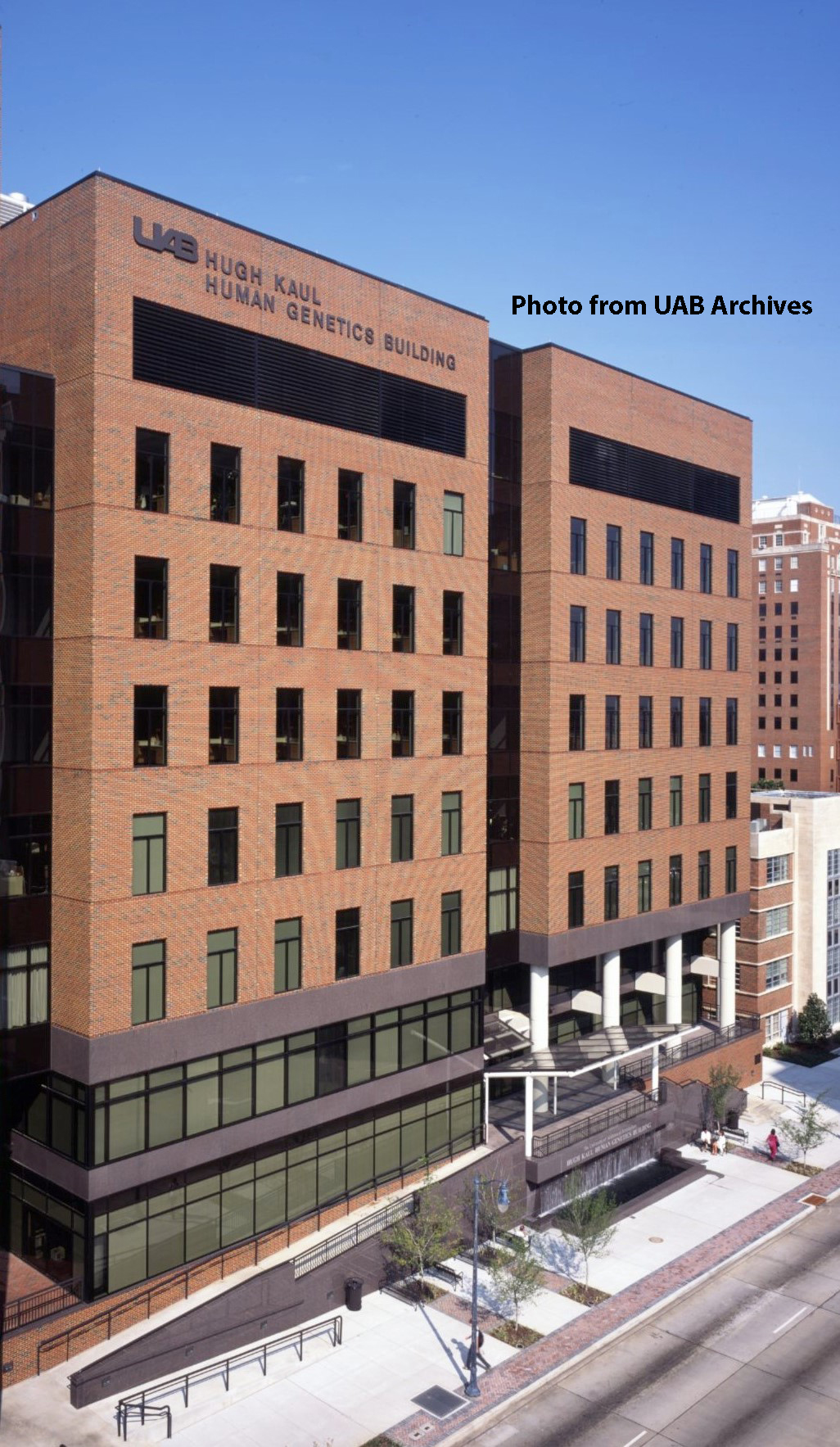
Hugh Kaul Human Genetics Building, 2001
The Kaul Human Genetics Building was constructed on the site of UAB's Tidwell Hall and it was dedicated on May 21, 2001. The new eight-story Kaul Building was home to the genetics department as well as the new Howell and Elizabeth Ann Heflin Center for Human Genetics and the Finley Conference Center. The Finley Conference Center was named in honor of Drs. Wayne H. and Sara C. Finley, long-time UAB faculty who established the first genetics laboratory in the Southeastern United States.
Image ID: P7.3.13
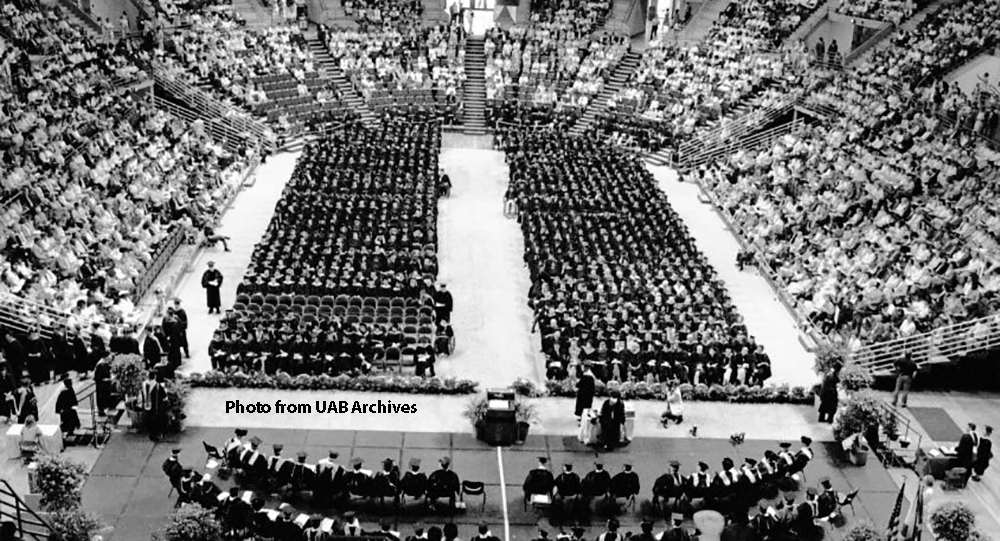
UAB Commencement, 1988
The spring graduation for 1988 was held in the new UAB Arena, the first time a commencement ceremony had been held on the university’s campus. The arena opened in May 1988 and graduation was held on June fifth. UAB awarded degrees to 3,260 students.
ID: P23.3
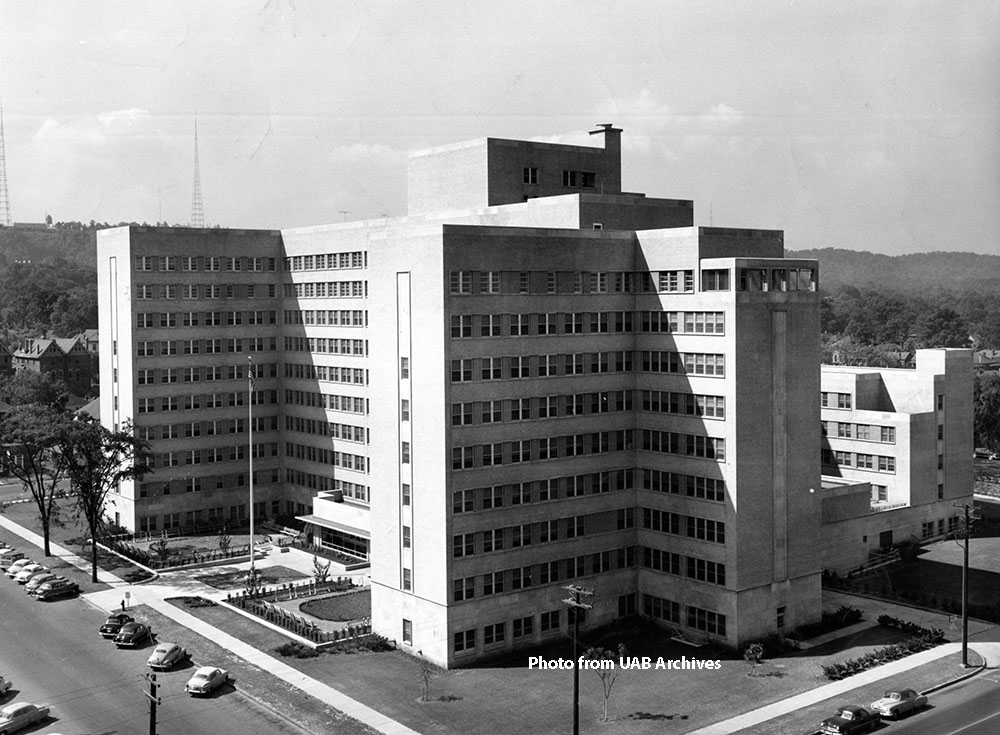
The Veterans Administration Hospital Dedicated, March 22, 1953
ID: MC51 #152a
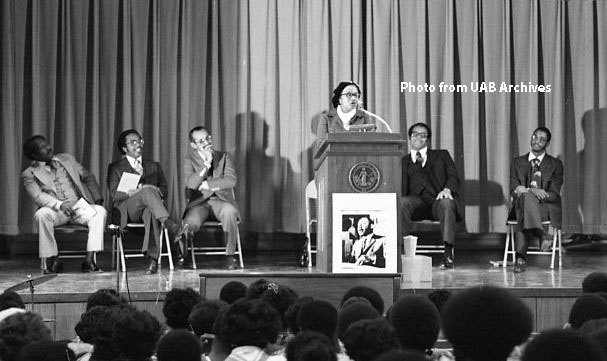
Dr. King Commemoration at UAB, 1978
In a ceremony in the auditorium of the Engineering Building [Cudworth Hall], UAB commemorated the late Rev. Dr. Martin Luther King, Jr. The event was held during the ten-year anniversary of King’s assassination. The keynote speaker, Rev. Wyatt Tee Walker (seated third from left), was the chief-of-staff for Dr. King and the Southern Christian Leadership Conference. Funding for the event was provided by the UAB student government and graduate student associations.
UAB celebrated Black History Week as early as 1975 with a series of lectures, dances, and art shows. Following national trends, UAB changed to a month-long celebration in 1977.
ID: P23.3
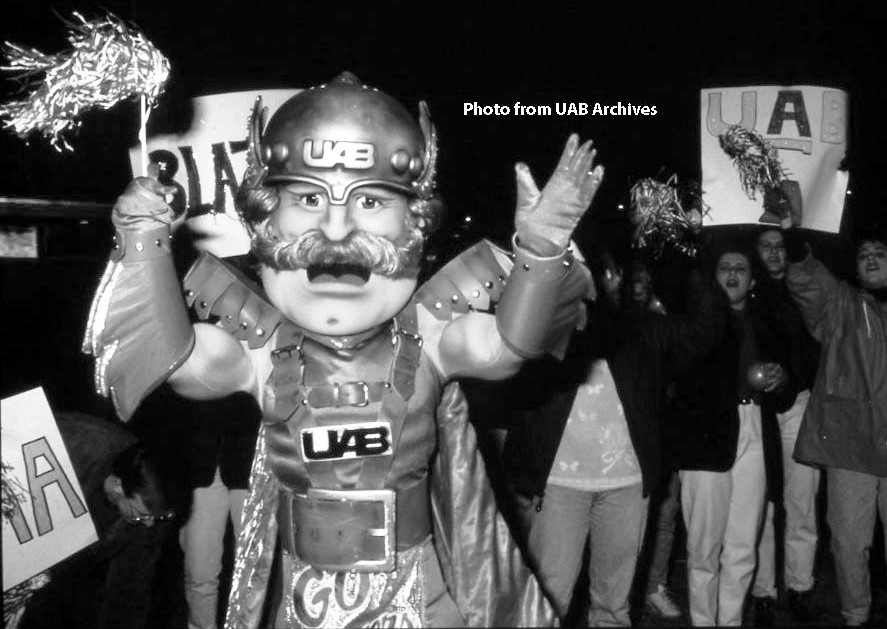
The Blazer mascot, 1993
At a basketball game on January 9, 1993, UAB unveiled a new mascot, the Blazer. The mascot scared children at the basketball games, and many segments of the university community objected to the sword carrying militant Viking-like warrior. The Blazer was withdrawn before the start of the fall football season. It would be two years before a new mascot, Blaze the Dragon, would be unveiled.
ID: P7.3.13
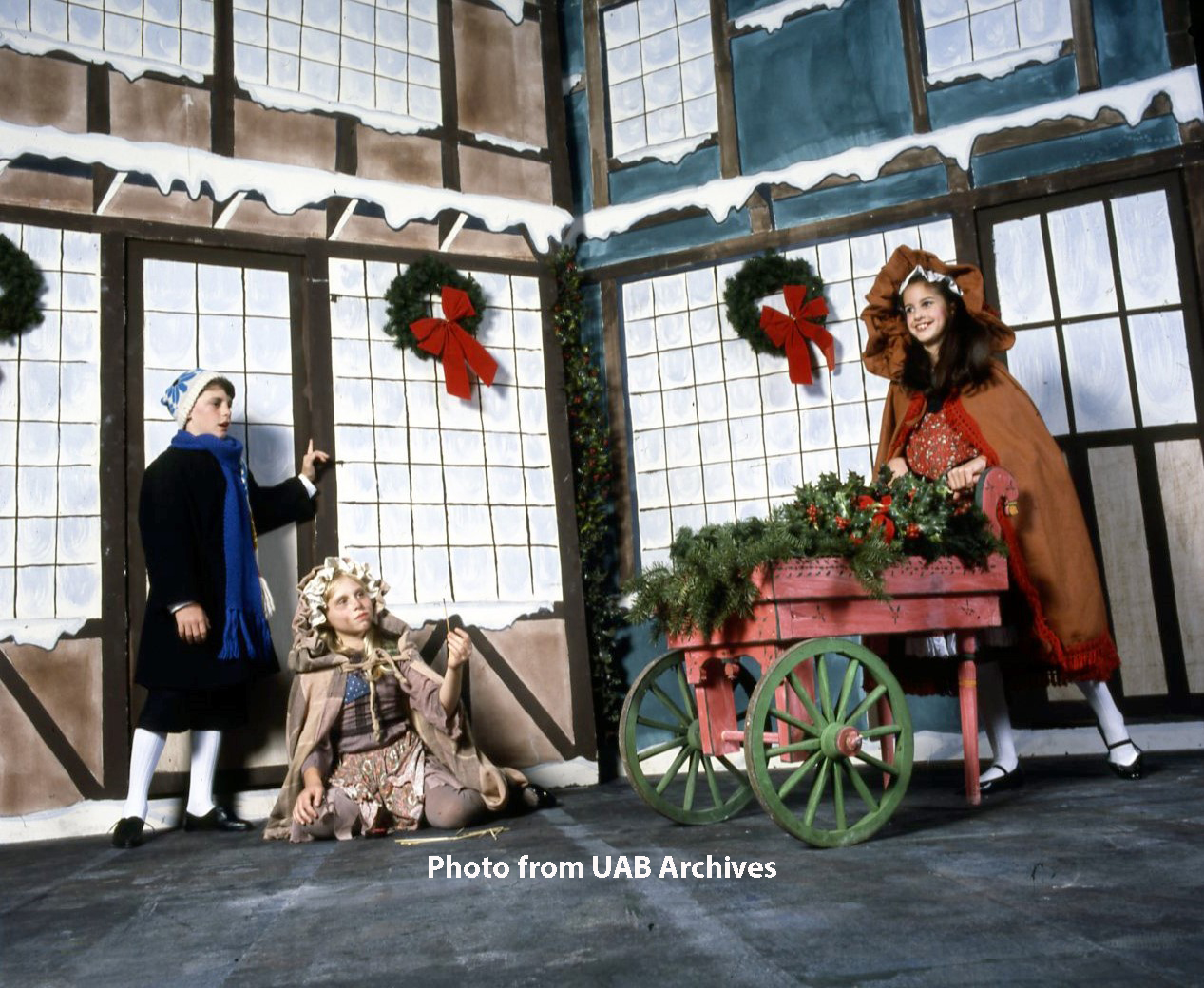
The Poor Little Matchgirl, 1988
The world premiere of The Poor Little Matchgirl was on December 16, 1988, at UAB. The musical by Amos D. Carroll was based on the story by Hans Christian Andersen, and it was produced by UAB Town and Gown Theatre, with James F. Hatcher as producer and director.
ID: P45.2
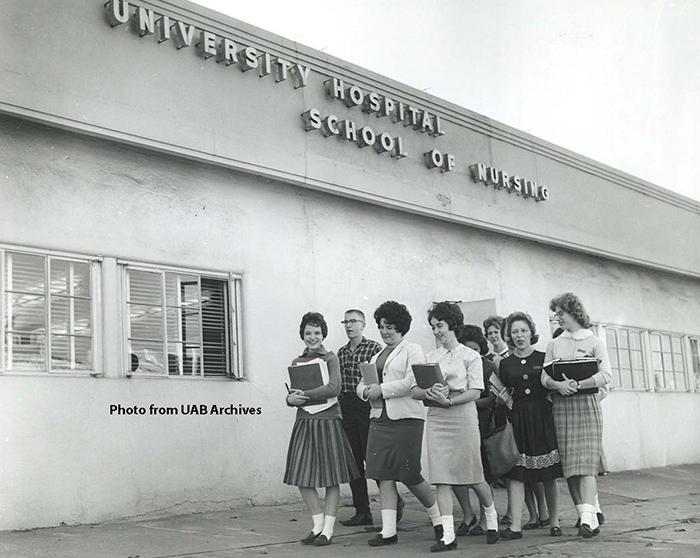
The University Hospital School of Nursing, circa 1958
On November 26, 1958, an open house served as the official dedication of a new home for the nursing school operated by University Hospital. Prior to its acquisition, this building had been home to a beloved-Southside barbecue restaurant, known as Dr. Gus' BBQ. The program's occupancy of the building was short-lived, however, as the building was demolished in 1966 to make way for the Center for Developmental and Learning Disorders [Sparks Center].
Image ID: P16.1.1, #062
